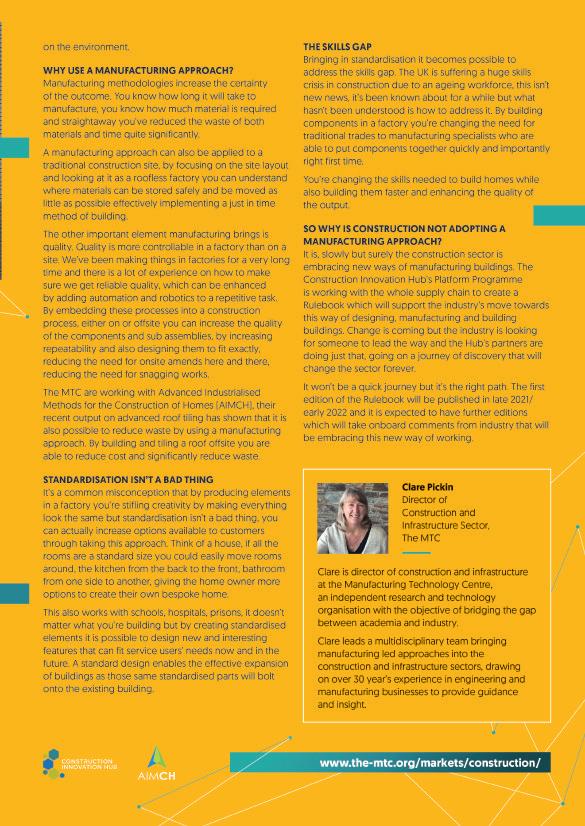














Technology is everywhere and making a huge difference to our daily lives, but do we fully appreciate this?
Take the smartphone. That small metal miracle that we carry everywhere as though it’s welded to our palms. For many, it’s the first thing we pick up in the morning, and the last thing we lay down at night.
Made from a variety of metals and rare earth elements, every smartphone contains around 30 elements, from common-or-garden copper to materials the names of which never cropped up in my chemistry lessons such as Neodymium, Praseodymium and Dysprosium. No? me neither.
By understanding their capabilities, scientists and technologists have produced equipment which few of us can now do without. In fact, I predict that in the course of time, humans will develop a special skin pouch somewhere on our bodies to put a smartphone so we don’t have to carry it in our back pocket.
And we’ve all become so used to ordering whatever we want off the internet and expecting it to be delivered straight to our doors, or using a smart watch to check our daily steps, messages or blood pressure, it’s easy to forget the brains behind them that developed the sophisticated technology.
Innovations that five years ago seemed incredible (making fuel from used cooking oil, driving electric vehicles, or being driven in autonomous ones, medical technology that can assess our needs and ailments virtually, haptic technology so we don’t have to touch something to enable it – great for helping to reduce virus infections –
handheld machines that can sequence our DNA), all these are now commercially available.
Other technologies, such as being able to harness fusion energy to create sustainable energy, are still admittedly a way off, but perhaps not as far as we used to think.
When you read our 32-page TECH Centre Stage feature (pages 69-97) prepare to be amazed at the inventiveness of those across our region who have dedicated themselves to tech innovation. We salute you all.
In our second major feature, we lay bare the full story of Gloucestershire’s cyber ambitions which could see the county become the UK hub for cyber.
And we talk to three amazing business leaders. Dale Vince, the founder of sustainable energy company Ecotricity, has had a busy few months. With rising gas prices causing the collapse of
some smaller energy businesses, will companies such as Ecotricity and Good Energy – the Chippenham energy supplier it’s trying to buy, be able to pick up the slack?
Small and medium sized businesses have always been the backbone of the UK’s economy. The Hawkins Group in Banbury is no exception. Mike Hawkins has taken his dad’s industrial roofing company and grown it in to a business with contracts across the UK and around the world. What’s his secret? Putting people, not profit first – and investing in technology.
Then there’s the amazing Carmen Watson. chair of one of the UK’s most successful recruitment companies, Pertemps. With recruitment currently at an all-time high, this woman shares Mike’s people-first philosophy – with the same winning outcome for Pertemps.

No-one reports on the region’s business like we do. Enjoy be inspired.
Nicky Godding Editor-in-Chief and Co-Publisher Kirsty Muir Commercial Director and Co-Publisher
Is technology so integral to our daily lives that we are in danger of taking it for granted? I did begin to wonder when I was researching our major feature in this issue, TECH Centre Stage









Gloucester Rugby is making a longawaited multi-million-pound investment in the city, by building a new training facility – and players will have no excuse for not being on time as it’s right next door to its Kingsholm Stadium.
The facility will include a gym, rehabilitation centre and dedicated recovery gym, as well as an indoor high performance training pitch.
The substantial investment also includes an upgrade of the existing pitch at Kingsholm with artificial turf.
George Skivington, Gloucester Rugby Head Coach, said: “On Gloucester soil and walking distance from the stadium, the development of this state-of-the-art facility will fortify Kingsholm as a centre of excellence and double down on our commitment to developing home-grown talent.
“We’re also excited about the investment in the synthetic pitch at Kingsholm, which will provide a consistent playing surface in all conditions – something the whole team are really keen for. It also means that we can host multiple matches in one weekend, allowing us to welcome more academy and women’s matches.”
Supplied by Bristol-based sports surface construction company, Verde Recreo, the new pitch has the full approval of Premiership Rugby and World Rugby.
Gloucester Rugby has also announced shelving, racking and storage company BiGDUG as its new main club partner. The racking company, which has its headquarters in the city, has taken over from long-time sponsor Mitsubishi Motors which had been the club’s major sponsor for more than five years.

Cazoo, already the UK’s leading online car retailer after launching in 2018, has paid £70 million for SMH Fleet Solutions, one of the UK’s leading vehicle preparation, logistics and storage businesses.
Cazoo, which enjoyed an $8 billion float on the New York Stock exchange in August, said the deal will provide it with one of the most extensive portfolios of vehicle preparation sites and production capabilities in the UK. Once fully integrated, Cazoo will be able to recondition and deliver hundreds of thousands of cars a year and store tens of thousands of cars.
Established in 2003, SMH has a team of around 500 staff processing more than 70,000 vehicle refurbishments annually from six sites including in Gloucester.
SMH also carries out more than 150,000 vehicle movements per year with a team of 300 logistics specialists as well as operating an online wholesale platform for used cars.
“On Gloucester soil and walking distance from the stadium, the development of this state-of-the-art facility will fortify Kingsholm as a centre of excellenceCGI of new playing facilities
Bristol-based Open Bionics has launched its first clinic in the UK to deliver 3D printed bionic arms for amputees.

With the help of an Innovate UK grant, Open Bionics has been able to switch from being a manufacturer of bionic limbs to a clinical provider.
The new clinic produces the Hero Arm, the company’s life-changing product for individuals with below-elbow limb differences. Since the clinic launch, the company has experienced an influx of patients travelling from all around the UK.

One of the first patients to receive medical care at the clinic was Caroline Coster. A Covid-19 survivor, Caroline also suffered from viral sepsis as a result of catching the virus, requiring her to undergo a quadruple amputation.
Caroline said: “The first time I picked up a ball with my Hero Arm and I held it and dropped it, it felt like having a superpower.
“Having the technical and clinical expertise as part of the prosthesis fitting process was really incredible as I was able to see how the Hero Arm could be customised to meet my personal needs.”
Open Bionics co-founder Joel Gibbard, said: “While Covid-19 forced our business and community into uncharted territory, we’ve always listened to the needs of our customers. The idea to serve customers directly came from
our community who wanted technical information about the product included as part of their clinical experience.”
Simon Edmonds, Deputy Executive Chair and Chief Business Officer, Innovate UK said: “During the pandemic innovation in Britain did not stop. Nowhere demonstrates this more than at Open Bionics. Not only are Open Bionics transforming lives, they are also creating new jobs and driving economic growth.”
More than three million households have adopted a pet since March last year, according to the Pet Food Manufacturers Association, with more than a third of owners aged 24-35.
There are now 34 million pets in the UK including 12 million cats and 12 million dogs, more than three million small mammals such as guinea pigs and hamsters and a further million birds and more than 1.5 million reptiles.

However, this staggering increase in pet ownership is worrying the British Veterinary Association, which is asking people to think long and hard before taking on a new pet as veterinary practices across the country struggle with staff shortages and high demand for services.
In the meantime, it’s a boom time for veterinary services.
Vet’s Klinic, the Swindon-based veterinary practice, has secured £4 million of growth capital investment from investor Mobeus.
Vet’s Klinic says it offers a unique experience for pets and pet owners, with a glass-fronted treatment area, allowing owners to see the vets at work, a smart booking system, real-time video and photo updates to pets’ medical records, and a big team of veterinary experts.
With the growing demand for its services during the pandemic, Vet’s Klinic will use the funding to roll out a further four “super klinics” along the M4 corridor.
Since opening in 2012, it has become a “Super Klinic”; the largest single site, first opinion practice in Swindon.
Laura Shears, Vet’s Klinic managing director, said: “With Mobeus’s partnership, we are really excited to bring our veterinary services, technology and transparent approach to a much wider group of pets and their owners.”
Sensyne the Oxford-based ethical Clinical AI company is to partner with Great Ormond Street Hospital for Children (GOSH) to develop new treatments for childhood illnesses through the ethical application of clinical artificial intelligence research on anonymised patient data.
The agreement marks the launch of a wider initiative by Sensyne to create a global data collaborative using ethical AI to find new and better ways to treat rare and complex childhood diseases
GOSH will receive equity in Sensyne Health plc, research funding and a share of revenues.
This strategic research agreement is Sensyne’s first to focus on improving care and accelerating the development of medicines specifically for children.
Farming seaweed and growing algae from the by-products of brewing beer are among 24 projects awarded a total of £4 million government funding to boost biomass production.
Green Fuels Research, based at Berkeley in Gloucestershire, has received more than £190,000 for a project that will allow microscopic algae to be produced
for biomass using waste water from breweries and dairy industries. The company is working with Wadworth Brewery in Wiltshire.
Cirencester-based White Horse Energy is applying mobile pelletiser technology to energy crops, opening up a significant new source of pellets for the UK market, currently the world’s largest.
Gloucester-based Hej Harvester has developed equipment, which is patent pending, to replace energyintensive existing hedge cutters, which discard hedge cuttings in the field or on roads to rot, and enable the cutting of hedge growth into uniform size pieces of biomass, ready for on-farm burning or to be sold as a commodity to biomass users.

Government ministers probably visit the UK’s top intelligence organisation in Cheltenham regularly without the great British public knowing. But in 2015 the usually camera-shy intelligence organisation allowed the TV cameras in too.

On that cold November day in GCHQ’s iconic doughnut-shaped building, George Osborne had something significant to say.

He wanted to highlight the government’s recognition of the critical role that cyber security increasingly plays in the public and private sectors in keeping us all safe.
During his speech he announced a comprehensive programme of government investment in the country’s cyber infrastructure, including the establishment of two National Cyber Security Centres (NCSCs) reporting to GCHQ. One would be based in London, the other in Cheltenham.

He also revealed plans for a new Institute of Coding – a national consortium of industry and educators to improve the delivery of digital skills education, a cyber skills programme and a £165 million Defence and Cyber Innovation Fund to support start-ups and scale-ups in the sector.
The University of Gloucestershire became one of the Institute’s founding members, which to date have collectively
In 2015, former chancellor of the exchequer George Osborne dropped into GCHQ in Cheltenham. Six years later, the region is seizing the cyber opportunities his visit unleashedGCHQ in Cheltenham
seen more than 900,000 learners improve their digital skills.
While George Osborne was deploying GCHQ as a backdrop to his national cyber announcements, the local town and county councils were waking up to a oncein-a-generation opportunity to boost the local economy.
GCHQ has called Cheltenham home for more than 60 years, and thousands of local people work there. But it had largely kept itself to itself, including keeping local government at arm’s length – not surprisingly given the secret nature of its work.
George Osborne’s announcements changed the game. When the National Cyber Security Centre opened in the town the following year, it was the first part of GCHQ to become more public facing and its cyber accelerator programme, which has since spun-out hundreds of new businesses, was a key part of that.
Five years later those announcements at
GCHQ have proved the catalyst for what is the biggest investment in a generation by Cheltenham and Gloucestershire in a key technology sector which local leaders are determined will catapult Cheltenham and the surrounding area into the global spotlight.
Cheltenham Borough Council bought the land adjacent to GCHQ in 2019, paying £37.5 million. It has also covered most of the project costs with further contributions from Gloucestershire Local Enterprise Partnership’s (GFirst LEP) and Homes England to support the infrastructure improvement work needed in the area –including a planned upgraded junction on to the M5. Tewkesbury Borough Council and Gloucestershire County Council have also provided support for the project delivery.
To date, GFirst LEP’s direct investment into Cyber Central has been £23.6 million, its largest investment to date. And when this is added to other investment in the wider countywide cyber ecosystem, the figure hits £36.39 million.




For 100 years, GCHQ – Government Communications Headquarters – has been at the forefront of innovation in national security and British secret statecraft.
Famed for its codebreaking during the Second World War, and essential to the Allied victory, GCHQ also held a critical role in both the Falklands and Cold Wars. Today, amidst the growing threats of terrorism and online crime, it continues to be the UK’s leading intelligence, security and cyber agency, and a powerful tool of the British state.
GCHQ’s 100-year obsession with secrecy began to soften under the directorship of Robert Hannigan the year before George Osborne visited in 2015.
Mr Hannigan, who was GCHQ director from 2014–2017, felt that such were the challenges being posed by terrorists and criminals that GCHQ could no longer work alone if it was to successfully tackle them.
In an article published in the Financial Times in 2014, he wrote: “GCHQ and its sister agencies MI5 and the Secret Intelligence Service cannot tackle these challenges at scale without greater support from the private sector.”
With GCHQ saying it was willing to engage with “outsiders” and George Osborne committing to major investment in cyber security, Gloucestershire’s local government began to take notice.
During his speech he announced a comprehensive programme of government investment in the country’s cyber infrastructure ...
Even before George Osborne’s visit to Cheltenham, an eco-system had begun to grow in the town as more former GCHQ employees set up their own cyber businesses to support companies in the private sector.
In 2016 a new networking group launched. CyNam (Cyber Cheltenham) gave cyber entrepreneurs a new opportunity to meet with each other, industry and government. It wanted to bring pioneering start-ups together with those offering investment and support.
Early on CyNam was attracting more than 150 people to its events at The Jury’s Inn Hotel (just a spit away from GCHQ). There was clearly a need to support companies in this exciting new sector, or risk losing them.

Alex Chalk, elected as Cheltenham’s MP in 2015, threw his weight behind the burgeoning cyber sector and Cheltenham and Tewkesbury borough councils, along with Gloucester City Council who were already working together on a major strategic planning framework (the Joint Core Strategy), saw an opportunity to support the emerging sector and attract inward investment.
Suddenly, the opportunities offered by the huge organisation which had sat in the heart of Cheltenham for more than half a century, but never really been a part of the community, began to play a central role in the county’s economic ambition.
Now it needed the right people to make it happen.
Tim Atkins, was appointed Managing Director of Place and Growth at Cheltenham Borough Council in 2016, having spent the previous seven years as Programme Director in York. Almost as soon as he arrived in Cheltenham, he picked up the phone to GCHQ bosses.
At the same time the councils, as part of their Joint Core Strategy negotiations, agreed to take 300 hectares out of Cheltenham and Gloucester’s green belt to
deploy towards the town’s cyber ambitions. This could have been controversial, but even the Campaign to Protect Rural England’s Gloucestershire branch was on board.
Richard Lloyd, Vice-Chairman of the branch, said: “For Green Belt land to be released for development, exceptional circumstances have to be demonstrated. CPRE Gloucestershire recognised the importance to the county of the cyber park and associated housing, and considered the proposed location was appropriate, and that the test of exceptional circumstances had been met. It is good to see the high design quality for the development which is being sought.”
In 2019, a new workspace incubator for the cyber community opened. Called Hub8 it was the brainchild of Bruce Gregory.
But some of this work no longer needs to be done in such a secure environment, and those wanting to launch new cyber businesses had nowhere to embrace a more open business culture, until Hub8 opened in Cheltenham.
Fast forward almost two years and despite the pandemic, the workspace is buzzing with activity.
Reid Derby is a technology innovator and cyber security expert who spent more than two decades at GCHQ before being seconded to work with Cheltenham Borough Council.
He is leading the cyber development which, as the region’s ambitions have grown, has become more than just supporting cyber businesses. What was previously known as Cyber Cheltenham, has more recently been rechristened The Golden Valley Project.
design and development (he spent
With a background in retail and leisure design and development (he spent more than a decade with Value Retail which owns the successful retail outlet Bicester Village), Bruce had begun to develop multipurpose spaces where people can work collaboratively.
Creating a co-working space for the cyber community isn’t as simple as it sounds. Because of the nature of the work they do, which had previously been largely government-focused, cyber experts were more used to working in a secure and private space.
Reid said: “We had a mature cyber eco system focused on government and not so much on other market segments. Everyone now realises that this is an opportunity to do something quite special not only for the local economy but also for the wider community and to improve social
now do also for the wider outcomes.”


















nature of the work they do,
Other key characters include Madeline Howard, chair of CyNam, and Global Information Security Co-Ordinator for accounting software giant Sage, and Richard Yorke, co-founder and now managing director of CyNam,


for accounting software giant Sage,


which now regularly attracts around 1,000 attendees with a membership of more than 3,000.
Richard has also recently been named as chair for the new UK Cyber Cluster Collaboration (UKC3), a new organisation launched in May of 20 regional clusters
of cyber businesses, employers and local organisations which work together to boost the UK’s cyber security sector.
Another personality driving The Golden Valley project is Nick Sturge. The former director and founder of Bristol’s Engine Shed, a successful collaboration between
the University of Bristol and its city council which supports the region’s tech sector is now a strategic adviser to Cheltenham Borough Council on its cyber ambitions.
He said: “Gloucestershire is the natural location for the UK’s next technology hub, as there are so many different pieces of the jigsaw already in place.”
At least 16 Fortune500 companies and nine FTSE companies related to cyber technology are in the region already.
Nick added: “We’ve got the global companies and the small growing businesses that are a vital part of any ecosystem, as they can feed off each other. We’ve also got the infrastructure and connectivity to the rest of the world.”
The Golden Valley, which runs across both Cheltenham and Tewkesbury Borough Council areas, consists of 200 hectares on which a cyber park and garden town of around 3,700 houses will be built with all the relevant community, social and leisure facilities expected of a new development.
The councils say the project could create up to 12,000 jobs.
In January, the developer St. Modwen was selected to build most of the promised new housing – around 3,000 homes, on a 153-acre adjacent site owned by landlords Seven Trent.
HBD X Factory was revealed in July as the developer for the main £400 million Golden Valley contract.
HBD X Factory is a joint venture between UK property developer HBD and the international innovation campus developer Factory. Building will start after planning permission has been granted and contractors appointed. This is likely to be in 2023.

Ambitions remain high for the project. Tim Atkins, Managing Director for Place and Growth at Cheltenham Borough Council said: “At the heart of this development is the community: it
will provide high value employment, sustainable housing, recreational facilities and will make a significant contribution to Cheltenham’s zero carbon journey.”
And the county’s cyber ambitions don’t stop in Cheltenham. In Gloucester work has begun on an £85 million digital quarter.
The city is transforming its rundown King’s Quarter into a mixed-use digital campus, which will include a cyber innovation hub. The project is being developed by Reef Group in partnership with the city council.

Headquartered in Cheltenham and based at Eagle Tower, Red Maple Technologies is a cyber security professional services consultancy, who aim to help all businesses improve their cybersecurity maturity no matter their size. Red Maple believes all businesses can have access to world class expertise to help them flourish and operate safely online.
Established in 2018 and run by experienced engineers from the UK National Security and Defence communities, Rob Stemp (CEO) and David Griffiths (CTO) are proud of the exceptional team they have built over the past 3 years and are looking to grow the business further by expanding their London office to offer greater breadth of cybersecurity professional services.


The team at Red Maple Technologies have years of experience gained across both private and public sectors, and work with clients from across Financial Services, HealthTech, Banking, FinTech, Defence, Government, Risk & Compliance and Professional Services markets.
Adaptable and with a genuine love of technology and emerging innovations they
build solutions for clients using public / hybrid Cloud environments, micro-services and containers with world class cyber security underpinning the solution.
During lockdown Red Maple built a file sharing tool for their own purpose. After receiving very positive comments from clients who asked for a version that they could use, Red Maple decided to turn it into a commercial product using the same internal project name, Trebuchet.
Trebuchet is a new secure file sharing platform, designed to be an easy-to-use, secure and private way to send large files to anyone.

Rob Stemp explains “As a consultancy, we’re constantly having to send and receive sensitive files with our customers, and we needed to be confident that only the intended people could see the information. At home, we also wanted to easily share files with family and friends. We couldn’t find a sharing tool that worked for all our requirements, so we built one ourselves”.
“Trebuchet is a tool for secure and private file sharing that allows you to send files and messages to anyone, using a link that expires, so your data won’t remain in email inboxes or online forever. Trebuchet uses end-to-end encryption; data is encrypted in the web browser and the encryption key is never sent to our servers, so only the recipient of the full link can decrypt the data.”
“As a consultancy it’s always good to practice what you preach and so as well as internal design and code reviews, Trebuchet has been penetration tested by a third-party ready for launch.”
“Trebuchet has a FREE tier so anyone can sign up and start using it today – no payment details are required.”
Building the homes, roads and transport links to support cyber ambitions is of course essential. But so too is educating the next generation of cyber security experts who will be needed to support the new companies which will be attracted here.

Gloucestershire’s further and higher education establishments have stepped up, but The Golden Valley Project is also throwing its net wider.
Cheltenham Borough Council’s strategic cyber adviser, Nick Sturge, said: “As we move into a world that we don’t yet fully understand, deep science skills are critical. The Universities of Oxford, Warwick, Cardiff, Bristol, Birmingham, UWE, Gloucestershire and Bath are all within each reach of the Golden Valley and Cyber Central, so we have that super-rich intellectual science readily available. There aren’t many places on the planet with that density of academic prowess.”
The University of Gloucestershire offers degree and masters courses in cyber security and cyber forensics, along with technical apprenticeships in cyber security. It is also working internationally in this area.

In July, Gloucestershire College revealed its new £3 million cyber and engineering facilities at the college’s Cheltenham campus, next door to GCHQ and the proposed cyber park. The new initiative
is part of the West of England Institute of Technology (WEIoT), one of only 12 national Institutes of Technology licensed by the Department for Education to support local employers in developing higher level skills and to train employees in cyber skills.
The new facilities include an “attack and defence room” where students and local companies can release their full ingenuity against hypothetical cyber hacker threats, safe in the knowledge that the networking in that room is separate from the rest of the college and won’t bring learning at the Cheltenham campus to a halt.

Hub8, the cyber incubator in Cheltenham town centre, is also expanding to the college, opening a £1 million innovation centre there. Hub8 GC will provide more than 10,000 sq ft of innovation space including private offices, dedicated desks, hot-desks, meeting rooms and members lounge.
At Berkeley near the River Severn, sits C11, the University of Gloucestershire’s cyber security and digital innovation centre. Located on the site of a former nuclear power station and next to Berkeley UTC, the county’s university technical college which teaches digital technologies and cyber security, C11 opened in 2017 and offers cyber companies a building with high–tech facilities in a discreet environment.
Other areas of the county are benefiting from investment too. Cirencester College is building a £4.48 million Applied Digital Skills Centre, and at Hartpury College and University, a £2 million digital innovation farm technology box park will open later this year.
Pretty much wherever you look across Gloucestershire, there is investment going into cyber and digital technology.


And that’s the point, according to Reid Derby, who has been seconded from GCHQ to work with Cheltenham Borough Council. “We are working with our local enterprise partnership to engage with schools and with those living in the harderto-reach, deprived areas of the county. A big challenge for us will be how to make sure that marginalised communities are able to take advantage of all these new opportunities.”
Reid is passionate in his desire for this massive investment to benefit everyone. “We need to do this for the next generation. We have social outcomes at the heart of our objectives. How we achieve them is still uncertain, because when was the last time we built a regional economy around this sector? We are learning on the go. We want marginalised communities to get access to the good stuff we’re doing, because otherwise it will become like Silicon valley.”
Tom Henson, Managing Director of First Solution, answers some frequently asked cyber security questions.




There is a simple (and often free) tool which is now commonplace, but it’s surprising how many businesses still don’t use it – multi-factor authentication (MFA). After typing in your password, you have to input a unique code (delivered via text message or via an app) which expires after a short
time. You’re the only person with access to that code, so even if a cybercriminal knows your password, they won’t be able to log in to your account. Most of the customers we’ve onboarded recently haven’t had MFA enabled, so implementing it is one of the first actions we take.
Not at all! There are thousands of different cyber security solutions available, but it’s about choosing the right ones for your business. One low-cost option that most of our customers take advantage of is Microsoft Defender for 365. Defender is a cloud-based email filtering service which uses AI to analyse email patterns, helping it to distinguish between legitimate and spoofed senders, as well as leveraging machine learning
to filter out messages detected as phishing attempts. Infected attachments and malicious links have long been a problem, but Defender opens and scans them in the cloud before you even see the email, ensuring your inbox is kept threat-free. It’s bundled in as part of the Microsoft 365 Business Premium license at just £15.10 a month (which also includes email, Office apps and cloud storage).
In recent months there have been some severe and high-profile ransomware attacks like the Colonial Pipeline and Kaseya. Whilst those attacks were on large companies, it doesn’t mean SMEs are safe. SMEs are generally seen as easy targets to cybercriminals, often having weaker cyber defences and a lack of cyber security awareness training. Traditional antivirus software isn’t always capable of stopping ransomware, so you need something more powerful to drastically reduce the chances of an attack succeeding. To protect against more sophisticated attacks, we have
two advanced solutions that we turn to – Next Generation Anti-Virus & a Zero Trust Platform. These platforms use a combination of machine learning, behavioural analysis and AI to build a profile of what ‘normal’ device usage looks like, and block activities that do not fit this profile. For example, if a device is used in the middle of the night, goes to a suspicious website and downloads a program which attempts to encrypt files, both of these platforms would be able to block this activity – even if the virus was a new one that hadn’t been seen before.

For an audit of your existing cyber security, and to find out more about implementing our advanced solutions, email us at info@firstsolution.co.uk
For more information about various cyber threats and solutions, visit our website –https://go.firstsolution.co.uk/BI421
Last year was a record year for the UK’s cyber industry, and the government is hoping that this year will be too.
The number of cyber security companies in the UK increased by 21 per cent last year over 2019, and the sector contributed more than £4 billion to the economy, attracting £800 million in investment and employing around 50,000 people.
To encourage more start-ups and scale-ups in the sector, the government is planning
a new approach to the way it governs technology, aiming to cut red tape and encouraging innovation to ensure that tech is used as an engine for growth while prioritising everyone’s safety.
With digital technologies now fundamental to the wider economy and society, cyber security is no longer a stand-alone sector, but has become part of the wider digital technologies sector.
Vulnerabilities in one organisation can lead
to huge disruption elsewhere and cyber companies are increasingly being asked to widen their expertise to meet demand.
Across the UK, the digital sector contributed £151 billion in output and accounted for 1.6 million jobs in 2019. More than 34,000 new tech businesses were created in 2018 alone, and the UK attracted more international venture capital investment into technology businesses in 2020 than France and Germany combined.
The Institute of Coding, the national consortium of industry, educators and outreach providers working to boost the UK population’s digital skills, launched a new series of skills bootcamps this summer.

Skills Bootcamps are flexible courses of up to 16 weeks, teaching digital skills education to learners seeking a career in the sector.
The bootcamps are being delivered by a small number of UK universities, including the University of Gloucestershire and the University of the West of England in Bristol.
Professor Kamal Beckhoum, Head of the School of Computing and Engineering at the University of Gloucestershire, said: “Our Growth Hub has already benefited almost 4,000 businesses, and now, in delivering new Skills Bootcamps, we’ll be giving even more people the skills to meet employers’ needs and narrow the cyber skills gap both in the region, and nationally.”
Experts worldwide warn that these attacks have reached “pandemic” proportions, and that it is imperative for companies to develop both prevention and response strategies.
Given that governments and law enforcement are struggling to take sufficient steps towards solving this chronic cybercrime issue, the private sector must put more effort into preventing these attacks and minimising the damage if they occur.
The question is, who’s likely to be a victim?
Every single organisation is a potential target.
The scale of impact of ransomware alongside other types of cyber extortion has grown since 2017, rocketing in 2021 due to global increase in online presence.
How would an attack impact your organisation?
In CyberCX’s work with victim organisations, the most significant impacts from ransomware attacks are:
• Operational disruption, impacting delivery of services to customers
• Lost revenue due to missed business while operations were disrupted
• Customers leaving due to security or privacy concerns, exacerbating lost revenue
• Cost of response and remediation activities
• Cost of restoration from destructive attacks where data cannot be decrypted
• Reputational damage including impacts on share value
• Costs incurred from failing to meet obligations to third parties, including penalties for contractual non-performance
• Personal impact on staff, which are often overlooked, but very real
The aftermath of a cyberattack can be felt by organisations long after it ceases, sometimes for many months.
To mitigate the risk of ransomware and data theft extortion, organisations should review their security capabilities to ensure they are addressing the following seven priority areas.
1. Plan ahead to recover from a disruptive attack
A well-documented business continuity, technical resilience and cyber incident response plan will enable your organisation to respond to and reduce the effect when a cyber security incident occurs.

2. Defuse phishing emails
Phishing emails continue to be the most common and effective attack vector. To defend against phishing emails, organisations should use automated filtering and proactively educate staff to identify and report phishing emails if they get past the filter.
3. Identify and address software vulnerabilities
New vulnerabilities are often identified in common technology platforms such as mail servers, firewalls, content management
systems or online management portals. The risks posed by these vulnerabilities quickly escalates when researchers or threat actors develop and publish exploits online.
4. Fortify access points
A significant number of incidents CyberCX investigators respond to occur because organisations have not properly secured access points into their systems, including both on-premises networks and cloud-based application platforms.
5. Prevent malware from executing inside your network
Anti-malware technologies can still be effective at preventing or restricting ransomware execution. All systems should have anti-malware technologies installed, configured to actively block malicious activities, and updated with the latest attack signatures.
6. Clean up your organisation’s data
With the increase in data theft extortion attacks, organisations should take steps to minimise the availability of confidential data on systems, especially in easy-to-reach locations such as shared network drives and user mailboxes.
7. Manage privileged access
Most activities across a network occur within the context of a user account. A key objective for most attackers is to obtain access to privileged accounts to effectively carry out their attacks. Organisations can counter this by both closely managing access to privileged accounts and monitoring their use.
If you would like some advice on how your organisation can take more effective steps to prevent ransomware attacks as well as minimising their damage please contact us today on 01865 504 032 or email info@cybercx.com
The growing threat of ransomware and cyber extortion is consistently said to be the most significant threat to organisations, according to boards and senior executives across industry and governments.

Four cyber security companies across the region have been listed in the annual list of the world’s most innovative providers of digital solutions. All 100 companies on the FinTech Global list help financial services firms fight off cyber-attacks and protect their data.
Oxfordshire-based e2e-assure was founded in 2013. It provides software and security operations centre as a service, managed detection and response, and monitoring solutions to government, mid-sized private organisations, and clients around the world
Earlier this year, BGF, the UK and Ireland’s most active investor, completed a £10.5 million investment in the company.
PQShield set up in 2018. Originating from the University of Oxford, the company provides quantum-secure cryptographic solutions for software, software and hardware co-design and data in transit. PQShield helps customers transition their product lines from legacy systems to quantum-secure standards.
Reading-based Exonar, founded in 2007, is building software used by financial services organisations to discover their data at scale, keep it safe and realise its value.
Exonar has also been recognised by Tech Nation as one of the fastest growing tech scale-ups in the UK.
Immersive Labs, which has its headquarters in Bristol, enables organisations to align human capabilities against actual cybersecurity risks, battle-test teams against real-world threats and crises, measure their cyber expertise and build security culture in development and engineering teams.
This summer Immersive Labs secured investment of £53 million from Insight Partners, Menlo Ventures, Citi Ventures and existing investor Goldman Sachs. Customers include Airbnb, The Metropolitan Police, Goldman Sachs and NHS Digital, among others. The company says it is experiencing more than 100 per cent year on year growth, with more than 200 people in major territories worldwide.
IASME, the Malvern-based cyber security organisation which works alongside a network of more than 250 UK certification bodies to help certify organisations in cyber security and counter fraud, is to partner with the Civil Aviation Authority to deliver a security audit.
The ASSURE scheme, launched in January 2020, is the Civil Aviation Authority’s thirdparty cyber security audit model.
Aviation organisations such as UK airports, air carriers and air navigation service providers in the scope of the Civil Aviation
Authority’s Cyber Security Oversight Process are required to complete an ASSURE Cyber Audit, which provides the aviation industry with a mechanism to manage their cyber security risks without compromising aviation safety, security or resilience.
CyberHive, the Newbury-based cyber security company, has secured a £1.8 million investment.
CyberHive has developed a patent-protected cyber security platform called Trusted Cloud, co-developed with the University of Oxford. Trusted Cloud uses a technique known as “hardware-backed distributed whitelisting” to block cyber attacks and identify breaches in seconds which would otherwise go undetected by competing technologies for weeks or even months. Additionally, its “Gatekeeper for Office 365′” was designed to secure Microsoft Office 365 up to National Cyber Security Centre standards to protect remote workers from attack.
The cyber investment spotlight is currently on Gloucestershire, but there is plenty happening across the whole region
VCG helps organisations shape their next technology and IT services roadmap, with a great focus on protecting people, data and devices in the digital economy.
According to official statistics from the UK Government’s Cyber Security Breaches Survey 2021, Four in ten businesses (39%) and a quarter of charities (26%) report having cyber security breaches or attacks in the last 12 months. Like previous years, this is higher among medium business (65%), large businesses (64%) and high-income charities (51%) – but no size of organisation is immune.
Businesses of all sizes need to be able to successfully respond to and recover from cyber security threats which relies upon being prepared, having the resources to deal with those threats and the skills and capabilities to ensure that a growing range of obstacles can be overcome.
“Our service model brings cybersecurity at the core of our portfolio. We help businesses unify their plans and strategy across people, devices and locations in a single approach: consult, design and evolve cyber security for the organisations we work with.” says Andy Peters-Smith, CEO of VCG.

devices and locations are also increasing in complexity and requirements for IT departments, which can put a strain on resources and critical infrastructure. Working in partnership to bring together people, data and devices provides a single approach to the design and evolution of cyber security strategy for many fast-growing companies.
continuously adapting to evolving malware and cyber threats we help protect your networks and cloud environments.
Our customer care model brings IT support to a next level experience: simple, scalable, reliable. With flexibility to bundle in as much or as little as your business needs, as a managed service, while keeping control of your business operations.
Cyber security threats have been exacerbated by the need to work from home and the desire for organisations to enable an increasingly remote workforce. The speed of change has been rapid, and this has undoubtedly left many organisations reverse engineering their security. Working from anywhere on multiple devices provides the flexibility that most want to do their job, but security is too often an after-thought. The vast array of devices – both personal and corporate, presents a huge security risk.
As online threats and malware become more sophisticated, hybrid working and higher exposure to risks across distributed
Our goal at VCG is to help organisations succeed in the digital economy by creating a safe working environment for every user on every device, from any location. Through the optimisation of security strategies and IT investments, we enable organisations to understand the areas of improvement, create a single end-to-end roadmap of technology and cyber security services, and deliver continuous improvement and capabilities across the workforce, workplace and workload environments.
VCG helps organisations to become cyber resilient with enhanced protection and visibility across the entire network, devices, locations and operations. By evolving cyber security strategies, mitigating cybercrime and
VCG is a managed service provider supporting businesses in their technology and business transformation journey with consultancy and professional services across cyber security, enterprise networking, unified communications, connectivity and cloud.
businesses across unified communications, connectivity and cloud.
technical capability and help organisations
to a next level experience: simple, scalable, while at as much or as little responsibility for
Our suite of solutions is designed to use technical capability and help organisations build more resilience, protect data and networks and future proof the hybrid workplace. VCG’s technical teams are at your disposal around the clock taking as much or as little responsibility for infrastructure as required and helping ensure that your organisation is ready for whatever comes next.
networks and future proof the hybrid
‘‘Most businesses don’t perceive cyber-attacks as a major risk, believing that only larger companies are targeted’’
A new monitoring system developed to prevent attacks on ships could play a key role in detecting cyber security threats.
Midlands-based CyberOwl has launched its first product, Medulla, following research carried out at Coventry University.
The technology monitors IT security to detect cyber threats on ships, acting as an early warning system. The research, which has been patented, set out to develop a system to detect cyber security threats early.
Siraj Shaikh, co-founder of CyberOwl and Professor of Systems Security at the
Institute for Future Transport and Cities at Coventry University, said: “A number of areas such as oil pipelines, factories and manufacturing facilities are subject to cyber attacks.
“CyberOwl is well placed to address some of these sectors as well. One area which is key for us is developing the technology for energy grids.

“We are very confident and well placed to solve some major problems.”
The research underlying CyberOwl took nearly a decade of modelling and analysis.
Cheltenham-based Salus Cyber has entered into a strategic alliance with audit, tax and consulting firm RSM.
The alliance will expand RSM’s domestic and cross-border reach, knowledge and expertise to identify and rectify vulnerabilities at almost any level.
Founded in 2017, Salus Cyber delivers projects across multiple sectors from autonomous underwater vehicle security to corporate business security transformation programmes.
KETS Quantum Security, based in Bristol, has raised £3.1 million to bring to market hardware protecting data from a new generation of cyber attacks that will use quantum computers to break through all existing encryption protections.
The new funding will be used to accelerate development, production and delivery of first products. It will also allow KETS to expand key first trials of the technology in real-world applications and environments that are already in development.
KETS will continue to expand into the global marketplace beyond its first international office, which has recently been established in Paris.
A Malvern cyber security company has been snapped up by Forcepoint, the American multi-national developer of computer security software and data protection.
Since 2010, Deep Secure has been helping organisations safely exchange information with trusted and untrusted sources. The software treats every piece of incoming data from a zero trust perspective, meaning everything goes through a content disarm and file reconstruction as if it contained malware. Unlike traditional security inspection products, Deep Secure’s Threat Removal platform is about proactive prevention.
Forcepoint said that Deep Secure’s datacentric innovations and experience is a perfect fit for the company, as it works with many of the world’s most security-conscious organisations, such as government, defence and intelligence, law enforcement, critical national infrastructure and finance.


Criminals target your data to sell to third parties, use themselves, or extort money from you.
A tidal wave of cybercrime is now hitting businesses due to lockdowns, homeworking and a much heavier reliance than ever before on web-based services.
Jim Gee, Partner and Head of Forensics and Counter Fraud, Crowe U.K. LLP looks at the important of cyber security for businesses.

The crime statistics show that at this very moment there are people out there contemplating how they can dishonestly thrive at the expense of legitimate businesses. There will also be people under financial pressure, scheming to maintain their wealth by dishonest means. Your business needs robust protective measures in place.
Investing in cyber security does not need to break the bank and will pay dividends in the long-term. Home Office research shows small and medium sized companies experience substantial costs in dealing with the impact of cybercrime. Much of which would have been reduced had they implemented cost-effective protection.
Before we even thought of national lockdowns, in 2019, an SME incurred over £80,000 in costs dealing with the consequences of a cybercrime incident. Another lost £40,000 and 70% of their customers as a result of a hacking attack. Unfortunately, cautionary stories like this are not one-offs and have been on the rise since early 2020, with figures up over the past 12 months.
I have spent years educating, monitoring and helping companies to avoid cybercrime. For those unfortunate enough to realise they need support only after an attack, I can help them rebuild systems, install new hardware, operating systems, patches, application software and restore databases. Most importantly I can identify what happened and make sure lessons are learnt while also minimising future cyber risk.
Every business has a duty of care to ensure that adequate protective measures are in
place to maintain data security and to deter and prevent crime. Don’t be complacent and don’t think it couldn’t possibly happen to you. Businesses with this mindset are often the easiest to attack.
A cybercrime or data protection incident can result in reputational damage, financial loss, and public embarrassment, as well as fines of up to £20 million from the Information Commissioner’s Office.
We have a free Cyber Vulnerability
Scorecard available online Survey - Crowe UK Cybercrime (crowecybercrime.com). This was devised in collaboration with other cyber experts and it is truly worthwhile taking the time to complete the scorecard. The self-assessment questions reveal how attractive your organisation is to cyber criminals, the potential damage a cyber breach would cause and the strength or weakness of your cyber security and resilience.
To find out more about how we can help you protect against cybercrime or recover from an attack contact me jim.gee@crowe.co.uk.
Fraud and cybercrime account for over 50% of all crime today in England and Wales, with a 92% increase in incidents of cybercrime since April 2020. The need for businesses to be vigilant has never been so acute.
Cheltenham-based Fitbakes secured its target of £225,000 investment in just nine hours, but when it saw the appetite for its products, the baker upped its target to £300,000 and the funding kept on coming.
The crowdfunding of more than half a million pounds will help Fitbakes launch a millionaire caramel cake.
“It’s our most indulgent and rich treat to date,” said Ella Rauen-Prestes, who launched Fitbakes in 2017. “It has taken a long time to develop as we struggled to find a sugar-free caramel that stood up to the job. We eventually found a traditional
caramel manufacturer in France which managed to create a version without sugar. It only contains natural sweeteners, absolutely nothing artificial.”
Brazilian born and raised, Ella launched Fitbakes in 2017 after a 20-year career in telecoms. A self-confessed cake-o-holic for much of her life, when she moved to the UK she was delighted to find that most Brits were too.

But she also discovered that uniquely British trait of guilt. Our cakes are full of “bad” fat and sugar – and everything we are told we shouldn’t eat.
“Back in Brazil, healthy substitutes were the norm, you’d always find stevia in the sugar pot or have a glass of coconut water instead of squash, so I grew up learning how to make healthier versions of all the foods we loved to eat,” explained Ella.
Fitbakes’ successful fundraising came just weeks after Gloucester-based nutrition company Pulsin Limited was sold to investment company S-Ventures PLC.
Pulsin focuses on healthy protein bars, nutritional snacks and Keto bars. Its sale valued the company at around £7.5 million.




TruffleHunter is expanding its site at South Cerney near Cirencester to keep up with demand. The development sees a collection of new spaces including a larger production area and a new dedicated snack manufacturing line
TruffleHunter which won a Queen’s Award for Enterprise for international trade earlier this year, is expanding its production site and its snacking portfolio. The White Truffle & Lobster Crisps and the Black Truffle Crisps are now available in fully recyclable tins and compostable bags.



Nigel Whitehouse, CEO of TruffleHunter said: “Part of our investment has gone into creating a production line for our new range of compostable truffle crisp bags. There are very few companies offering this





kind of packaging, as crisp packets are notoriously difficult to recycle.
“As well as this, our tinned snacking range is now fully recyclable, and fits perfectly alongside Gloucestershire County Council’s bid to encourage metal recycling. As consumers become more environmentally aware, we are keen to play our part in ensuring that we are part of the solution, not the problem.”
In the last four years, thanks to the
curiosity around truffle and truffle flavours, TruffleHunter has reported 200 per cent growth, with a predicted turnover of more than £10 million this year. The business employs more than 45 people at its South Cerney site.
Notably, the range of truffle snacks (including Truffle Crisps, Truffle Popcorn and Truffle Seaweed Tempura) has seen a huge spike in international markets such as America, Canada, Mexico, Hong Kong and China.


Manufacturer Sartorius Stedim Lab Ltd has opened a new technical centre at Stonehouse, near Stroud.
The company was founded by Chris Biddell who started the business in his uncle’s garage in nearby Oakridge more than 30 years ago. Initially called Vivascience, it became part of German giant Sartorius Stedim in 1999.
Sartorius now employs 240 people in Stonehouse who develop and manufacture
consumable devices for scientists working in medical research, and food and beverage testing laboratories all over the world.
The Moorings will house the growing product development team, headed by Chris and specialising in 3-D printing, materials and metrology.
“This is a really significant step,” said Chris. “We’ve grown enormously in the last year, partly because of Coronavirus, but also because the world market has grown –
especially in China and India – and because Sartorius is a leading supplier and number one in bioreactor technology.

The Grade A office complex is being leased from Gloucester property developer Robert Hitchins Ltd which carried out an extensive refurbishment of the 7,600ft building for Sartorius.
Globally, Sartorius employs more than 10,000 people. Its clients include biotechnology and pharmaceutical companies across the world.


Highfield Garden World, the independent garden centre based just off the M5 at Gloucester, has secured planning permission to build a 3,362 sq metre covered structure over its planteria, which will have a roof which opens.
Tim Greenway, Director at Highfield, said: “The planning permission allows us to create an environment that protects our plants and also our customers during adverse weather.
“When the roof is open it will create a lovely, warm, inviting area. This is just another way that Highfield Garden World is tackling the seasonal challenge that garden centres traditionally have and this helps our customers pick us as a destination of choice all year round.”
Worcester based garden centre and rural business development specialists, Malcolm Scott Consultants, worked with HIghfield’s directors to develop the concept.

Andrew Burton of Malcolm Scott Consultants said: “Consumer demand for plants and garden-related goods has increased significantly. And while social distancing restrictions may be relaxing, there could be a ‘residual effect’ amongst many shoppers who would prefer to shop in a more spacious environment.”

This is the latest major investment by the garden centre. In 2014 it opened a new restaurant with huge windows to capitalise on the hilltop views to Stroud. That followed a previous £2.5 million investment.
An independent restaurant group in Cheltenham is making sure none of its waste is sent to landfill.
JM Socials is switching to zero landfill as part of a five-year sustainability plan.
On top of regular plastics, paper and tin recycling, the group will be using waste management company Grundon to facilitate the turning of food and packaging waste into electricity. They do this through an incinerating process by capturing carbon and transferring it into energy.
JM Socials will be running this green initiative across each of its six Cheltenham restaurants which include the celebrated Indian restaurant Prithvi alongside more recent concepts Bao + BBQ and Bhoomi Kitchen.
JM Socials director Michael Raphel said: “This is a great opportunity for us to start our new sustainability journey. It’s clear that switching to zero landfill is the best first step.”
JM Socials, started by Michael Raphel and Jay Rahman, are set to open two more Cheltenham sites this year: Circo Brasserie and For The Saints, an espresso bar in Montpellier.

Sustainable bag-in-box wine brand, When in Rome, has secured £375,000 from the Midlands Engine Investment Fund, managed by Midven.
Having already secured listings with Waitrose, Ocado and Amazon, the funding will allow When in Rome to boost its marketing activities and expand distribution. The funding has also enabled the business
to hire a new Chief Operating Officer, with wine industry veteran, Antony Wolowiec, joining the team. The firm has also appointed Vince Lawson, former Global Head of Marketing at Fever Tree, as a NonExecutive Director.
Founded in 2015, When in Rome provides Italian craft wines made by independent producers, and supplied in sustainably
sourced packaging. When in Rome selects premium quality wine from small and independent Italian producers, who box the wine and send it to the UK by train.
Rob Malin, CEO of When in Rome, said: “This investment has come at the right time for our business as we scale up to satisfy consumers’ growing thirst for our craft wines in eco-friendly packaging.”
What does one of our high tech clients like about being based at Eagle Tower?
“The location, the views, the working environment, the other tenants - but most of all employees like to work here and customers like to come and visit”.
Nigel Church Group Managing Director, First Solution.Whether you’re looking for a small/medium size office or a larger space Eagle Tower can offer flexible terms to suit all your needs.
now
In this edition of Figure 1, we provide guidance on why you should patent an invention, technical advice on IP infringement and introduce you to the new talent we’ve brought into the business. Not to mention Talula our new office dog, who is winning hearts and minds.
Our investment in people is in response to the increasing client demand from the UK, Europe and further afield, due to the new requirements for brand protection post-Brexit.
We’re keen to make sure clients don’t miss out on IP protection and to help them maximise opportunities to secure their share in both existing and new markets.
The UK has always had a great reputation for innovation, but there’s a risk we may lose out to foreign competition if companies don’t take steps now to protect their IP. So, we must keep on innovating!
We hope you enjoy this latest edition.
 Robert Games, Managing Director, Albright IP
Robert Games, Managing Director, Albright IP
www.albright-ip.co.uk


Gloucester Quays, the first outlet centre to be built in a city centre, which opened in 2009 during the last recession, is on the market.
The outlet centre is owned and managed by Peel L&P.
Stephen Wild, Executive Director for Peel said: “Gloucester Quays is a well-established place with an exceptionally diverse retail and leisure offering. We are currently looking for an investor to come on board and help take the centre to the next stage of its journey as a premier-choice, place-led destination in Gloucester.
“Like any other retail and leisure offering in the UK, Gloucester Quays has faced challenges as a result of the pandemic and ensuing lockdowns, but it has weathered the storm due to the quality and vibrancy of its customer proposition. The centre is trading well and since reopening in April, has reported a 54 per cent increase in average spend compared to 2019 figures.”
Gloucester Quays first opened as the UK was beginning to emerge from the global financial crisis. Opening with just 40 stores, it took a few years to become established. However, the development, by Peel, was a major driver of the city’s regeneration and is now as established part of the city landscape.
The outlet centre now has 73 retail units, a strong line up of restaurants and bars including Wagamama, Bills, and Cote, a health and fitness centre, multiplex cinema and further investment and development planned, including an event area in Orchard Square.

As the opening of the 195,000 sq ft Cotswolds Designer Outlet draws closer, Realm, the specialist outlet asset manager, has been appointed by developer Robert Hitchins to pre-let the 90-unit scheme and operate the centre when it opens.
The outlet village, located off the M5 at Tewkesbury, is one of few new retail destinations in the pipeline and is on target to launch in 2023. Its position next to Junction 9 of the M5 sees 21 million passing cars each year.
Realm’s leasing team say they are already in discussions with leading international designer brands, which they will seek to mix with independent local businesses.
Christine Grace, Leasing Director at Realm, said: “The edge of Cotswolds location offers a particularly affluent and fastgrowing catchment area.”
The outlet centre will sit alongside a flagship Dobbies Garden Centre that
extends to 74,000 sq ft as part of a comprehensive new retail and leisure destination. The site will also deliver 850 new homes.
Simon Tothill, Property and Development Director for Robert Hitchins said: “We are delighted to bring the Realm team on board to manage the pre-letting and ongoing lease advisory and management. On site infrastructure works are progressing well and the construction of the new outlet shopping village will involve the use of local and sustainable materials.”
“ e edge of Cotswolds location o ers a particularly a uent and fast-growing catchment area”
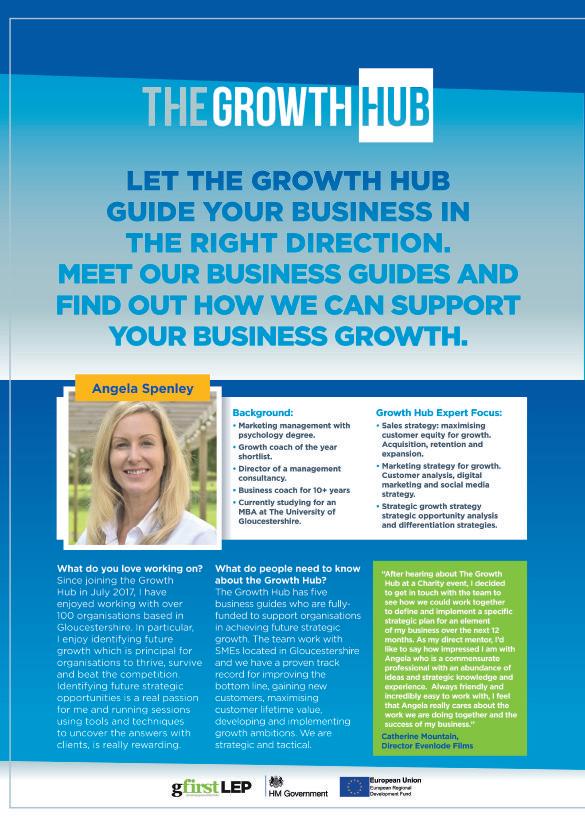
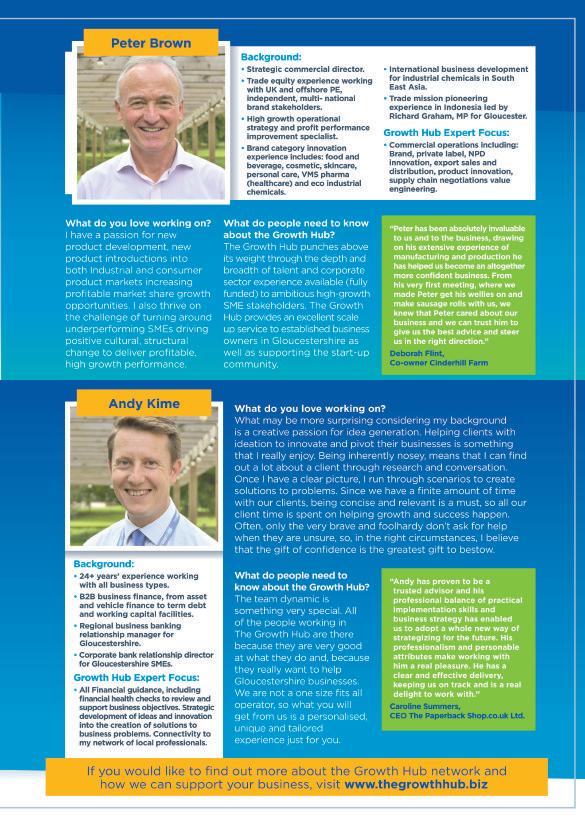









Ruth Dooley is a partner and head of the litigation support team at Hazlewoods LLP, an accountancy firm based in Cheltenham and Staverton with 412 staff and partners. Ruth’s role as chair will be to lead the LEP Board who represent a wide range of private, public, education and voluntary sector organisations from across the county, and work with partners to engage government and realise the LEP’s ambitions for Gloucestershire.
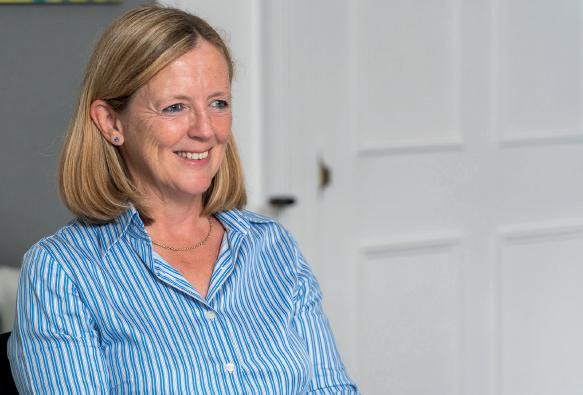
said; “I am honoured and excited to be taking on the role of Chair. In the decade since it was established, GFirst LEP has secured more than £112million in capital funding to invest across the county, it has launched a hugely successful Growth Hub network along with a whole host of fantastic projects including the Gloucester Transport Hub, the Gloucester M5 Services, Cyber Central in Cheltenham,
Farm 491 in Cirencester and the GREEN Skills centre in Berkeley. I am determined that the LEP will build on this impressive legacy over the comings years, continuing to deliver the sustainable economic growth that Gloucestershire needs and deserves.”
The LEP also has appointed four new Board members from the private sector.
Tyler Attwood, Founder/Director of Your Next Move Ltd, Nicola Bird, Founder and Managing Director of AccXel Ltd; Safety and Business Development Director of Bell Contracting, Matt Charman, Head of Public Sector Marketing at Google and Joe Roberts, Director of Roberts Limbrick Ltd.
GFirst LEP Board members keep the LEP focused on its key priorities; job creation and sustainable economic growth, and ensure that when funding is available, they


respond to the needs of Gloucestershire’s businesses and ensure that the right projects receive the funding.
David Owen CEO of GFirst LEP, “This is a pivotal time for Gloucestershire, and GFirst LEP is in a strong position to help lead the local economy as it emerges from the pandemic. The immediate priority is to protect jobs, create opportunities for new employment and upskill workforces to move to a more digital and environmentally sustainable Gloucestershire. The immediate focus being on delivering major schemes for the county including the five ‘Getting Building Fund’ projects. It is fantastic that Gloucestershire will be able to draw on the wealth of experience and vision from Ruth and our new Board members. I am delighted to welcome them to the LEP Board and look forward to delivering on our projects and priorities collaboratively for the county.”
Gloucestershire’s
LEP, is pleased to announce that our new Chair
Dooley.
















If you would like to find out more about how GFirst LEP supports Gloucestershire through sustainable economic growth please visit www.gfirstlep.com













 CEO - GFirst LEP
David Owen
Founder and Managing Director of AccXel Ltd; Safety and Business Development Director of Bell Contracting
Nicola Bird
Leader, Gloucestershire County Council
Mark Hawthorne
Leader, Stroud District Council
Doina Cornell
CEO, The Music Works
Deborah Potts
Deputy CEOGFirst LEP
Dev Chakraborty
Head of Public Sector Marketing, Google
Matt Charman
Principal and CEO, Hartpury University and College
Russell Marchant
Principal, Cirencester Sixth Form College
Jim Grant
Partner, Harrison Clark Rickerbys
Jenny Raymond
Founder and Director, Your Next Move Ltd
Tyler Attwood
Director, Roberts Limbrick Ltd
Joe Roberts
Director for Business West in Gloucestershire
Ian Mean
Associate Director of Consulting Technology, Campden BRI
Emma Hanby
CEO, Versarien Graphene Ltd
Neill Ricketts
CEO - GFirst LEP
David Owen
Founder and Managing Director of AccXel Ltd; Safety and Business Development Director of Bell Contracting
Nicola Bird
Leader, Gloucestershire County Council
Mark Hawthorne
Leader, Stroud District Council
Doina Cornell
CEO, The Music Works
Deborah Potts
Deputy CEOGFirst LEP
Dev Chakraborty
Head of Public Sector Marketing, Google
Matt Charman
Principal and CEO, Hartpury University and College
Russell Marchant
Principal, Cirencester Sixth Form College
Jim Grant
Partner, Harrison Clark Rickerbys
Jenny Raymond
Founder and Director, Your Next Move Ltd
Tyler Attwood
Director, Roberts Limbrick Ltd
Joe Roberts
Director for Business West in Gloucestershire
Ian Mean
Associate Director of Consulting Technology, Campden BRI
Emma Hanby
CEO, Versarien Graphene Ltd
Neill Ricketts
Dale Vince is one of the UK’s most recognisable climate change activists, and the founder of the UK’s first truly green energy supplier. Ian Mean spoke to him ahead of Cop 26

 By Ian Mean Business West Gloucestershire Director
By Ian Mean Business West Gloucestershire Director










Twenty-six years ago, Dale Vince had what he calls his epiphany moment and “dropped back in” from his hippy life to build a windmill above Stroud at Nympsfield where he had parked his caravan.
And now – just a few weeks before the start of Cop 26 (The United Nations 2021 Climate Change Conference which is taking place in Glasgow in November), Dale tells me this is the time to get back to his roots with Ecotricity.
“So, I don’t think it is about Cop but there is an element of re-booting or getting back to our roots – doubling back down.


“All the evidence tells us that the climate crisis is here. We have got 10 years to really move mountains to avoid it getting worse.
“I think to an extent that has made us feel held to do more. We are at 40 per cent but we have to get to 100 per cent.
“At the moment, the market is dominated by energy companies that joined the green energy market subsequent to us.


“They are selling electricity described as green, but it’s greenwashing. Even the government has just announced an investigation into this greenwashing.
“We have been standing against this for a while. What it boils down to is that if you are not building and doing what you
are supposed to be doing as an energy company; if you are just buying and selling existing green energy – that is greenwashing.
“People need to understand that we need to do more than that.
“Sometime in the autumn we will announce a major new initiative to stand against greenwashing.”



Founded in 1995, Ecotricity’s first supply was on April 1, 1996. That customer was Gloucestershire College.
Twenty-five years ago, did he realistically have the vision of where we are now?
“Not at all, it was a very different world and I had just dropped in from a decade on the road.

“I had a feeling about renewable energy and a concern for the planet. I was aware that energy was the single biggest source of carbon emissions in Britain.
“All of that came together in this epiphany moment which said the next big thing in your life is to drop back in and try and change the way energy is made in Britain.

“We feel we are in a battle for the soul of the green energy market right now because a lot of people are being greenwashed.”
What are you prepared to do to try and stop these companies? They are in a commercial world like you, can you really stop them?
“We can’t stop them, but we can compete with them in the market – it’s about giving people a different choice,” he says.
“We put all the money we make back into our mission – we don’t have shareholders. We are a not-for-dividend company – we don’t make money to give to shareholders.”


As this magazine goes to press, Ecotricity has made a number of so far unsuccessful bids to buy Chippenham-based Good Energy.
Why are you determined to buy the company? I ask. They have now rejected your offer several times.

“If we combine the two companies, we can create a deep green energy player on a sufficient scale to challenge the greenwashing narrative in the market.”
So, you would be able to stand out against these companies who are saying they are green but aren’t?
“Yes, we would have bigger voice – a bigger footprint. A bigger chance of success so it’s a combination of Britain’s two biggest green energy companies.”
I put to him that the woman who founded Good Energy, Juliet Davenport, was not one of his greatest friends.
“
ese people have access to No 10 and No 11, they stick their seconded employees into government departments and they write government policy ...”
“Well, we are on speaking terms”, he says with a wry smile.
Deadline for the acceptance of the Ecotricity offer was on October 8.
Would he like to address the international leaders at the Cop 26 climate change summit in November?
“I would but I don’t know how much difference it might make. I have a very simple way of looking at things – not simplistic – just uncomplicated.
“If I was talking to Cop 26 right now, I would say you simply have to change your economy to favour a new way of doing things.
“At the moment, taxes, subsidies and regulations – the three big levers of government – all support the burning of fossil fuels and the mass farming of animals. They are the three things that drive the crises we face. Everybody needs to change their economic model.
“We tax low carbon things more than high carbon things— you pay 20 per cent VAT on solar panels for your home. If you want to burn coal at home that’s five per cent.”
Why don’t government listen to these arguments?
“Governments are beset by powerful, loud lobbying voices and have a real problem in seeing the wood from the trees.
“Only the richest, most powerful voices get into the ears of government, that’s what skews the outcome.”
You have a powerful voice why can’t you do that?
“If only — I am not a powerful voice. Yes, I get on the radio a lot, but this is a different order of magnitude of power.
“These people have access to No 10 and No 11, they stick their seconded employees into government departments and they write government policy, I think it is corrupt.”
So, how are you going to convince me as a business to change my supplier to Ecotricity?
“I don’t try too hard, I am not a hard seller. I
am saying this is important for their survival in their marketplace.”
Dale is the face of Ecotricity —how is he going to get other people to take up the baton?

“We don’t seem to have a problem with that. We have a great team — we are here on a mission. It feels good to do what we are doing.”
How long are you going to go on?
“God knows. I don’t have a plan. In all of my years I have never had a plan.”
For the last few years Dale has been developing a process for making diamonds in an environmentally-friendly way. In a secret Stroud manufacturing facility, his team have been developing a process called chemical vapour deposition, which takes carbon, water and energy and with the help of an enzyme, produces a synthetic layer. Once mixed with the right purity of gases, a diamond is created.
I ask how this project is progressing.
“A little bit slow for my liking but we should be in retail soon.
“We are creating the highest quality gemstones you can find in the world. The top quality you can dig out of the earth is a D flawless, we are making those now.
“We have just created our pinks and blues in bigger stones up to two and three carats.”
He is cautious about the price range but “depending on the colour and clarity, probably £3,000–£6,000.
“We have the most sustainable diamonds in the world.”
Dale Vince, OBE is the man of the moment in this rapidly changing world of climate change.
In his book, Manifesto, Dale predicts: “I think politics is the next frontier, where we most need change and where most impact could be had. I may go there.”
Dale as Prime Minister? It could happen.






One of the most influential business organisations and largest Chamber of Commerce in the UK, Business West, has certified as a B Corp, joining a global community of organisations reinventing business by balancing profit with people and the planet.

The B Corp certification process is rigorous, requiring evidence of socially and environmentally responsible practices.
Business West’s carbon neutral status and net zero carbon target, Living Wage Foundation accreditation, Transparency in Supply Chains reporting and involvement in the BeOnBoard diversity initiative are all key factors that enabled them to be accredited.

Phil Smith, Managing Director of Business West, comments: “At the core of our mission is sustainable and inclusive growth of the region, which prioritises quality of life for those who live, work and learn here. B Corp certification provides a roadmap of how we can continue to improve and encourage the 20,000 organisations we work with to join us.”
Chris Turner, Executive Director of B Lab UK, which certifies B Corps, says: “This is a movement of companies who are committed to changing how business operates and believe business really can be a force for good. Business West are going to be a fantastic addition to the community and will continue driving the conversation forward with its thousands of clients and members.”
Business West joins B Corp trailblazers in the South West…
Business West joins a community of 4,000 B Corps globally from a cross section of industries and sizes, and 57 are based in the South West - including Finisterre, Hobbs House Bakery, Triodos and Stroud Brewery.
Greg Pilley, Managing Director of Stroud Brewery, produced an organic pale ale to help Business West celebrate their B Corp status.
What is his advice to potential future B Corp members?

“My advice would be jump in there and register. It costs nothing to start working your way through the questions. There is a lot of emphasis on carbon and climate, and alongside that people and biodiversity. People must change their behaviour and move from measuring success purely on profit and GDP, to also measure the quality of life.”

Watch Business West’s B Corp journey interpreted by speed painter, Dave Sharp



Environment: Sam Shinner, Estates Manager

“Our mission to net zero started 15 years ago when we set up a working group of staff interested in environment and sustainability. We’ve really accelerated that by going carbon neutral, setting a net zero target of 2030, championing low carbon industries and supporting businesses to go green.”

Employees: Nate Benjamin, CRM System Technician
“Best Companies has named Business West as one of the top 20 best business services companies to work for in the UK. As an accredited Living Wage Employer, we ensure that all our employees are fairly paid, and our Employee Forum works to enable staff to achieve an appropriate work life balance.”
Communities: Victoria Matthews, Initiative Manager
“We work closely with decision makers from councils to LEPs to ensure that businesses and communities can thrive. The business allows staff two volunteer days a year to support local initiatives and communities. Our work with charitable trusts extends into diversity, deprivation and youth charities to ensure our region works for everybody.”
Customers: Jessica Valentine, Head of Service Integration


We support businesses across the region so they can create social, environmental and economic value to help realise our ambition of making this region the best place to live, learn and work.
Governance: Janine Woodcock, Non-Executive Director
“We work closely with ‘BeOnBoard’, whose aim is to improve the diversity of governing bodies and boards, to ensure that the leadership of our organisation reflects the diversity of the region that we serve.”
Speed painter, Dave Sharp’s interpretation of B Corp’s triple bottom line – people, planet and profits Business West team celebrates B Corp status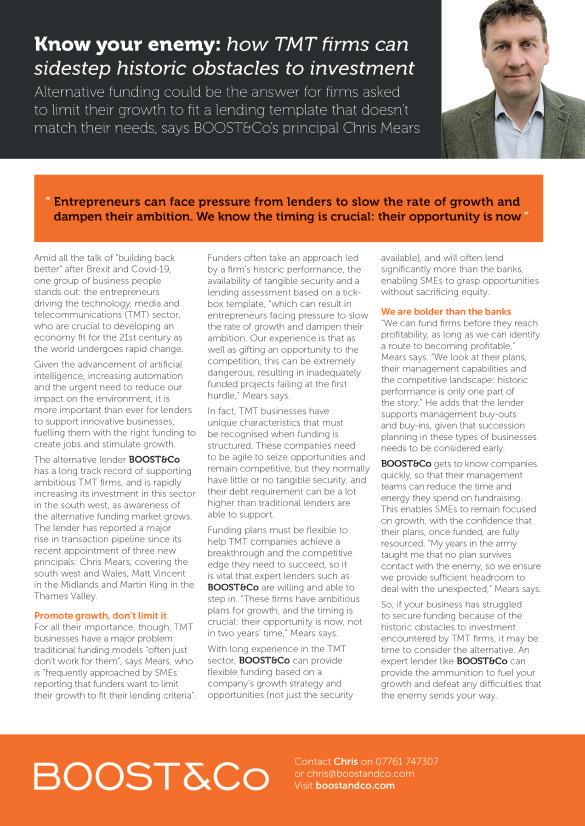
A dairy farm based near Bristol is set to double productivity after investing a £785,000 bank loan in sustainable technology.
Bickfield Farm in the Chew Valley produces milk exclusively for The Estate Dairy, which distributes milk to restaurants and cafés across London and Oxford.
A Bristol bike part manufacturer featured on Dragon’s Den in 2018, has seen a 250 per cent growth in online sales to the USA in the past year.
Exports now account for 25 per cent of Tru Tension’s total sales. The company expects to generate sales of £20 million over the next five years.
Tru Tension was established by Chris Frappell in 2015. The then 23-year-old’s passion for cycling and biking led him
to develop the idea for one of the company’s most popular products, the Chain Monkey. This is a tension tool that bolts on to a chain and induces an arc into the chain giving cyclists the movement they need.

Since 2016 the company has received support from the Department for International Trade (DIT) including grants to participate in overseas trade shows and attended workshops focused on how to get into the US market.
A team of architects, designers and heritage experts have been appointed to take forward plans for the redevelopment of the Bristol Zoo Gardens site.
The multi-disciplinary team is led by awardwinning London-based Penoyre & Prasad architects, working with LUC landscape architects and heritage and conservation specialists Alan Baxter.
The appointments follow the announcement last year that Bristol Zoological Society, which owns and operates Bristol Zoo Gardens and Wild Place Project, is to sell its Bristol Zoo Gardens site to safeguard the future of Bristol Zoological Society.
It is relocating the zoo to the Wild Place Project site near Cribbs Causeway.
The farm produces milk from its dairy herd, running an intensive “free range” system exposing the cows to as much fresh pasture as possible in the summer months which yields a rich golden milk from its herd of 250 pedigree Guernseys.
The third-generation farm will use the Lloyds Bank loan to build a new milking parlour, improve production and modernise the milking process
The technology will increase the farm’s milking capacity while reducing the overall running time, allowing 50 per cent more cows to be milked during any given period.
The milking process currently accounts for 60 per cent of the farm’s total electricity usage, and by reducing the running time, the business will achieve a 30 per cent energy saving. Heat generated from the new technology will pass through a heat exchange system and be used to pre-heat water to support the farm’s cleaning process.
The finance package comes via Lloyds Bank’s Clean Growth Finance Initiative, which provides discounted funding to help businesses transition to a lower carbon, more sustainable future.

I am old enough, just, to remember a time before Covid, a time before Brexit, a time (even) before the GDPR came into force. In particular, I remember that a lot of my clients were getting terribly exercised about the possibility of enormous fines from the Information Commissioner (or ICO), every time they mishandled data. Ah, such innocence!
Such fears did not come from nowhere. A great many vendors of cyber and GDPR risk management solutions (including, I am sorry to say, a number of lawyers who really should have known better) were quick to seize on the headline-grabbing maximum fines of 2% or 4% of annual global group turnover, suggesting that fines of this level awaited anyone who put a foot out of line.


Three and a bit years on from GDPR coming into force, a great deal has changed. Yes, there have been a few (a very few) large fines, although the ICO has had to scale back two of the largest, against British Airways and Marriott hotels. In most board-rooms, the risk posed by such fines is viewed more realistically, even cynically. But just as that illusory threat has receded, a far greater and more tangible threat to businesses has begun to emerge.
Your business will almost certainly have repositories of data. It might be payroll


information about staff; it might be customer mailing lists, it might be credit card information from online transactions. If you are a responsible (and GDPRcompliant) business you should have technical and organisational measures in place, appropriate to the risk presented by a disclosure of that data, in order to safeguard it. These measures are, in large part, what is meant by cybersecurity. They might include firewalls, file encryption, access controls or policies around the retention and secure erasure of information.
No such measures are fool-proof, however. If (when) your system is compromised, and the data is accessed, you will need to take a number of urgent steps.

First, as soon as it is detected, you will have to secure your data. This can be easier said than done when malware has been installed on your system, particularly if it has been lying dormant for a while and is therefore also saved on your backups. Second, you will need to consider who the breach needs to be reported to: the ICO; affected data subjects; and/or corporate customers, investors or other stake-holders. All of this needs to be done urgently, and often within 72 hours of discovering the breach.
This is where the real risks arise. As soon as news of a data incident reaches the public domain (and often long before anyone really knows what has happened or who is at fault) we are seeing claimant law firms putting up specific web pages promising compensation to affected individuals, and aggressively targeting those individuals through social media and search engine (adword) advertising.
These firms assert that such claims are able to be pursued even where there is no evidence of financial harm flowing from the breach. If a claimant says that they have suffered anxiety and distress as a consequence of the incident, they will


make a claim on their behalf, promising to get thousands of pounds of compensation for even the most trivial of breaches. I have seen a recent claim for compensation where a letter was sent to the wrong address and returned unopened, for example. In addition to the frequently exaggerated claims for compensation, the law firms are also running up costs which, together the unrealistic expectations they encourage in their clients, prove to be an enormous barrier to resolving the claims.
Nor, unfortunately, is cyber risk insurance






always a solution to this threat. As the rate and scale of these claims increase, we are also seeing a number of insurers who were happy to sell such policies being rather more reluctant to stand behind them. This has the effect of narrowing the availability of cover for costs involved in the remediation and notification steps set out above. But it can also impact on insurer engagement during those first crucial 72 hours. Often businesses are forced to go ahead without the approval of their insurer for fear of losing vital time in their initial incident response activity.
It is not all bad news. Cases (a number of which we are involved in) are making their way through the Courts in an attempt to clarify and restrain the scope for these extravagant claims. Some excellent and responsible cyber insurers are emerging with considerable expertise in incident response and support for affected businesses. Whether these will have the effect of bursting this new litigation bubble remains to be seen, but for now the risk remains. Appropriate safeguards and readiness testing can help to manage that risk, but it must be taken seriously.
 Director
Director

M: 07971 380744


E: william.richmond-coggan@freeths.co.uk

Richmond-Coggan is a Data Protection and Cyber Risk Director in our Technology & Life Sciences Group at Freeths LLP. He is regularly instructed by corporate defendants in connection with cyber readiness, incident response and large scale data breach litigation.
Appropriate safeguards and readiness testing can help to manage data risk, but it must be taken seriously…
More than £3 billion in external investment has been raised by Oxford University spin-out companies. This is great news for the university as spin-outs channel millions of pounds back into university research, benefiting the economy and creating jobs.
It hasn’t always been the case. While the University of Oxford is 800 years old, Oxford University Innovation (OUI), which supports the spin-out of research into businesses, was only established in 1987.
But the university has been breeding its own businesses since 1959, and established the world’s first spin-out.
That was Oxford Instruments, founded by Martin Wood (now Sir Martin Wood), then a senior research officer at the university. His company pioneered the development of magnetic resonance imaging (MRI) and built the first commercial MRI whole body scanner.
While the company went on to enjoy global success, the university hadn’t asked for equity in the business, feeling (at that time) that it shouldn’t get involved in the grubby world of commerce.
Things have changed. And we should also point out that over the last few decades Sir Martin and Lady Audrey Wood have donated millions of pounds in philanthropic support for scientific projects across the county.
Any Oxford University academic can set up a company and exploit their knowledge.
The first stage is to protect the idea itself and if they work at the university, they are legally obliged to do that through Oxford University Innovation. However, it can sometimes take years before the idea is fully patented, let alone brought to commercialisation stage.
Adam Workman is Oxford University Innovation’s Head of Investments and New Ventures.
“Academics come directly to us, and our teams also engage with departments throughout the university to learn what research is going on.
“External investors also bring the university academics’ ideas to our attention. Oxford Sciences Innovation (OSI), an early-stage venture capital firm, is a good example. Since 2015, it has worked with more than 200 of Oxford’s leading academics to build a portfolio of more than 100 companies, worth collectively around £1.5 billion, all based on Oxford science.”
This year Oxford University spin-out companies have raised around £1 billion in
venture capital funding. That has risen from £250 million a year a few years ago and the university is now aiming to up that to £2 billion a year over the next 10 years.
“We want to introduce more external investors into the community, not only from the UK but from around the world,” said Adam.
However, the last 18 months have been challenging, thanks to the pandemic keeping everyone at home.
Adam and his team are tackling this by offering a dating agency approach. “When getting to know a new investor, we try to understand what sort of company they want to invest in, at what stage of their development. It can take many introductions before a first investment, but once that’s over the line, it’s easier.”
Oxford University Innovation aims to engage investors at the earliest stage of a company’s development.
“It’s been a challenging year for seed investment,” said Adam. “Doing deals takes longer because it’s been more difficult to undertake due diligence and meet management teams face to face.”
Oxford University Innovation is also working with more investors to build syndicates, giving them a level of comfort in numbers by spreading the risk.
Founders must decide how much equity to give away in early-stage investment.
“They have to work it back from the exit point, by deciding what funding they will need for the next few stages of investment,” said Adam.
“We help sense check whether an investment offer is fair and reasonable.”
The more strategic a company is from the get-go, the better they can structure funding rounds, he advised.
“Many young companies don’t ask for enough money to get to the next stage. If they ask for enough money to get to that inflexion point, it helps them with the next stage and to secure an increase in valuation.”
The University of Oxford helps create three types of companies.
Spin-outs exploit intellectual property developed by a university academic. The university holds the intellectual property which is shared with the academic (in Cambridge incidentally, it’s the other way around. The academic owns the IP, which is shared with the university if it helps them commercialise it).
There has been debate about the scale
of equity holdings within universities, leaving some to wonder what benefits the academic can expect to achieve if half the equity in their idea sits within the university.
Oxford University has evolved its equity holdings over 30 years. “Our average equity in a spin-out is below 30 per cent,” said Adam. “30 years ago, it could be that 95 per cent of the equity was university-owned. We have come a long way and continue to encourage our academics to come forward. We want them to feel empowered and knowledgeable.”
The university also helps create start-ups. These are student or alumniled businesses where the university doesn’t automatically have a right to equity but provides support, help and some funding.
More recently, the university has begun to set up social ventures. These are where academics want a company vehicle to help them get their knowledge and ideas out, but the ideas themselves may not be highly profitable in the short term, or at all. A social venture is focused on making a global impact through its mission.
Oxford University has created a total of 270 companies since 1959, of which 200 are academic spin-outs, from engineering to medical and political sciences. It still holds shares in 167 of them which are worth approximately £182 million to the institution.
Oxford University Innovation is seeing more overseas investment interest.
US Investors have long had an appetite for UK innovations and increasing numbers of UK university spin-out companies are setting up operations there. North America is a potentially massive market, especially for medical tech companies.
“It’s the next obvious market after Europe for life sciences companies. There is a welldefined regulatory pathway through their Food and Drug Administration,” said Adam Workman, Oxford University Innovation’s Head of Investments and New Ventures.
“We have a small amount coming from Korea, Singapore and Japan, though not much from China,” he added.
Chinese investors would rather invest in a joint venture based in China and many spin-out companies are not yet ready for that commitment.
But by and large even if a UK university spinout sets up shop overseas, across Oxford University’s portfolio of companies their IP tends to stay in the UK.
“While Vaccitech and Immunotec are listed on the Nasdaq in the USA, their IP and the majority of their staff are still based in Oxford,” said Adam.
In May, Vaccitech Ltd, the clinical-stage biopharmaceutical company behind the Oxford AstraZeneca vaccine, raised $110.5 million on its debut on the Nasdaq.
“If you look at the amount of money a company like Vaccitech needs to undertake trials, the money is really only available on the Nasdaq,” said Adam.
Prior to listing Vaccitech raised around £140 million. On listing it raised a further £80 million.
Another Oxfordshire company, medical imaging software provider Perspectum, is preparing to list on the Nasdaq for a $75 million initial public offering.

Building One is a landmark building for Oxford, combining flexibility for o ce, laboratory and R&D use with the highest standards of internal finish and a striking contemporary design.









packages available, together with its strong environmental and sustainability considerations, with the use of recycled materials, automatic movement and daylight sensitive lighting, solar gain resistant enhanced cladding and brise soleil system and electric vehicle charging points befitting the Park’s position at the forefront of Oxford’s science based revolution.

Flexible lab-enabled office space to let in suites from 4,140 sq.ft.

Strategic location in the South East of England’s life sciences cluster.



Local scientific talent pool built up over decades of investment, in a growing collaborative life sciences community.
Strategically placed for excellent access to both Oxford and the surrounding transport infrastructure.
An amenity-rich environment, on the park’s doorstep, with a large gym, shops, restaurants and character pubs.

• 4.2m slab to slab height
• Over-sized 17 person passenger lift suitable for lab equipment
• 3 phase electricity supply
• Generous service provision via ducts and risers

• Roof top plant provision
• VRV mixed mode comfort cooling
• Suspended ceilings
• Automatic movement and daylight sensitive lighting
• Mixed mode mechanical ventilation with heat recovery
• Energy monitoring system
• Solar gain resistant enhanced cladding



• Fitted shower room
• High quality fittings to W.C.’s and common areas
• BREEAM “Excellent” rating

• 100 car space allocation with electric vehicle charging points


Alpine Racing Project Pitlane and the University of Leicester worked together to create an innovative new device that enables doctors and nurses to communicate better while wearing full PPE, with prototypes produced at the Alpine F1 team’s Enstone factory.
Head-to toe PPE worn by medical staff treating patients with Covid-19 and other infectious diseases has meant that doctors and nurses regularly have to shout to be heard, which is not only exhausting, but can cause errors of miscommunication which could potentially harm patients.

Project Pitlane, which is a collective of seven UK-based FORMULA 1 teams brought together to bring FORMULA 1 know-how to medical challenges during the Covid-19 pandemic, worked with the university to bring the device from design to fully functional prototype in just six months.
MedicCom uses a throat microphone to amplify sound and help patients hear doctors and nurses, while also helping doctors and nurses hear each other more clearly, thus avoiding miscommunication and preventing staff from straining their voices.
Furthermore, a Bluetooth connection links to mobile phones, enabling staff to have a hands-free telephone conversation with a patient’s relatives.
It has been funded by UK Research and Innovation (UKRI) and Innovate UK with Whitley Stimpson assisting with the required Independent Accountant’s Reports.
The prototype devices have been positively evaluated by clinicians in Leicester’s Hospitals, and by the Medical Devices Technology Evaluation Centre in Birmingham. The team behind the design are now seeking additional funding to roll out the devices across the NHS. Nine prototypes were subsequently produced using rapid prototype machines at Alpine F1 Team’s UK headquarters in Enstone, Oxford.
Project Pitlane, which unites on-track competitors and personnel from across F1 and motorsport, was created in March 2020 to answer the UK government’s call to collaborate and produce essential supplies in the fight against Covid-19. It relies on expertise and goodwill throughout the industry to assist multiple organisations with engineering challenges and deliver an end product or service for the greater good.
Alpine Racing (formerly Renault F1) was established in 2016, with Project Pitlane being born in 2020 and Whitley Stimpson quickly partnered with the new company to provide support from its inception.
Ian Parker, director Whitley Stimpson explains: “When Bob approached me to discuss Project Pitlane it was at a time when it was becoming apparent that the NHS needed additional support to cope with the Covid-19 pandemic. This project sounded as though it could provide a very useful solution to a problem that I hadn’t even considered.
“I was delighted to partner with Project Pitlane and assist with the compliance requirements attached to the UK grant funding that they had received on a pro-bono basis.”

As accountants it is quite unusual to be involved in projects that can deliver so much good for the public and I was pleased to help.”
Bob Bell, strategic advisor for Alpine Racing said: “We would like to thank Whitley Stimpson for their support in advising on the grant compliance for Project Pitlane in the development of the MedicCom device. It has also been a pleasure to work with the university to develop a novel medical communications device to assist NHS clinicians wearing PPE.”
For more information about how Whitley Stimpson can support your business visit www.whitleystimpson.co.uk


F1 driver extraordinaire, Sir Lewis Hamilton MBE officially opened Motorsport UK’s new headquarters at Bicester Heritage following the governing body’s relocation to the heart of the UK’s ‘motorsport valley’ this summer.
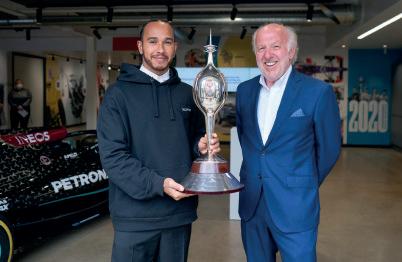
The seven-time Formula 1 World Champion was greeted by Motorsport UK Chair David Richards CBE, CEO Hugh Chambers, and staff from the governing body and membership association.
The Mercedes-AMG Petronas F1 driver toured Motorsport UK’s new operational base to see the work the organisation is doing to sustain and develop safe, fair and fun motorsport in the UK.
During his visit, Lewis was presented with the coveted Hawthorn Memorial Trophy by David Richards, the 11th occasion he
has accepted this annual award which honours the achievements of a British or Commonwealth driver in F1 motor racing.
The trophy was awarded to Lewis for his 2020 FIA Formula 1 World Championship title and his campaigning for equal opportunities in motorsport for those from under-privileged and minority backgrounds.
David Richards said: “Who could be a better person to open our new premises in Bicester than not just the current World Champion, but a British World Champion seven times over.”
Motorsport UK, a not-for-profit organisation, is the national membership organisation and governing body for four-wheel motorsport in the UK, representing competitors, volunteers, clubs and fans.
Banbury-based security services company Westminster Group plc has been awarded a contract to to help protect the historic Royal Palace and Fortress of the Tower of London.
The Tower, built by William the Conqueror in 1078, has served as a Royal Palace, fortress and prison over the centuries.
Security of such a landmark building, which is open to the public, is paramount and Westminster has been contracted to provide a range of security services to the pedestrian and vehicular entrances. Further details on the scope of the contract will remain confidential.
Westminster’s Chief Executive, Peter Fowler, said: “Following other significant contract wins such as the Palace of Westminster, home of the UK Parliament, and recent long-term multi-milliondollar contract wins in Central and West Africa, this latest contract award demonstrates we have the reputation, skills and resources to secure and deliver high profile contracts around the world.”
Earlier this year, Westminster Group was awarded the Queen’s Award for Enterprise in recognition of its outstanding contribution to International Trade.
Oxford Flow, the flow control equipment specialist for the energy, water and industrial process industries, has revealed headcount growth of 42 per cent over the last 12 months as the company eyes international expansion across Europe, the Middle East, Asia and North America.
Neil Poxon, CEO at Oxford Flow, said: “Our
international expansion is critical to our next stage of growth, with North America quickly becoming our fastest growing region.
He added: “We are expanding to capture the significant potential we see across industrial, process and energy sectors. As these markets decarbonise, they demand technologies that optimise operations
from a reliability, cost and environmental perspective. Even smaller elements, like valves or regulators, can make a huge impact on the efficiency of plants, rigs and distribution networks.”
Oxford Flow now has operations across the US, Europe, and Asia Pacific, including offices in Houston and Oxford.
Oxford-derived innovations have been in the news rather a lot of late. We all know about the Oxford-AstraZeneca vaccine, home grown in our region and making a real difference to the pandemic response. The main innovator behind it, Professor Sarah Gilbert, has moved from celebrity of the vaccine development world to talking point of every UK household.
As well as the covid vaccine itself, there is much other pandemic-related innovation going on in our region. The Vaccines Manufacturing and Innovation Centre (VMIC) facility is currently under construction and with the spotlight on the difficulties of vaccine logistics of late, the urgency to complete this project has never been clearer.
Amanda Simons, Partner and Callum Docherty, Associate at J A Kemp Patent and Trade Mark Attorneys look at the strength of the innovation happening across Oxfordshire.

Local companies are also at the forefront of the pandemic response: Oxford Nanopore Technologies, who recently announced their intention to float on the LSE, are just one example. With their long history of innovation in sequencing technology developed here in our region, Oxford Nanopore have surely contributed to the UK’s reputation as a world leader in identifying covid variants.
Away from pandemic-related innovations, Oxfordshire has shown itself to be a hub of innovation in a wide spectrum of other fields, from Oxford PV’s promise of cheaper and more efficient solar panels to the realistic digital worlds of Hollywood films made possible by Vicon’s motion capture systems. As a result Oxfordshire has a multidisciplinary network of researchers thriving off one another, driving further innovation.
Drive and investment is often needed to develop new ideas and bring them to fruition. Intellectual property has a significant place to play in making that step from idea to reality. It can be a valuable tool that
serves to help build investment in innovative companies and to secure a return on that investment through a promised monopoly. IP strategy is now a key aspect of any business plan for a company with innovation at its core.
The idea of monopolising innovations such as life-saving medicines and vaccines can be unpopular and is seen as causing inflated prices and limiting access. Calls for a “patent waiver” in relation to the covid vaccines were therefore perhaps inevitable. But for covid-19, as in many areas, these issues are complex: vaccine manufacture and logistics are arguably bigger issues than IP and license arrangements such as that between AstraZeneca and the Serum Institute of India is perhaps a better, nuanced solution, that avoids the risk of discouraging early investment.
Away from this spotlight, there seems to be no lack of drive to innovate, and in turn secure IP protection. In our region, Oxford University is a leader in technology transfer, lately seeing some 15-20 new companies spun out every year, these being supported by University IP. And this seems to be reflected elsewhere: recent pandemicrelated difficulties in accessing lab space may have had short-term impact on the ability to generate data to support new patent filings, but overall, filing numbers remain high.
Innovation is said to be the best way out of a crisis. Our region has shown its worth in finding solutions to problems thrown up by the pandemic – perhaps our next celebrity innovators will come from the many local companies working on creative solutions to climate change. Necessity, after all, is the mother of invention…
Amanda Simons is a partner in the Oxford office, with over 20 years’ professional experience, including an extensive track record in advising start-up companies and working in developing technologies. Amanda’s work focuses on the pharmaceutical and medtech sectors, including anti-microbials, re-purposed drugs, pharmaceutical formulations, medical sensors and other medical equipment. Contact Amanda at asimons@jakemp.com or call 01865 406 100
Callum Docherty is a European and UK Patent Attorney based in our Oxford office. Callum’s main focus is on software and physics-based inventions including bioinformatics, user interfaces, telecommunications, semiconductor technologies, scientific instruments and optical devices. Contact Cullum at cdocherty@jakemp.com

The High Sheriff of Oxfordshire, Imam Monawar Hussain, has opened new research and development laboratories at the Wood Centre for Innovation in Headington.
The Oxford Trust’s development of class II laboratory facilities at The Wood Centre for Innovation is its answer to the significant demand in the last year from science and tech start-ups and SMEs for lab space in Oxford’s world-leading life sciences cluster.

Biotech start-up DJS Antibodies has taken more than 2,000 sq ft of laboratory and office space, and Samsara Therapeutics
1,200 sq ft. DJS Antibodies is developing therapeutics to treat the world’s most critical inflammatory diseases, a class of disease
that accounts for more than 50 per cent of deaths worldwide. Samsara is discovering new therapies for extending healthy ageing and treating age-related genetic diseases.
They have joined Barclays Eagle Labs, Low Carbon Hub, Lurtis, Spintex, Printpool and SSEN, also located at the centre.
Following £200,000 of additional Local Growth Fund support, secured by the Oxfordshire Local Enterprise Partnership, The Wood Centre is now beginning a second phase of conversion.
This work will be the development of laboratory space and ancillary areas for work at up to containment level 2 with climate control and air handling.
Courier company DPD has confirmed that Oxford has become its first allelectric city, with nine further UK green cities to be confirmed this year.
DPD wants to deliver green courier services to 25 UK towns and cities by 2025, which will cover a quarter of the UK population.
The pledge is backed by a £111 million investment in electric vehicles. The initiative will deliver 42,000 tonnes of CO2 saving – the equivalent of planting 170,000 trees, by 2025.
All Oxford parcel deliveries will be made from DPD’s new Bicester ecodepot.
The huge new 60,000 sq ft hub at Symmetry Park is DPD’s first net zero carbon in construction building. The depot has a fleet of 40 electric vehicles, and will be able to deliver more than 15,000 parcels a week.
The new facility is the most sustainable facility in DPD’s UK network. Once fully operational, the depot could create up to 250 new jobs.

The rather oddly-named OOOOO, which says it is the UK’s first livestreaming shoppable platform, has introduced advanced in-app gamification developed to encourage consumer loyalty and organically grow its shopping community.
OOOOO, which was only founded last year by Sam Jones and Eric Zhang, now has offices in Oxford and Shanghai. It helps brands and entrepreneurs share their products and services with customers through live, interactive, shoppable videos.
OOOOO Entertainment
Commerce operates a technology platform that enables key opinion leaders and influencers to create, edit and share opinions through short, live videos that are tagged to products. These videos are shared across social media networks and the platform pays a commission to the influencer for each product sold through their videos. The application also allows live, interactive commerce, and social features in which the price of a product decreases as more people buy.
Last month OOOOO listed on the Toronto, Canada (TSX) Venture Exchange.






Saietta Group, based at Upper Heyford near Bicester, raised £37.5 million when it floated on the London Stock Exchange’s AIM in July, valuing the business at more than £100 million. The company has developed the innovative axial-flux technology electric motor designed for high
efficiency electric vehicle drivetrains.
Vic Kist, Chief Executive of Saietta, said: "We have taken high-end, high-performance technology and redeveloped it for low-cost, mass production. Reducing EV cost and enabling widespread adoption is
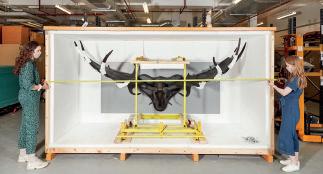
The Natural History Museum is relocating 27 million specimens, around a third of its overall collection, to a new science and digitisation centre at Harwell Campus in Oxfordshire which is set to open in 2026.
The new centre will help ensure the collections and the vast data contained in them are safe and digitally available for researchers all over the world.
The facility has been enabled through a £182 million investment from the Department for Digital, Culture, Media & Sport.
Dr Tim Littlewood, Executive Director of Science at the Natural History Museum said: “We are in a race against time to find evidence-based solutions to the major challenges facing our planet.
“This new centre will allow us to generate and process data through a major acceleration of our digitisation programme.”
The centre will also enable the museum’s
300 scientists to apply the latest innovative technologies such as artificial intelligence, imaging and genomic analysis to the collections to better understand natural diversity, how it is changing and how we can address the planetary emergency.
The new centre will house the Natural History Museum’s vast mammal collections, non-insect invertebrates (such as corals, crustaceans, molluscs and worms), molecular collections, and ocean bottom sediments totalling more than 27 million specimens.
Dr Doug Gurr, Director of the Natural History Museum said: “We’ve purposely chosen to develop the new centre at one of the leading hubs of technology and innovation in the UK and internationally because the collections are such a powerful scientific tool.
“It’s a unique opportunity to reshape the role museum collections play in research, for the benefit of the UK and our contribution to international research.”
an essential step for emerging economies and cities gripped by air pollution. We believe we are uniquely positioned to disrupt the Asian light motorbike market which is expected to increase to around 100 million by 2030, 40 per cent of which are forecast to be electric.”
Owen Mumford, the Woodstockbased company which designs and manufactures medical devices, has been awarded B Corp certification, the globally recognised mark of sustainable and ethical governance.
Owen Mumford, which established its sustainability programme in 2014 and has formally committed to the UN’s Sustainable Development Goals (SDGs), now joins the growing community of for-profit businesses that are applying growth and profit to the positive gain of the environment and external communities, as well as employees.
Jarl Severn, CEO at Owen Mumford, said: “Companies like ours that operate in the medical sector are used to the demands of a tightly regulated environment.
“We believe that it is not enough simply to state ethical and environmental aspirations, but it is also critical to achieve a recognised certification.”


What makes every company unique is its people – and without them, could your business still operate as it does today?
There are two main areas to look at when it comes to people risk –the individuals that the business could not function without and the wellbeing and engagement of your staff.


The loss of an essential colleague can wreak havoc on a business, from redistribution of duties, loss of contacts, payments becoming due or simply the breakdown of the company continuing to function as a well-oiled machine.
Key Person cover is a life insurance policy arranged that can provide the company with a lump sum payment to enable the business to continue trading, maintain profit, fund a replacement, pay off a bank loan or repay directors’ loan accounts.
Cover can be arranged to include critical illness conditions such as heart attack and cancer, so that if a key individual becomes unable to work due to a serious illness (subject to the conditions covered by the plan), the policy will pay out.
Consider the key people in your business:
• The business owners who set the strategic direction and run the business
• A salesperson or director who has a major impact or influence on profit
• Specialist individuals whose skills are hard to replace
• People who hold vital relationships with third parties (banks, suppliers or key clients)
Key Person Insurance should form part of your overall risk management programme– and is just as important as insuring your premises and products.




Attracting and retaining talent is now a top priority for business owners. The impact of COVID-19 and Brexit on the employment market means attracting and retaining quality talent is a struggle. In fact, with signs pointing toward recovery in many economic sectors, a survey estimates that 1 in 4 workers* will look for opportunities with a new employer once the threat of the pandemic has subsided *https://www.forbes.com/sites/carolinecastrillon/2021/05/16/why-millions-ofemployees-plan-to-switch-jobs-post-covid/?sh=73f6973411e7
The wants and needs of employees have changed significantly over the years. Today, employees are concerned with purpose, company culture and benefits as well as the salary being offered.

We’ve all been through a lot during the last eighteen months or so and many of us have suffered with mental health issues. Circumstances can include feeling depressed, lonely or anxioussituations that may have arisen or been compounded by working remotely.
Another major impact of Covid is the significant increase on NHS waiting lists for routine treatments and operations – as well as GP surgeries being overwhelmed and, in some cases, hard to access.
Over the last year, it’s reported that almost a third of all employees rated their physical health as poor or worse.** Whether it’s a cold or flu that just won’t go away, chronic back pain or other musculoskeletal issues, or something even more serious, many individuals have disregarded or ignored their physical heath during the pandemic. **https://www.westfieldhealth.com/
Organisations should now be putting the wellbeing of their
You probably have insurance cover in place to protect your business assets such as your premises, vehicles, products and liabilities. But what about the people that make your company successful?
employees as a key pillar on their agenda. What might come as a surprise however is that it doesn’t take big budgets to do so.
Health and wellbeing solutions are no longer reserved for huge organisations, nor are they reserved for the C-suite or senior management. Technology has truly revolutionised access to modern healthcare – through remote consultations and digital GPs, it can provide support for physical health issues virtually for entire workforces and help employers tackle big pain points like absenteeism and presenteeism.
Whilst it’s important to note that online services such as this are not an emergency service, the GPs supporting them – many of whom are also working to support the NHS – are able to provide sound advice to help alleviate concerns and anxiety about an individual’s healthcare, or if needed make the right referrals more speedily to escalate an issue.
As well as providing access to private treatment options to alleviate NHS waiting times, employee benefit programmes can also include technology-based solutions such as 24/7 access to a GP. For example, Doctor Care Anywhere not only provides a virtual GP service, they also provide mental health services in an integrated fashion to improve the health outcomes for members.
Now is the time for employers to show employees and prospective talent that they’re willing to invest in their well-being.
The combined strength of FOCUS and Partners& are here to stand shoulder to shoulder with you, providing quality, seamless advice across insurance, employee benefits and risk management.
look after your business.
Putting people risk at the top of your company’s risk management agenda has never been more important.
Whether you need to protect your business against the loss of a key person or attracting and retaining talented staff with the right blend of employee benefits, we’re here to help.
We can provide solutions to your insurance & risk management needs including:

Key Person & Shareholder protection
Business Loan Protection
Relevant Life Insurance
Employee Wellbeing, Engagement & Benefits
Directors and Officers Liability
Specialist insurance for life science & technology industries



Property Damage/Business Interruption including

Public and Employers Liability
Products and Services Liability

Cyber and Privacy Risks

There’s nothing wrong in putting profit first. Few shareholders will invest with no expectation of return, and companies need that investment to employ people and grow – allowing capital to flow across our economy.
But there are other, or you could say additional, ways to grow a business than purely through the pursuit of profit. Many family businesses see building strong local connections and investing in their reputation as a priority.
In the corporate world, this is now routinely referred to as an “ESG” (Environmental, Social and Governmental) policy, but generations of family businesses didn’t feel the need to give it a name, they just operated like that because they felt it was the right thing to do.


It can take a lot of corporate charitable fundraising to match the power of personal relationships a family company has built up over the years.

Such businesses often want to see the company pass to the next generation, so financial prudence and innovation (of which more later), are equally important.


All this brings me to Mike Hawkins, the subject of this interview and boss of The Hawkins Group in Banbury.
Mike’s dad started the business in 1978 as an industrial roofing company. Mike joined in 1999, aged 19, with a handful of GCSEs and an AAT accounting qualification. He’d
previously worked for a local agricultural business – sweeping the mill, operating the weighbridge and doing the company’s accounts. But joining the family business wasn’t an easy ride.
“While there were arguments with my dad in the early days, he gave me strong principals to abide by and a code of practice in business”
“My dad always said don’t think about the profit. Think about the client and doing a good job and the money will come.”

And, 22 years later, it has.
Hawkins Roofing is now one of four limited companies making up The Hawkins Group.

These include Hawkins Steel, Hawkins Projects and Hawkins Estates. The Group collectively turns over more than £32 million a year and directly employs 90 members of staff. Mike knows them all, and their families.
“Dad’s main interest was in roofing, but we diversified into steel fabrication after a customer asked us to replace a gate when their house had been broken into.”
When a local steelmaking company went into liquidation, Mike saw an opportunity and leased its building. As a result of the extra space, Hawkins was able to increase its turnover by an extra £1.5 million that year.
Since then, the company has continued to reinvest and seen business grow. The company bought its first building in 2006, a 25,000 sq ft facility in Banbury which previously housed another steel company.

“We thought we’d never use the top floor, but we were occupying the whole space within three months,” said Mike.

The company has expanded globally too. “Our steel making business has seen us pick up work in Singapore, America and many other countries.”

Much of The Hawkins Group overseas work has come from building industrial laundries for companies such as Johnson’s, Elis and Clean.
“We built one of the largest laundries in the healthcare sector, a £35 million facility for Elis. We also work in conjunction with German laundry machinery company Kannegiesser.”
The company is currently building a major laundry in Exeter.

Big businesses put shareholders’ interests first. After all, they provide the funds for growth. But the higher levels of public trust in many family businesses drives profitability too
“Some of these laundries are washing a million items a week,” said Mike.

Along with more traditional construction projects, the company has built wind tunnels and is about to begin work on what will be the UK’s largest indoor climbing centre, in Cheltenham.
Around 75 per cent of Hawkins Group’s work is through negotiated contract, according to Mike. “We rarely tender because of our customer base, reputation and our investment in technology.”
And it’s a significant investment for such a business. Hawkins Group teamed up with an Austrian company to develop a unique virtual reality experience at its Banbury technology and innovation centre, which the team has christened The Hawk Walk.

Clients put on VR goggles and stand on a fabricated, automated table which lifts and turns to simulate walking around a virtual building.
The £100,000 investment allows clients to visualise the building and request design changes before a brick has been laid. A lab in the wrong place? Hawkins’ designers will move it. The meeting room too small? They’ll make it bigger. Goods Inwards won’t work there, just relocate it somewhere else, all using computer aided design.
The plan can be amended there and then, so clients can check their decisions and leave knowing exactly what their building is going to look like and how it will operate. This isn’t just whizz-bang fun tech. It’s


economically practical. “If a client is spending millions of pounds, they’ll want to enjoy doing so in a professional manner, and our technology can shrink the time from design to being on site by up to 40 per cent,” said Mike.
And everything can be done, from concept design to handing over the keys, by Hawkins wholly-owned companies.
“We want to become the market leader in our area of construction, and we want our customer service to be amazing. We want profit, but it’s also about customer experience. If someone can show me the structure, and can almost physically feel it –why wouldn’t I buy from them?”
The company’s innovations go further. It is currently committed to investing more than £400,000 across the Group.


“We have put new drill lines in for automation. Our designs go from drawing office to procurement on to a drill line, to fabrication stations, the paint line and finally to just-in-time delivery.

“If a client is spending millions of pounds, they’ll want to enjoy doing so in a professional manner, and our technology can shrink the time from design to being on site by up to 40 per cent ...”The Hawk Walk, Hawkins Group’s unique VR design experience
Technology is clearly key for Mike, but so are the people he works with.
“Having the right people working here gives us all a sense of confidence. If I have the right people behind me for the job, however challenging, it gives me the confidence to sell.

“Our staff are amazing. I am very good at selling and Hawkins is successful purely because of the people we employ – many are better qualified and more experienced than me.”
While the pandemic has put a strain on everyone, Mike has tried to help here too.
“We have our own private counsellor available to all staff, so if they’re feeling low or having problems, they can see her for as much time as they need. I don’t know who goes, I just get the bill.”
Mike’s work is his passion. The Hawkins Group is currently the main contractor on 22 sites. “That’s a lot for a small business like ourselves.”
“I have turned down multi-million pound jobs because I didn’t feel our business was right for their business. We don’t need the
money or the turnover, we want to do the right thing for the right people.”
And he wants growth to continue, but at a sensible rate.
“We don’t want to put strain on our current workforce which is currently capable of turning over a further £7 million on top of our £32 million turnover today.”
“I don’t need to make millions more. We are already making a fair and reasonable increase in our balance sheet. I don’t want to lose the family feel of the firm, or to lose touch with my teams and my clients.
“I want to be able to continue making the decisions that are best for the customer and not for my balance sheet and profit. I want to build something amazing.”
I’d say he’s more than halfway there.
There is a widespread shortage of young people coming into the construction sector. The Hawkins Group is playing its part in showcasing the opportunities.
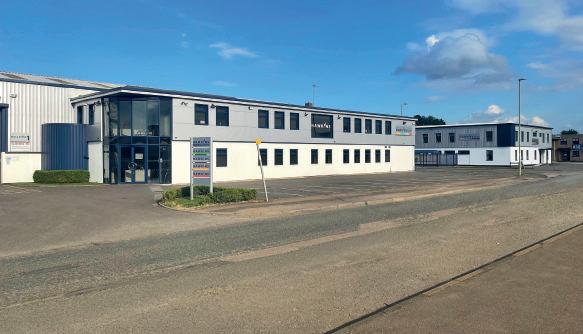
Recently it set aside a whole day to encourage new talent into the business. The team built roofing rigs and welding stations in one of its buildings and invited in 20 young people in to discover roofing skills, let them try out welding, took them up in scissor lifts and showed them the design process.
“It was a big day and cost a lot of money, but it’s critical to bring young people into the sector – so many are leaving, and we haven’t got the skilled people we used to have,” said Mike. “We aim to take on 10 apprentices this year and continue to put a lot of time and effort into recruitment.
“Even if they don’t join Hawkins at least they might go on to another construction company, and that’s OK by us. We are bringing people into the industry.”
It’s not just about the tech, it’s the people tooThe Hawkins Group’s head office in Banbury Mike Hawkins, Group Managing Director
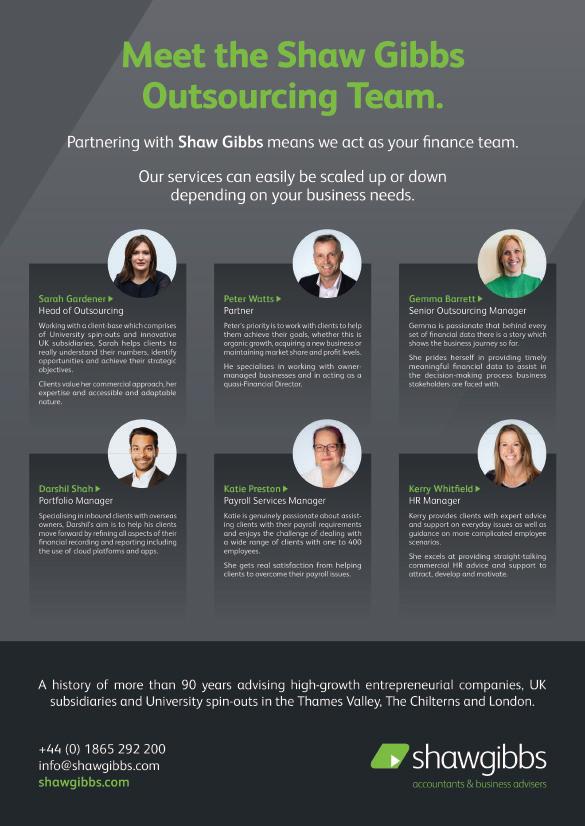


Richard Browning, the Wiltshire-based founder and test pilot of Gravity, flew rapidly through the air to track down a would-be assailant in a fictitious scenario.
The event was part of a showcase of new science and technology held at Porton Down in Wiltshire that could help fight crime and terrorism.
Those watching the event included The Metropolitan Police Assistant Commissioner Martin Hewitt and Professor Paul Taylor, the Police Chief Scientific Adviser.
Martin chairs the National Police Chief Council and co-ordinates the operational response across the police service to the threats the UK faces, including terrorism, organised crime and national emergencies.
He said: “To see something that feels like you’re watching science fiction took all those watching by surprise.
“It is clear the Gravity system has lots of potential and we are fascinated to see how it will develop and if there are any possible uses in a policing environment in years to come.”
Richard Browning said: “It’s always the same reaction – almost disbelief that you could see a human being moving in that way when your only real reference point is probably a Marvel superhero film.
“However, the application of Gravity is endless, to be able to move specialist personnel in an urban environment very quickly in a three-dimensional space is really powerful.”
Swapi, a new Wiltshire-based loyalty e-wallet platform, closed its latest funding round at £860,000 ahead of its launch this month.
Swapi wants to provide British consumers with an all-in-one e-wallet for their payment and loyalty cards, as well as providing customers and retailers with a new currency called ‘Swapi Points’ to spend on rewards, coupons and discounts on the app, irrespective of which retailer the customer has accrued their points with.
Customers can then spend their loyalty points to their needs and lifestyle.
Travelport, the Slough-based technology company serving the global travel industry, has launched a global accelerator programme in collaboration with Amazon Web Services.
Travelport Accelerator will aim to address the travel industry’s biggest retailing challenges.
Tom Kershaw, Chief Product & Technology Officer at Travelport, said: “No single person or business has the solution to all of travel’s retailing challenges.
“The most effective way to drive innovation is to unite bright minds from diverse backgrounds and geographic locations. We look forward to working with companies large and small, to drive the modernisation of travel retailing for the benefit of the entire travel ecosystem.”
Travelport Accelerator will see tech startups and innovators take aim at a series of different travel retailing challenges.
A Wiltshire entrepreneur in a jet suit swooped in to amaze invited guests at an event hosted by the government’s defence, science and technology laboratory, Dstl
IS
DRPG will support promotional events in the run up to the Games and has already worked together with Birmingham’s 2022 Organising Committee on the design and launch of the mascot, Perry, and on a sports festival to celebrate one year to go until the Games begin.
The Birmingham 2022 Commonwealth Games will see around 4,500 athletes from 72 nations and territories compete in 19 sports across 14 competition venues from July 28 until August 8, 2022.
As the biggest event ever to be held in the West Midlands, it is expected to attract more than one million spectators to the city and have a global TV audience of 1.5 billion.

Dale Parmenter, CEO of DRPG said: “As an organisation with a heritage in Hartlebury, we are proud to be part of the West Midlands, but our global presence means the Commonwealth Games is a fantastic fit with our ethos – both a celebration of our diverse, local community and the bringing together of people and countries from all over the world.
Matt Eagles, Head of Communications at Birmingham 2022, said: “It is great to have DRPG on board as our Official Promotional Event Services Provider. They are well known for their impressive, highly creative events that not only wow people, but create a lasting impact.”
Worcester-based online marketplace and tech startup Boulevard has raised £2.2 million seed funding from the early and growth-stage venture capital company, Fuel Ventures to invest in its technology platform as well as in expansion and diversification.
The first iteration of the company was founded in 2016 by young entrepreneur Dom Portman as Fancy Dress Worldwide.
It became one of the largest and most successful online retailers of costumes and partywares within just a few years, winning StartUps.co.uk’s exporter of the year award and being named in the StartUps 100 in 2019.
In 2020, the company began its diversification into multiple product categories with a renewed focus on trading across online marketplaces worldwide.
As a result of the successful launch of new products across arts & crafts, stationery, pets, toys & games and more product categories, the company began a rebranding process to Boulevard, helped by Worcester design agency Big Helping. The goal was to encapsulate the energy of a wide street, hustling and bustling with many colourful products of all shapes and sizes, but with a digital feel.
Dominic Portman, Founder and Managing Director, Boulevard, said: “We started life as a single category e-commerce business that we quickly scaled through the power of our own tech, Eiger.”
“We’re now planning on advancing the Eiger platform to enable us to break into new markets and become a leading, global online marketplace super seller.”
Mark Pearson, Managing partner at Fuel Ventures said: “It’s clear from Boulevard’s unique approach, the building of their own end-to-end supply chain software and their impressive growth that they know how to be the big sellers on these platforms and continually adapting with the times.
“The decision to invest in Boulevard was an easy one for us:”
group, DRPG, has
as the
A five-year-old bagel bakery business is, pardon the pun, on the rise after a major move into bigger premises.
The Steamhouse Bakery in Redditch is now in premises almost 10 times the size of its previous base, creating more than a dozen new jobs, as owners Ashley Baker and Kayleigh O’Mahony plan fresh growth.
Ashley Baker said: “When Covid hit, we had to close our café outlets but pivoted to selling our bagels and cakes as takeouts from the bakery.
“It has been a great success and given us a new direction for the business, but we needed somewhere bigger.
The business was advised by commercial property experts at John Truslove.
“Kayleigh and I wanted to launch our own business when we were only 24-25, before kids and a mortgage came along. We started out with just one employee.
“We recruited our bakery manager, four a half years ago and now we employ 42 people at the bakery, cafes in Leamington Spa and Worcester and with our VW doughnut truck at a popular farm shop near Snitterfield.

“Before the move we had three bakers, now we have seven and a dozen more people working front of house. We’re investing in a second food truck for Caffeine & Machine at Ettington and are also about to seal a deal for a third retail outlet.
“We’re baking 5,000 to 6,000 bagels a week, as well as 2,000 doughnuts.
The new bakery has given us a firm base for the next five years. And Ben Truslove now comes in for coffee, bagels and doughnuts every Friday.”
Ben Truslove, joint managing director at John Truslove, secured a five-year lease for the 5,332 sq ft. Steamhouse Bakery on Howard Road.
“We’re baking 5,000 to 6,000 bagels a week, as well as 2,000 doughnuts. e new bakery has given us a firm base for the next five years”
To date, over 40 businesses have been though the programme and feedback has been incredible with one business stating
“I would recommend Elevate to any business owner looking to grow, expand and develop themselves and their business. Thankyou Elevate, it was an absolute pleasure”. Nick Baxter, Baxter Williams.
Elevate has now extended its support programme to new sectors and are looking to recruit businesses who have high ambitions for growth.

There is a new business growth cohort launching which offers bespoke, specialist support to SMEs in Worcestershire who have an ambitious growth mindset.
Manufacturing businesses can also apply for either Supply Chain support or Digital Technology and Automated Manufacturing Support. In addition, Elevate Creative-Tech is a new business support programme aimed at established and ambitious SMEs within Worcestershire in the creative tech sector who are looking to identify and overcome their barriers to business growth, adopt and implement guidance and support which will in turn, support the future growth of their business and the sector. The programme will be run as a pilot with a selected group of 10 businesses.
All businesses who complete Elevate support will have the opportunity to apply for grant funding to support the implementation of their growth plans. Full European Regional Development Funding (ERDF) eligibility criteria applies.
For more information and to register your interest on any of the Elevate programmes please contact Worcestershire Business Central
T: 01527 677888
E: info@business-central.co.uk
W: Visit Elevate - Worcestershire Growth Hub at www.business-central.co.uk/elevate/
RS Hydro took part in Elevate’s first growth cohort. When they joined the Elevate programme, they knew that they wanted to grow the company and this would mean a renewed focus on people and infrastructure.
They also identified that they needed support with manufacturing, importing/exporting, staff retention and marketing.
Elevate is a bespoke programme and works with businesses to identifies those barriers to growth. They can then be matched with specialist advisors to help renew business plans and create growth plans that are sustainable and realistic.
After receiving a bespoke support package RS Hydro was able to develop a new management team and identified the need for a new building in order to grow and bring on more staff. Their existing building couldn’t support their growing needs so they applied for an Elevate grant once they had finished their business support.

The grant has allowed them to move to bigger premises and the opportunity to expand. Jason Anderson, Operations Manager said “The Elevate program allowed us to structure and plan for the next 2,5 10 years and identified the needs to move into a bigger premises. I cannot stress enough how incredible this move is for us, the last building was so small we had no room to grow and looked naff, but wow the new place is great, I’m looking forward to building the team and making this an amazing place to work”
We can’t wait to see what happens next for RS Hydro and their team.
TheElevateProgrammehasnowassistedover40businessestodevelop,thriveandgrowwithmoresupportcomingsoon fornewcohortsofgrowthbusinesssupportaswellassectorspecificsupport*throughElevateManufacturingincluding ManufacturingSupplyChainsupport.*Eligibilitycriteriaapplies.
AimedatestablishedSMEsinWorcestershire,Elevateisanexclusiveanduniqueofferfor successfulapplicantstogainhighquality,specialistbusinessandgrantsupporttotake theirbusinesstothenextlevel.
RSHYDRO: CASESTUDY
Essentially Yours, a skincare supplier based on the Hartlebury Trading Estate, has secured £200,000 from the Midlands Engine Investment Fund, managed by Maven Capital Partners and backed by the Coronavirus Business Interruption Scheme Loan.
Essentially Yours plans to use the funding to accelerate product development and expand its marketing division, both of which form part of its ambitious growth plans which should create 11 new roles.
The skincare supplier has 20 years’ experience in developing botanical skincare products The business supplies various outlets, including beauty salons, hair salons and nail bars across the UK.
Chris Rogers, Investment Manager for Maven added: “With this recent funding package, the business is well on its way to achieving its ambitious expansion plans.”

Malvern-based Smartbox Assistive Technology is collaborating with Swedish AI company Smart Eye, to develop Lumin-i, an advanced eye tracking product that will enable those with complex and limited mobility to have a voice.
The collaboration combines Smartbox’s experience in designing software, content and hardware for a wide range of global AAC (augmented and alternative communication) users, and Smart Eye’s expertise designing eye tracking systems that respond to human behaviour.
Lumin-i features Smart Eye’s eye tracking algorithms. The technology has also been developed to work outdoors, allowing Lumin-i users to access their communication device anywhere.
Smart Eye is a leader in AI-based eye tracking solutions for the automotive,
aerospace, neuroscience and research sectors.
Dougal Hawes, MD at Smartbox Assistive Technology said: “For 15 years eye gaze has been a crucial technology to Smartbox and our users. This collaboration with Smart Eye was born out of our desire to bring the world’s best eye tracking performance to our sector, giving people a highly accurate eye tracker that will work indoors and outdoors.”
Solmaz Shahmehr, Head of Research Instruments at Smart Eye, said: “We are stepping into a market that is new to us, but which resonates well with Smart Eye’s mission, to bridge the gap between human and machine. This partnership is an important step on the way. Through Lumin-i, our technology is giving people with disabilities a tool to communicate without barriers.”
A Worcestershire accountancy firm has invested £100,000 into moving into new offices in the city centre as part of ambitious expansion plans.
Haines Watts has taken 2,300 sq ft of space at Saggar House on Princes Drive. The investment will also support
the company’s ambition to create a workplace that supports greater collaboration, more dedicated client meeting space and, through the integration of new technology, agile working.
Haines Watts has plans to increase fees
across the region to £15 million by 2026 through organic growth and acquisition.
This will involve the creation of 25 new jobs over the next six months as it looks to strengthen its team of experts in corporate finance, tax, VAT and research and development tax claims.



A Warwickshire company is planning to open its own immersive experiences after supplying international entertainment giants for more than 15 years.
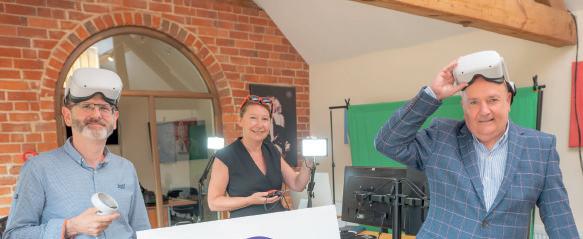
Meriden-based Hollywood Gaming has become a market leader in providing effects, working with the likes of Hasbro, Paramount Pictures, Sony and EA on games distributed by Sega Amusements to arcades and family entertainment centres around the world.
The business is led by directors Malcolm Barnes and Mark Evans and employs a handful of people who help make experiences come to life.
Now, after being supported by the University of Warwick Science Park’s Business Ready programme, the company is developing a new area of the business, Immersive Hollywood, where it plans to
open venues of its own, providing multisensory visitor experiences.
The company, founded in 2005, aims to raise around £800,000 of investment to launch the new business and is already scoping locations where it could open its own venue experiences.
Hollywood Gaming is working with a team of scriptwriters to help create the





narratives for the new experiences, which the company forecasts will cost around £30 per person to play.
The experiences currently being mapped out are a safari, alien invasion and dinosaur world. Each would use the same physical props but, by tailoring the VR and other 4D elements such as smells, motion and wind, every experience would be different despite happening in the same place.
“Hollywood Gaming is working with a team of scriptwriters to help create the narratives for the new experiences, which the company forecasts will cost around £30 per person to play”Mark Evans (Hollywood Gaming), Gaynor Matthews (Business Ready), Malcolm Barnes (Hollywood Gaming)
A planning application for a Gigafactory at Coventry Airport has been submitted by Coventry City Council and Coventry Airport in a joint venture partnership.
The proposals, first announced in February, are set to be determined by Warwick District Council and Coventry City Council.
The joint venture partnership was formed earlier this year to ensure the site is ready for investment and can
A Coventry trampoline park that suffered a major fire in 2018 which put it out of action for months, has received a £300,000 loan for the purchase of additional equipment and a new inflatable park section.
Red Kangaroo secured the finance from the Midlands Engine Investment Fund provided by The FSE Group, Debt Finance Fund and backed by the Coronavirus Business Interruption Loan Scheme.
The finance will allow the park to strengthen its facilities, offering more activities for young people in the area. The additional equipment will also enable it to create a layout that follows government guidelines which adheres to social distancing. The park’s reopening is restoring around 40 jobs across the park.
Paul Wrightman, Red Kangaroo
Founder, said: “Following the fire in 2018, our re-fit was put on hold last year due to Coronavirus. This funding has enabled us to complete the work on the park and create an exciting new area to offer even more variety.”
become operational quickly – making it much more attractive to potential investors.
If it gets the go-ahead, it will be powered entirely by green energy and will be able to recycle used batteries as well as building new ones.
The proposals would deliver 5.7 million sq ft of space for battery production and recycling, and could create 6,000 new jobs and tens of
thousands more in the supply chain.
Those behind the joint venture says that the West Midlands offers one of the most competitive sites for a UK Gigafactory.
A third of all cars produced in the UK come from the region. It is also home to Jaguar Land Rover, Aston Martin Lagonda and BMW battery research centre, the UK Battery Industrialisation Centre, which opened earlier this year.
A Coventry company which manufactures what it says is the world’s only completely electric London black cab, is aiming to raise more than £2 million on the crowdfunding site Seedrs.
The Dynamo Motor Company plans to recruit an extra 275 people, bringing its total team in the UK to 300.
The expansion will see Dynamo’s production of the all-electric black cab increase, and allow it to diversify into other mobility sectors that require wheelchair accessibility, as well as a last mile delivery van, adding to its zero emission line-up.
Brendan O’Toole, founder of The Dynamo Motor Company said: ““We’re on a mission
to change the way people move around the UK, especially in cities where pollution is a problem. In 2019, exactly 100 years since the first new post-war taxi was launched, we introduced the world’s first zero emission black cab.

“We have big plans to scale up our commitment to all-electric mobility conversions including an updated black cab and professionally and privately owned wheelchair-accessible vehicle conversions.
“We will also launch a van with a higher roof conversion that increases volume capacity and designed to offer couriers another option to help tackle the last mile deliveries in all major cities.”
IN ASSOCIATION WITH


Is technology so integral to our daily lives that we are in danger of taking it for granted?
Where would we have been during the pandemic without video conferencing and online delivery? Both are driven by sophisticated technology platforms which have become increasingly ubiquitous.
However, innovative technology serves a wider need than simply providing us with food, fashion and face to face communications in our own homes. It’s vital for the UK’s economic revival. Innovation creates more and better-
In its annual report for 2020, published in March this year, Tech Nation, the largely publicly funded scale-up accelerator, revealed that UK venture capital investment hit a record high of $15 billion in 2020, putting this country at number three in the world for tech, behind only China and the USA.
But well before the year has ended, 2021 knocked that figure out of the park. Last month Tech Nation revealed that start-ups and scale-ups raised £13.5 billion during the first six-month period, almost three times what was invested in the first six
paid jobs, enabling businesses across all sectors to grow, and improving UK competitiveness.
During the pandemic, many technology businesses seized the unique opportunity offered by fewer life distractions to invest in research and development to commercialise their ideas.
Across this region, from Worcestershire and the West Midlands into Oxfordshire, the Thames Valley and Swindon, Gloucestershire to Bristol, there are thousands of thriving innovative businesses.
months of 2020, creating 20 new tech ‘unicorns’ (companies worth more than $1 billion) in the process.
Tech Nation’s Head of Insights George Windsor, said: “We are in the midst of the fastest and most astonishingly high growth we’ve ever seen in the UK tech ecosystem.
“So much so that when it comes to the size of venture capital investment rounds, we are going to have to re-evaluate what we think of as being significant.”
Investment into UK tech in the first half of the year has almost exclusively been made into later stage companies in the form of ‘mega rounds’ valued at around £72 million ($100 million) or more. London
Business & Innovation Magazine is delighted to have published this Tech Centre Stage feature, showcasing 100 regional technology innovations, in conjunction with research from Beauhurst and other sources.

Many are developing unique technology and this feature highlights 100 which have been making waves recently. It’s been really tough to choose those to feature out of the thousands we know about. The listing includes companies which have received investment recently, and others which caught our eye. Some are prerevenue; others are already flying high.
has attracted the bulk of the investment overall, followed by Bristol, Birmingham and Cambridge.
With seed-stage investment falling as a proportion of all investment in recent years, UK tech would benefit from more money being re-invested into building local-seed stage systems, according to Tech Nation.
George suggests that the sector could switch its focus to helping the “misunderstood, poorly-assessed middle ground that gets the least attention.” He defines this as scaling companies with between 50 – 100 employees that are raising Series A rounds.
The development of new technology by a company intended to become part of the permanent, technological revolution. This technology could either be in the development of new products or services, or the development of new technology to deliver existing products or services in a new and imaginative way.
The pandemic has been harsh for many sectors, but not all. One that has thrived is the UK’s technology sector
The outcome should be better outcomes for consumers, businesses or both.
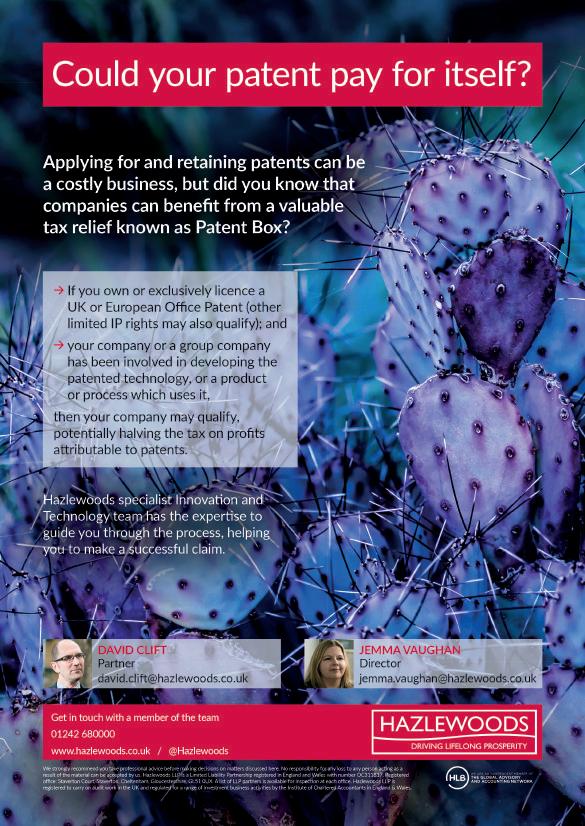
It’s not surprising that similar technology companies tend to congregate in the same location.
Many emerge as spin-outs from their local university, others are set up by those who have previously worked for successful organisations and tend to want to stay in the area.
Across our region, Oxfordshire is well known for its life sciences and space expertise, Warwickshire for its automotive excellence and Gloucestershire is becoming home to one of the largest cyber technology clusters in the UK, thanks to GCHQ being based there for the last 50 years.
Worcestershire is a hub for 5G technology and has a strong cyber community of its own, having been home to the government’s Telecommunications and Radar Establishment during the Second World War.
The Thames Valley and Bristol are both national centres for cloud computing, information tech and quantum computing with Bristol also celebrated for its creative sector and thriving robotics industry.
But to celebrate one cluster in each region is too simplistic. Gloucestershire and Worcestershire also have thriving agritech and manufacturing sectors, as does Coventry, and Warwickshire has an impressive gaming industry.
The Thames Valley is becoming a magnet for those seeking to invest in film studios, and greentech innovation is going on across the whole region.
The University of Oxford has driven more university spin-outs than any other UK university, according to Spotlight on Spin-outs, a report published in January by the Royal Academy of Engineers and research company Beauhurst.

There are many places to go for business support and each region has its own unique business support ecosystem.
Incubators support start-ups in their earliest stages, accelerators help the growth of existing businesses which already have a business model in place.
Both offer help through various means including providing access to mentors, seed and other investment funding.
For entrepreneurs who don’t know where to start, and don’t have the benefit of involvement with a university (where there is generally strong support within the university system), a good place to begin is their Local Enterprise Partnership.
The UK’s Local Enterprise Partnership network was established by government in 2010. Each is chaired by a businessperson with at least half of Board members from the private sector. This helps keep the focus on business.
England has 38 such Partnerships. Each helps drives economic growth through its activities. To support young businesses and entrepreneurs, every Local Enterprise Partnership has a Growth Hub, staffed with advisers who can help signpost any business to the specific information and support they need.
There are also many sector-specific tech start-up support organisations.

Midlands Engine www.midlandsengine.org
Solihull Greater Birmingham and Solihull Local Enterprise www.gbslep.co.uk
Greater Birmingham and Solihull Growth Hub www.gbslepgrowthhub.co.uk
Bristol Entrepreneurial Spark www.entrepreneurial-spark.com
Cloud Start-up Accelerator www.oracle.com/uk/startupl Bristol Robotics Laboratory www.bristolroboticslab.com
Creates www.sciencecreates.co.uk
Gloucestershire Farm491 www.farm491.com
C11 Cyber Security and Digital Innovation Centre www.glos.ac.uk/business-and-partnerships/ c11-cyber-security-and-digital-innovation-centre
Oxfordshire Oxford Bioescalator www.bioescalator.ox.ac.uk
Oxford Start-up Incubator www.innovation.ox.ac.uk/startupincubator/ The Hill, Oxford www.thehilloxford.org
Thames Valley Thames Valley Science Park www.scaleupberkshire.co.uk
Warwickshire Warwick Incubator www.warwickincubator.co.uk
WMG Accelerator, University of Warwick warwick.ac.uk/fac/sci/wmg/business/accelerator/
Worcestershire Betaden www.beta-den.com
Worcestershire was one of six government-backed testbeds launched in 2018 to explore 5G technology. The testbed focused on how 5G could help the use of smart factories, augmented reality and secure-by-design principles across both applications and network build and operation.
The research led to Worcestershire hosting the UK’s first 5G factory trials with local manufacturing giants, Worcester Bosch and Yamazaki Mazak.
Findings from the project revealed that up to two per cent efficiency gains in manufacturing can be possible through the adoption of 5G technology. At UK level these gains would be equivalent to £2.6 billion.
Following successful completion of the project, Worcestershire 5G consortium members, which includes Worcestershire County Council, the Local Enterprise Partnership, Malvern Hills Science Park and technology partner BT, along with
Ericsson, have transitioned the testbed into a sustainable model which will help businesses progress their ideas in a dedicated development area or directly alongside live manufacturing environments.
The first users of the testbed services are Worcester Bosch, QinetiQ, the County Council and technology accelerator BetaDen’s cohort 4, along with some BT account customers and businesses at Malvern Hills Science Park.

Thanks to major investment of close to £40 million by local councils and the county’s Local Enterprise Partnership, Gloucestershire is fast becoming a major UK hub for cyber. The county has been home to GCHQ for decades and is becoming a hub for increasing numbers of independent cyber security companies being set up by those in the industry which want to be co-located close to the UK’s top intelligence organisation. Cheltenham now refers to its wide cyber
ambitions and strategy as The Golden Valley development and home of Cyber Central.
The surrounding area already has a mature cyber infrastructure and connectivity and support from all its local colleges and universities, many of which have invested heavily in building facilities to train the cyber experts of the future. A new cyber park is currently being developed, along with around 3,700 new homes to support
the new workers who are expected to move to the region to build their careers.
In nearby Gloucester, the city is also supporting the county’s cyber ambitions and is already building a new £85 million digital quarter, transforming its rundown King’s Square into a mixed-use digital campus, which will include a cyber innovation hub.
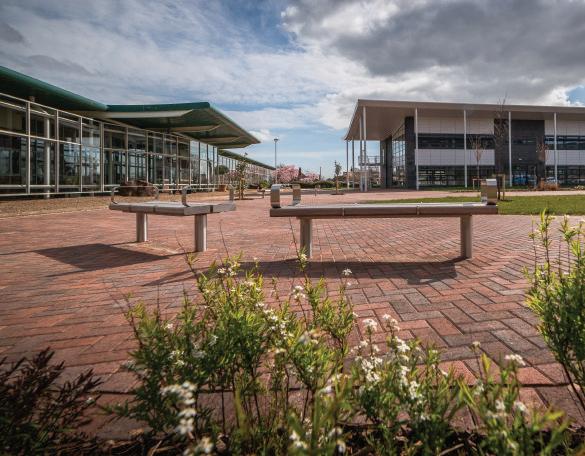
From Brunel and Concorde to robotics and virtual reality, Bristol and South Gloucestershire have long pioneered new technology. The region hosts the biggest aerospace cluster in the UK alongside financial, business and legal tech services and a world-renowned creative sector. From globally-recognised studios and broadcasters to smaller independent producers, businesses located there generate a huge range of content for all types of platforms, all over the world.
The region is planning a new Global Centre of Innovation Excellence and a new West of England Network of Living Labs to test and prepare new products and services for market.
The low carbon energy sector is also thriving in the region, where there are flourishing businesses and commercial expertise, alongside the aerospace and advanced manufacturing sectors. This expertise, together with digital skills and high-speed data infrastructure, means that the West of England is well placed to take up the opportunities of Smart Energy Technology, and benefit from the opportunities arising from the global transition to clean growth.

Coventry and Warwickshire is a globally important hub in low carbon technologies and the advanced manufacturing and engineering sector, with business and research links across the world, supported in no small part by the University of Warwick.

Companies in the advanced manufacturing and engineering sector directly employ around 34,000 people locally, accounting for 10 per cent of employment – 57 per cent greater than the UK average overall and 500 per cent greater than the UK average for the automotive industry, according to the Local Enterprise Partnership.
Globally recognised brands such as Jaguar Land Rover, Tata and Aston Martin continue to be drawn to this area, in part due to its world-class research, development and innovation facilities and one of the strongest education, skills and apprenticeship provisions in the UK. In turn, they invest millions back into the region.

Ground-breaking battery technology and future mobility are at the core of the Electrification Taskforce that Coventry and Warwickshire Local Enterprise Partnership set up to ensure greater connection between sectors as well as recognising the need for upskilling for the future of the economy.
The £130 million UK Battery Industrialisation Centre (UKBIC) near Coventry, a pioneering concept in the race to develop battery technology, opened earlier this year and Coventry Airport is bidding to become home to the Midlands’ first Gigafactory.
Ambitious plans to run a battery-powered Very Light Rail transit system on the road network in Coventry are progressing. NP Aerospace has been appointed as the assembly contractor to join WMG at the University of Warwick and Transport Design International (TDI) which are partners on the innovation side of the project, being led by Coventry City Council.
Malvern Hills Science Park
Harwell Campus with its outstanding science and technology facilities, Culham Science Centre, home to the UK Atomic Energy Authority, and HR Wallingford – a major centre for ecology and hydrology, are the cornerstones of arguably the UK’s strongest technology-led ecosystem.

Alongside many private companies, Harwell hosts the Rutherford Appleton Laboratory, the Faraday Institution, Diamond Light Source synchrotron, the soon-to-open Vaccines Manufacturing and Innovation Centre, the UK’s Satellite Applications Catapult and European Space Agency. The government is also building a £93 million National Quantum Computer Centre at Harwell, due for completion in early 2023.
Culham Science Centre also hosts many private companies, including Reaction Engines, which aims to make space and hypersonic travel more efficient. This exciting and innovative company rubs shoulders alongside the government-funded RACE (Remote Applications in Challenging Environments) programme and Spherical Tokamak for Energy Production (STEP) project, which is building a prototype fusion energy plant.
There are privately owned vibrant sciences parks across the county, including Milton Park, The Oxford Science Park and Oxford
Technology Park. For the sixth consecutive year the University of Oxford has been named as the world’s top performing university in the Times Higher Education rankings, and boast’s the highest number of university spin-out companies.
The county has ambitions to be a global leader in transformative technologies such as digital health, space-led data applications, autonomous vehicles and quantum computing. The Oxfordshire Life Sciences and Healthcare cluster spans a whole range of life sciences enterprises with world-leading research and teaching powering new innovation.
The Oxford Thames Valley region is home to hundreds of digital health companies. And with the UK market for digital health estimated to already be more than £2 billion, this sector could create more than 33,000 jobs in Oxfordshire alone by 2030.
The number of space-related organisations in the UK has increased to 1,218, according to government, and Harwell is home to more than 105 of them employing more than 1,000 people. Across the South East there are more than 300 space companies (with 125 in the South West and 51 in the West Midlands).
The Oxford Robotics Institute kick-started the UK’s autonomous cars programme in 2010. Oxbotica was created in 2014 as a spinout of Oxford University and is now leading the UK development of autonomous vehicles on public roads.
Oxford PV’s next-generation perovskite solar cells have broken the world record for solar energy conversion – a huge step towards efficient and affordable solar energy, and two of the three UK energy system demonstrators, Energy Superhub Oxford and Project LEO, an ambitious smart grid trial, are based in the county.
 Harwell Campus
Harwell Campus
Swindon and Wiltshire’s Local Enterprise Partnership has seen investment into the area from science companies. Beckton Dickinson is expanding its manufacturing capacity for syringes and drug delivery systems in Swindon, and Thermo Fisher Scientific’s Pharma Services is also expanding. The Dyson Technology Campus based near Malmesbury is also home to the Dyson Institute of Engineering and Technology.
A 100-megawatt battery storage project near Swindon opened this year. Controlled by Shell-owned Limejump, Europe’s largest battery will help balance the UK’s energy demand, with the capacity to provide electricity for up to 10,000 homes in a 24-hour period before being recharged.

Westcott Venture Park in Aylesbury Vale’s Enterprise Zone is now a centre of space propulsion, satellite technology and environmental engineering. Building on Buckinghamshire’s significant strengths in the space sector, it has a primary cluster of UK space organisations based at The Westcott Space Cluster.
New facilities at the Westcott Enterprise Zone include an Innovation Centre, a 5G Step-Out Test Facility and Incubation Centre, and work has begun on a Disruptive Innovative Space Centre for apprenticeships and specialist testing. Managed by the Satellite Application Catapult these provide incubation and R&D facilities for businesses in the space sector. The recent completion of the UK Space Agency’s National Space Propulsion Test Facility at Westcott is another step towards the site’s space ambitions and opens new opportunities to attract more businesses and investment to the site.
Berkshire’s seven major towns contribute to its strength in key industries, such as digital technology and life sciences. Those industries are supported by anchor institutions, including the University of Reading, Royal Berkshire Hospital and the Atomic Weapons Establishment (AWE).

According to the Thames Valley Berkshire Local Enterprise Partnership, the county’s economy is set to grow in key sectors such as technology, engineering and science, business and finance, healthcare and sales. The digital technology sector is already responsible for nearly a quarter of Berkshire’s economic output, compared to seven per cent nationally.
In Bracknell, there is a vision to create a cluster for agri-tech with the global agri-tech company Syngenta as the anchor institution.



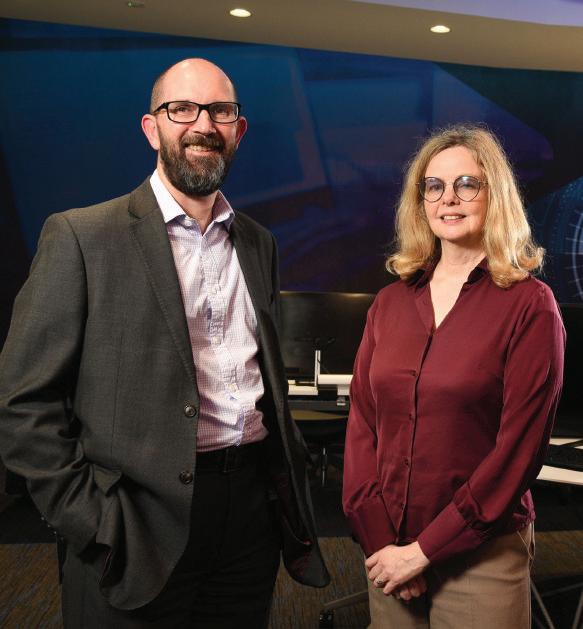
Should you talk about your idea or not? It’s a conundrum for entrepreneurs who have come up with a new idea and need support and investment to make it a reality.
Talking about the idea to anyone at all could prevent you protecting it because by doing so you’ve put it in the public domain. Not talking could mean the people you need to help grow the business may not get to hear about it.
Sarah Kenshall at BPE Solicitors said: “Since the key asset of any technology company is the strength of their intellectual property (IP) rights, they can only talk about their ideas in general terms for fear of invalidating these rights. Once ideas are out there with no protection, there’s no going back.”

For example, in the world of programming, while copyright subsists in the expression of the idea, there is nothing to stop others expressing the idea in another manner. Equally, in the world of algorithms, absent patent protection – how the algorithm is structured and calibrated, needs to be kept confidential otherwise anyone can use the information.

David Clift at Hazlewoods added: “A big issue with earlystage companies is patenting. Some smaller companies don’t understand what patentable ideas they have and how they should protect them. They can also be reluctant to take advice because they think it’s going to be expensive to safeguard a patentable idea formally.”
But it could be a lot more costly not to invest in protecting your idea early on, and even scupper your chances of taking an idea to market at all.
Our experienced legal and finance experts discuss how technology start-ups and scale-ups can make a success of their businessSarah Kenshall is a partner specialising in fintech, technology and intellectual property at BPE Solicitors.
David said: “Various examinations have identified that on average, around 80 per cent of the value of a business relates to its intangible assets. Clearly this figure is likely to be higher for a technology or innovation company.
“As this intangible value often doesn’t get reported anywhere, it’s difficult for investors or lenders to see the value in a company if it’s not highlighted.
“An entrepreneur should consider identifying and formalising their intangible assets, so investors can spot them more easily and appreciate their potential value.”
Other companies at the formative stage will realise they need protection and download a non-disclosure agreement (NDA) from the internet. But many are not worth the paper they’re written on, warn Sarah and David.
Sarah said: “Template NDAs downloaded from the internet seldom cover key things which need to be protected. There are three key elements to an NDA: they should identify the confidential information in question, they should control any onward disclosure of the information, and they should control the purposes for which the information is used.
“Three simple things. But many template NDAs fail to cover these properly.”
David added: “Entrepreneurs can be having conversations with potential investors or other experts thinking they are protected. The reality is they are potentially giving away confidential information.”
And that’s a particular problem for technology companies.
“Tech companies are usually high growth,” said Sarah. “They will be knowledge-based businesses and their IP is their crown jewels, it’s what powers them.”
What is the difference between an ‘IP asset’, which is the actual work created, and an ‘IP right’ which is the means by which that work can be legally protected?
“The distinction is often lost in practice and can lead to confused thinking,” said Sarah. “To a certain extent, many technology companies already have the benefit of automatically occurring IP rights,” she added.
“Much of the coding creating the infrastructure of our new digital world is already protected by copyright. If you have created, say, a specific set of software functionalities you own the copyright.”
But that might not be the case for one of the largest growth areas in the technology sector: algorithm development.
“You may be able to get patents for an algorithm, but it’s not straightforward,” explained Sarah.
“And there is societal benefit to protecting algorithms through patent protection, where possible, because you can then disclose how they work which in turn helps the whole innovation process. If you can’t get patent protection for algorithms, and as I said it is complicated, you should not disclose their workings. This will make it tricky when you are trying to interest earlystage investors. A properly formed NDA will be crucial here.”
While many entrepreneurs might think their idea is ground-breaking, it might just be that someone’s got there before them. So if you think your idea might be patentable, it is worth consulting a patent attorney.
“An early conversation with a good patent attorney could throw up information an entrepreneur might not be aware of,” said David. “Perhaps a direct competitor is doing the same thing, or they might find there is already a very similar product in the market.”
Advice and perspective from others in the innovation space can also help here. While customers and other business partners may be prepared to settle for contractual statements on the status of IP rights, potential investors will want to look at the
assets and reassure themselves that the IP rights do belong to the company before they make an investment.
Sarah said: “There are lots of innovation networks, including early-stage ones such as SETsquared. Investors participate because they like to keep an eye on what’s happening so they can get in early if they want to invest.”
SETsquared is a collaboration between five research-led UK universities – Bath, Bristol, Exeter, Southampton and Surrey. It offers support programmes to help turn ideas into businesses. There are many similar organisations across the region.

Sarah has been a SETsquared mentor and David regularly attends SETsquared meetings, along with other professionals and investors. He said: “It may be an investor is not ready to invest but is happy to offer advice to young companies. Business professionals such as Sarah and I are happy to do the same.”
Sarah agreed: “In the UK we have a strong business network and are good at facilitating discussions through them.”
And the relatively recent phenomenon of certain sectors clustering in key locations (such as cyber in Gloucestershire and Worcestershire, medtech and pharmatech in Oxfordshire, infotec in the Thames Valley, automotive in Warwickshire and fintech, creative and robotics in Bristol), help a young company seeking support because potential investors already understand a particular area of technology.
Many early-stage companies will selffinance, but when they begin looking for funding, tapping into the right networks can offer them access to interested and engaged investors.
Sarah advises young companies to be prepared. “Make sure as you go along you are ahead of the game. Before you go looking for finance, make sure your IP assets are properly protected.
“If you don’t, it can make the investment process much longer, or scupper it completely. Ask a professional’s advice. At the early stages, this is not going to be expensive.”
David added: “Timing is also key for companies seeking investment. Investors will ask where the company sees its potential markets and whether their idea is protected in that market or geography.
“Again, when you’re looking for finance and investment, it all goes back to protecting your IP early.”
Sarah said: “If you’re looking at a global strategy, you need to ensure you have secured the necessary IP rights in all the relevant jurisdictions, and timing is crucial for that too, particularly as regards patents and trademarks.”

Many entrepreneurs start by seeking funding from friends and family. It can allow them time to develop and derisk their innovation without investors breathing down their neck or demanding too much equity in the business.
However, if not accepting external funding early means you could miss a market opportunity, sometimes it’s
worthwhile giving away a bit more to get out there early.
Later in a company’s development there are government tax incentive schemes tailored specifically to innovation and technology companies, such as the UK’s successful R&D tax incentives and Patent Box.
R&D tax credits help companies with the costs of their innovation and development and are now fairly well understood, although they could be about to experience an overhaul after a recent government consultation exercise is completed. The Patent Box tax incentive, however, is still not very well-known but can be immensely valuable.
Patent Box helps companies once they’ve got beyond the development stage and are starting to make money from their patented technology. It is intended to provide further encouragement for innovative companies to stay in the UK by allowing them to reduce the amount of UK tax they pay on their worldwide profits from exploiting the patented IP. Clearly, with a lower UK tax liability, the company has more to reinvest into further development.
David said: “Some big winners from Patent Box are software tech companies because the bulk of their development cost is often incurred upfront. Once they’ve developed their software, they often have a relatively low-cost base which works well for Patent Box. These tax incentives mean they pay closer to 10 per cent instead of 19 per cent in corporation tax.”
And that’s attractive to investors who want to put their money into a company without a big tax burden.
Of course, it’s not just investment a company needs, although that’s key in the early stages. Right from the beginning the business must plan how it’s going to take its product to market.
Sarah said: “Companies may have a couple of rounds of investment under their belt but are not yet profit making. Sometimes they get so involved in building the tech, they forget they’ve got to sell it. My advice is, don’t wait until your product is totally ready, you need to build in sales from the beginning. Get out there.”
David.Clift@hazlewoods.co.uk
Sarah.Kenshall@bpe.co.uk
AIS (Advanced Innergy Solutions) Ltd
assistive devices that enhance the human body.
gas imaging camera to help cut methane leaks in oil and gas industry
market owners
Bennion, CEO Advanced materials company developing insulation and passive fire protection systems
engineering Amiosec Ltd
Cunningham Co-founder and CTO
Chronos Technology Ltd
Genomekey (Genomic Labs Ltd)
Fuels Ltd
and rapid product developments incorporating new and emerging technologies

Prince, Founder and CEO Software allowing people to visualise themselves as they age
Prof Charles Curry Managing Director GPS jamming and interference detection and geolocation
Dr Michael Roberts, Co-founder and CEO
Hygate, Founder and CEO
Gleave, Managing Director
Pope, Co-founder & MD
DNA sequencing and AI to diagnose bacterial presence, species and antimicrobial resistance
enewable fuel technology
software
fleet management and vehicle security software
technology

Isansys Lifecare Ltd
Metaboards Ltd
Navtech Radar Ltd
2010 Keith Erry, Co-founder and CEO
2016 Prof Chris Stevens, Founder and Director
1999 Phil Avery, Managing Director
Health tech company
Technology to enable electronic devices to be powered across large surfaces without alignment
Radar technology designed for applications where safety is essential
Navenio Ltd 2015 Tim Weil, CEO Deployment of AI to implement workforce solutions
Oxehealth Ltd 2012 Hugh Lloyd-Jukes, Chairman and CEO
Oxford Nanopore Technologies Ltd
Contact-free vision-based patient monitoring for use in hospitals (mental health) and nursed facilities
2005 Dr Gordon Sanghera, Co-founder and CEO Genetic sequencing technology
Oxford Biomedica plc 1996 John Dawson, CEO Gene and cell therapy group
Diffblue Ltd
Reaction Engines Ltd
Rezatec Ltd
Spintex Engineering Ltd
2016 Mathew Lodge, CEO
Creators of the world’s first AI for code solution that automates writing unit tests for Java
Healthtech
Manufacturing/ engineering
Computing/ technology
Computing/ technology
Healthtech
Manufacturing/ engineering
Biotech
Computing/ technology
1989 Mark Thomas, CEO Developing a Synergetic Air-Breathing Rocket Engine (SABRE ) to make space travel more efficient Spacetech
2012 Patrick Newton, CEO Geospatial data analytics
2018 Alex Greenhalgh, Co-founder and CEO
Ultromics Ltd 2017 Ross Upton, Founder and CEO
Altitude Angel Ltd 2014 Richard Parker, Founder and CEO
Manufactures biodegradable textile fibres for use in fashion and high-performance materials
Machine learning helping to diagnose heart disease
Platform to allow Unmanned Aerial Vehicles (drones) and manned aircraft to operate in shared skies
Computing/ technology
Manufacturing/ engineering
Computing/ technology
Computing/ technology
Anthropos Digital Care Ltd 2016 Jim Patience, CEO Connected care platform that enables intelligent remote monitoring of older people Healthtech
Arkivum Ltd 2011 Chris Sigley, CEO
Carbon ThreeSixty Ltd 2017 Ed Allnutt, Co-founder and MD
Dynium Inc
Ecrebo Ltd
Emortal Ltd
Flare Bright Ltd
IMMJ Systems Ltd
Occuity Ltd
Recycling Technologies Ltd
2016 Charles Kirby, CEO
Software, services and domain expertise for long-term data management and archiving
Design and manufacture specialists of advanced Composite Structures

Robotics to help farmers digitise their orchards to provide insights on crop yield and fruit sizing
2010 David Buckingham, CEO Turns receipts into precisely-targeted, high return on investment marketing
2007 Colin Culross, Founder and CEO Digital photographs storage
2015 Dr Kelvin Hamilton, CEO
Aerospace company developing autonomous drones
2015 Michael van de Weg, CEO Enables the rapid digitisation of clinical content for use at the point of care
2019 Dr Dan Daly, Co-founder and CEO
2011 Adrian Griffiths, Founder and CEO
Design of non-contacting optical instruments for use in healthcare diagnostics and monitoring
Computing/ technology
Manufacturing/ engineering
Agritech
Consumer
Computing/ technology
Spacetech
Healthtech
Medtech
Modular technology can be mass-produced to recycle plastic waste into feedstock for new plastic Energy
Shepherd Network Ltd 2015 Stephen Chadwick, CEO Asset and property performance management
Sky Medical Technology Ltd
Wysa Ltd
2006 Bernard Ross, Founder and CEO
2018 Jo Aggarwal, Co-founder and CEO
Develops bioelectronic medicine for clinicians who treat vascular related conditions
AI app as an early intervention and support tool for mental health
Computing/ technology
Healthtech
Healthtech
Joseph Healey, Co-Founder and CEO
Patented technology uses motion to deliver an innovative new way to measure
Synthetic biology for targeted drug delivery of therapeutic proteins and peptides
CEO Leading provider of payments systems to the education market

Portman, Founder and CEO
Whatmore, Co-founder and CEO
Trading as Boulevard Online - online software and e-commerce platform
Software helps unlock access to suitable locations for drone use by bringing pilots and landowners together
Using data tracking technology, this insurance broker alerts users when their insurance needs to change
Founder and CTO Manufacture and installs smart EV chargers
Goodyear, Co-founder and CEO
Ferromagnetic detector for the safety of patients and systems in MRI facilities and other settings
system that builds intelligence into hazards on construction sites
technology
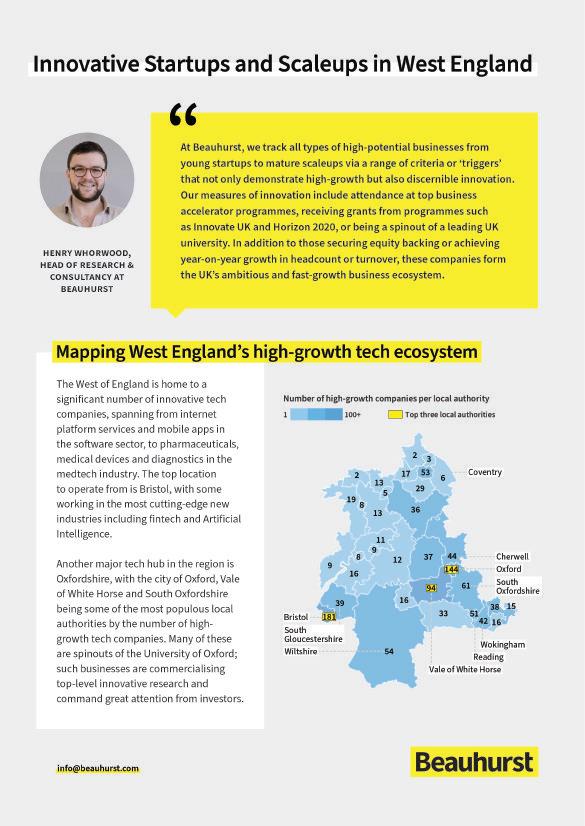
Air traffic is responsible for around three per cent total of global carbon emissions. A single flight produces three tons of carbon dioxide per passenger, but the challenges associated with green flight are considerable.
One company says it is well on the way to building the world’s first commercial hydrogen-electric plane. In 2020, ZeroAvia, based at Cotswold Airport near Cirencester, completed the first test flight powered solely by a hydrogen-powered fuel cell. The six-seater Piper Malibu flew for eight minutes on fuel cell power alone. It reached a height of 1,000 feet and an airspeed of 100 knots (115 mph). For the first time the world could see the potential of hydrogenelectric powered aircraft which emits just water vapour during flight.

A lot of people are excited about this technology and ZeroAvia has attracted investment from British Airways’ owner IAG Group and others.
ZeroAvia was established in California in 2018 by Dr Val Miftakhov. A pilot of fixed wing aircraft and helicopters, Dr Miftakhov
is a sustainable transport entrepreneur. He was a head of R&D at Google in California for six years before founding tech company eMotorWerks to develop smart grid electric vehicle charging technologies.
ZeroAvia moved to the UK, where the project is headed by Sergey Kiselev, Vice-President of ZeroAvia and best friend of Dr Miftakhov.
By 2026, the company is aiming for a 500mile range in aircraft with up to 80 seats increasing by 2030 to more than 1,000-mile range flights in aircraft with 100 plus seats – enough to fly commercial aircraft to the South of France, guilt free.
And flying carbon free might not be more expensive, according to Sergey.
“A 50-70 seat turbo prop will be able to compete financially with a small jet. And given that the cost of carbon emissions is increasing and the price of hydrogen dropping, the advantage will get greater.”
ZeroAvia has secured total private funding of close to £40 million. But for a groundbreaking project such as this, private funding isn’t enough.
The company’s expanding UK operations are partially supported by a grant from UK’s Aerospace Technology Institute and Innovate UK, and ZeroAvia is part of the UK Government’s Jet Zero Council.

“Aviation is rightly a highly regulated industry and as we develop new technology, we need government regulatory support as well as private investment,” said Sergey.
“We found the UK was the best in terms of getting the programmes for the companies like ours funded.
“It’s the combination of the ease of securing investment money from government and the flexibility in how we can spend it, as long as we spend it on research and development. It also helps that the UK has a mature aerospace industry and talented people.
“All our engineers are UK based and worked in aerospace or automotive before.”
The appetite for investment in hydrogen power is growing.
Coupled with the current government appetite to invest in green technologies, the future could be clear blue sky for ZeroAvia.
ZeroAvia has proved that hydrogen-powered flight is possible. The challenge is now scaling up to make it commercial
In November last year, Boris Johnson put forward his Ten Point Plan for a Green Industrial Revolution. It aims to mobilise £12 billion government investment to create and support hundreds of thousands of skilled green jobs, and spur more than three times as much private sector investment by 2030. With all eyes looking to the 2021 United Nations Cop26 Climate Change Conference this November, we highlight companies across the region developing sustainable technologies
Designs and builds aeroponic technology and farm management software for indoor and vertical farms to help reduce the waste and carbon footprint of fresh produce by enabling more people to grow food nearer the point of consumption.
In January last year, the company raised £2.35 million to build an aeroponic research centre, scale existing technology, deliver on growing sales pipeline and accelerate new product lines to market.
Aeroponics is a method of growing plants without soil. Instead, roots are suspended
in the air and irrigated with a nutrient-dense mist. This differs from hydroponic systems where plant roots are regularly submerged in a nutrient-rich solution. In aeroponics, the roots have greater access to oxygen, which results in healthier plant root stock and significantly faster crop growth rates.
LettUs Grow says its aeroponic systems can grow up to twice as fast as hydroponics. This is based on comparing crop productivity in its own systems with yields made publicly available, by directly comparable hydroponic systems.

A fast-growing electric vehicle and smart energy technology company developing innovative charging and energy storage solutions for home and commercial use.

In February, the company secured a £6 million investment from the Clean Growth Fund and Gulf Oil.
Indra’s smart chargers can be used by all electric vehicles. They use a standard residential electrical connection and allow users to charge their vehicles during off-peak times, when grid carbon intensity is at its lowest. The Clean Growth Fund
and Gulf have become shareholders in Indra, alongside OVO Group, which provided seed capital and technical support to Indra in 2017 via Kaluza, its technology business. That took it from a fledgling technology start-up to building the world’s first domestic Vehicle-to-Grid (V2G) charger and exporting its technology as far as Australia and Taiwan.
Through Kaluza’s smart charging capability, Indra says its V2G chargers are the first to provide grid flexibility in the UK, supporting grid balancing as more renewable energy and higher demand affects the system.
 LETTUS GROW LTD, BRISTOL
LETTUS GROW LTD, BRISTOL
Recycling Technologies Ltd is aiming to accelerate the evolution of plastic into a more sustainable material. Currently, 88 per cent of the plastic used in the world is either buried, burned or leaked into the environment. This means that the world recycles only 12 per cent of the 359 million tonnes of plastic produced each year.

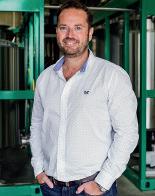
The company’s innovative technologies turn hard-to-recycle plastic waste including polystyrene and flexible packaging into feedstocks for new plastic production. Its first commercial product, the RT7000, is modular and small-scale.
It can be installed at existing waste sites anywhere on the globe to help divert plastic waste away from landfill, incineration and leaking into our environment.
In April, the company was announced as the technology partner to work with global materials companies Ineos Styrolution, based in Germany and USA-based Trinseo, as they develop plans to build commercial polystyrene recycling plants in Europe.
Recycling Technologies’ solution provided the highest yields in the conversion of polystyrene to styrene monomer, an

industrial chemical and important raw material for making many modern plastics and synthetic rubbers, and provided the most scalable solution.
Before building commercial scale recycling plants, a polystyrene recycling pilot plant will be built in the UK next year. This will provide the data needed to support development of the commercial scale recycling plants. INEOS Styrolution plans to build a commercial scale recycling facility in France. Trinseo wants to build its own plant in Belgium, which is expected to be operational in 2023.
Green Fuels is the world’s leading distributed-scale biodiesel and advanced biofuels company. The company, which has been turning used cooking oil into biodiesel for years, has also been pioneering the technology and chemistry of sustainable fuels since 2003.
Waste-derived biodiesel is one of the most carbon-efficient fuels available, and Green Fuels equipment has displaced an estimated 6.5 million tonnes of carbon emissions (CO2 equivalents) to date.
During the pandemic, the UK’s engineering companies rose magnificently to the challenge. Companies across the region which usually made parts for aircraft or the automotive sector collaborated with those in the medical sector to design and manufacture ventilators and other equipment. Now this same Esprit De Corps is being focussed on new technology for the 21st century and beyond
Spintex designs and manufactures biodegradable textile fibres for use in fashion and high-performance materials. By learning from nature Spintex is creating new products, materials and processes that solve fundamental sustainability challenges.
Spiders create one of the world’s strongest and most adaptable materials— spider silk. The secret to a spider’s ability to create silk lies within their spinnerets, specialised organs that turn the liquid silk gel held in the spider’s abdomen into a solid thread. After years of research into

this unique mechanism, Spintex managed to mimic the spider’s amazing ability. The company has created a process to spin textile fibres from a liquid gel at room temperature, with water and biodegradable textile fibres as the only outputs. The textile industry is searching for sustainable technologies that will reduce waste, greenhouse gas emissions and pollution, and enable a circular economy. Spintex says its technology could replace not only silk used in fashion, but also oil-derived synthetic fibres. The company estimates that its process is 1,000 times more efficient than equivalent synthetic fibres.
In June the company won $100,000 from a Montana, USA-based not-for-profit which supports nature-inspired solutions for a health planet.
Coventry-based Aurrigo is a global leader in the development of autonomous vehicles for use in the automotive and aviation sector.

Operating from its advanced engineering centre, the company designs, develops and manufactures its Auto-Pod, Auto-Shuttle and Auto-Dolly, delivering first and last mile transport solutions for city centres, shopping centres, airports, university campuses and theme parks.
The business recently completed a world first when its shuttle became the first in the country to undertake testing of a custom-made autonomous vehicle capable of carrying passengers on a main road surrounded by other traffic.

Metrasens products are designed to address deficiencies in conventional screening methods, to make society safer and more secure. It takes science from the laboratory and uses it to create revolutionary products which meet real needs.

An advanced materials company, AIS designs, engineers and manufactures insulation and passive fire protection systems, as well as buoyancy and SURF (subsea, umbilicals, risers and flowlines) products. Its products deliver mission-critical solutions for the energy, industrial, automotive, chemical and marine sectors.

Since 2007 the company has secured more than 100 patents on its products and in the last three years, AIS has significantly increased its market share in new energy markets, offshore wind and more recently automotive. The company, which has won numerous Queen’s Awards for Enterprise Awards as well as other accolades, puts innovation at the forefront of its work, investing up to 10 per cent of its annual revenue in research and development.
You might think this company belongs in our medtech pages, but Oxford Nanopore Technologies has a big manufacturing facility.
The company develops portable DNA and RNA sequencing devices, and its ambition is to be a global company that enables the analysis of anything by anyone, anywhere.
The last year has been transformative for Oxford Nanopore Technologies including supporting users around the world to sequence the virus that causes Covid-19, facilitating continual surveillance of the virus. It said that around a fifth of the SARS-CoV-2 virus genomes in the global database GISAID were generated on one of its devices, with nanopore data uploaded by scientists from more than 85 countries. The role of genomics in infectious disease is now better understood.
The company makes detection systems for a range of facilities, from medical to prisons and to support anti-terror strategies. Its innovations can detect the tiniest scrap of ferrous metal on - or inside - a human body.
In April, the company launched its next generation detection system, Cellsense Ultra with Xact ID intelligent detection technology. This reimagined detection system features expertly designed software algorithms and machine learning to boost all-around detection performance while introducing data collection, reporting, and systems integration.
In May, the Oxford Science Park-based company raised a further £195 million in a pre-IPO funding round and is now preparing for a initial public offering on the London Stock Exchange.
Having begun to sell its first commercial device, the MinION portable DNA/RNA sequencer, in 2015, it was declared a “unicorn” (a company valued at more than $1 billion), in 2018.
In 2019 the company, which was originally spun out of Oxford University, opened a high-tech manufacturing facility at Harwell Campus designed to scale up high quality production capacity.
It has since expanded its product range to include both even smaller formats and larger high throughput sequencing devices suitable for population-scale human genomics.
Oxford Nanopore’s MinIONThe year 2020 was a new record year for cybersecurity investment in the UK. The sector has been a major industry success in the UK in recent years, attracting large amounts of private and state-backed investment. The sector is now worth an estimated £8.9 billion and employs around 50,000 people, according to governments statistics

And this success isn’t in cyber alone. Between 2010 and 2020 investment in the UK’s tech industry grew from £1.2 billion to £11.3 billion, with most of this increase taking place since 2015 when investment was £4.1 billion according to figures from the government’s Digital Economy Council and data intelligence company Dealroom. Last month Tech Nation revealed that start-ups and scale-ups raised £13.5 billion during the six-month period, almost three times what was invested in the first six months of 2020.
Ultraleap develops hand tracking and mid-air haptic technologies that allows users to engage with the digital world naturally – without touching surfaces. No touchscreens. No controllers. No keypads.
A useful technology in avoiding physical contact to reduce the threat of passing on, or picking up Covid-19.
Haptics is the science of transmitting and understanding information through touch. Examples of haptics are the vibration in a mobile phone or the rumble in a game controller, but there are many applications
from wearables, AR/VR experiences, digital out-of-home advertising to automotive infotainment, military and industrial simulation. Ultraleap was formed when Leap Motion and Ultrahaptics came together in 2019, uniting the world’s most advanced hand tracking with the only haptic technology that creates the sensation of touch in mid-air.

Founded in 2014 and born out of The University Oxford, Fuel3D develops advanced 3D scanning solutions using its proprietary algorithms, software and 3D hardware platforms.
Fuel3D aims to apply its 3D imaging technology to help companies solve some of the world’s largest problems. The company is highly experienced in 3D imaging and computer vision technologies, holding granted and pending patents in stereo-photogrammetry, thermal imaging and 3D facial reconstruction.
It has applied its 3D imaging technology and expertise in the medical imaging sector since launching, where accurate 3D models provide the basis of improving understanding and treatment. It has since diversified into other sectors, including the industrial and aviation sectors, helping develop new products and manufacturing processes and in the consumer market, where its technology platform, FitsYou, provides unique 3D imaging and analysis of consumers. Fuel3D also offers 3D technology to the security and monitoring sector.
The two key issues for farmers operating in the fruit producing sector are product consistency and supply reliability. When sourcing fruit, buyers, co-operatives, packhouses, processors and supermarkets want both.
Dynium has taken techniques developed for driverless cars – computer vision, image analysis, machine learning – and applied this its own, in-house yield-analytics algorithms to develop an autonomous, digital orchard management system.
Ripjar’s cyber security technology helps leading institutions and government agencies address criminal threats, including money laundering, fraud and terrorism. It uses its proprietary artificial intelligence technology Labyrinth to uncover new risks and it reduces false positives by more than 90 per cent, says the company. Labyrinth enables human analysts to make better informed decisions with speed and accuracy, saving significant cost and time for its clients.
Founded in 2013 by five former employees of GCHQ, Ripjar has grown rapidly to become a world-leading data intelligence provider. During COVID-19 the business doubled in size and has significantly expanded its product offering. The pandemic has further accelerated the need for technology to tackle systemic vulnerabilities that have become more evident as businesses and public sector organisations shift to remote digital working.
In September last year, Ripjar raised £28 million in funding from Long Ridge Equity Partners, bringing the total the cyber security company has raised to day to more than $60 million.
The big oil and gas companies have pledged to significantly reduce their methane emissions, but no-one is measuring methane properly, continuously, and at scale, says QLM Technology.
Its camera uses quantum technology to “See the invisible”. It will help reduce the amount of methane which escapes into the atmosphere through leaks that are both costly to the oil and gas industry and damaging to the environment.
QLM Technology was founded by its Chief Technical Officer, Xiao Ai, after postgraduate research into single photon Lidar gas detection at the University of Bristol. He realised that his research, in which a Lidar beam simultaneously probed both the shape and the concentration of plumes of methane, could help achieve Net Zero through mitigation of greenhouse gas emissions.
With Dynium’s CropScout robot, growers can easily and accurately estimate the amount of fruit they have available to sell.
CropScout further improves orchard productivity by detecting disease and monitoring irrigation.
Dynium was established in 2016 by Charles Kirby, who graduated from Warwick University with a degree in electronic engineering.
He began working for a motorsports engineering firm at Silverstone. From a fruit-growing family, he recognised the labour issues facing farmers: recruitment,
In April, QLM secured a total of £3.1 million of seed funding investment. The investment was led by the Green Angel Syndicate and includds the Enterprise100 syndicate, the Newable Venture Fund, the Development Bank of Wales, the Bristol Private Equity Club, Britbots Seed Fund, and Houstonbased oilfield technology solutions provider ChampionX. The investment is driving the expansion of QLM’s technical and commercial capability.

skills retention and unemployment costs, and saw that he could apply his experience developing automotive networking products to improve the sector.
The company has a development farm in Herefordshire, one of the UK’s prime fruit and cropping regions.
Both sectors are thriving in the UK. In July the BioIndustry Association reported that biotech shares on the London Stock Exchange continued to out-perform the wider market in the first half of 2021 as international investors were drawn to the UK’s strong science and high-quality companies.
It’s been a rollercoaster of a year for Oxford BioMedica. the leading gene and cell therapy group which is manufacturing the AstraZeneca vaccine at its Oxford facility.
The company only opened its new 84,000 sq ft manufacturing facility in late 2019, with the expectation that it would have one or potentially two of the manufacturing suites approved during 2020. Then the pandemic struck, and in April that year the Group joined the Oxford Vaccine Consortium and signed agreements with AstraZeneca for Covid-19 vaccine production. By October the Group had four manufacturing suites approved by the MHRA, three contracted by AstraZeneca to produce its vaccine.
Oxford BioMedica was founded in 1996 as a spin-out from the University of Oxford’s Department of Biochemistry. The company listed on AIM in December 1996 and moved to the main market of the London Stock Exchange in April 2001.
As one of the original niche specialists of gene and cell therapy, Oxford BioMedica has built an industry-leading position with its unique LentiVector lentiviral vector delivery platform.
According to government sources, The UK medical technology sector generates an annual turnover of approximately £19.5 billion each year, with clusters of activity particularly in the South East and the Midlands. The sector employs more than 102,000 people across the UK.
In March, this University of Warwick spinout company was awarded £300,000 from InnovateUK to build on research in the development of new ways to protect precious biological materials during the freezing process.

Transforming how cells and cell-based therapies are stored and transported will help to improve oncology, diagnostic, medicines discovery and the current challenges of distributing Covid-19 vaccines.
In order to store and transport cells for research, or as advanced medicines, it is essential to freeze them as they are not stable at room temperature for long periods. The traditional solution to this was to add organic solvent “antifreezes”, similar to those used in cars. In his lab, Professor Matthew Gibson, Professor at the University of Warwick, and Co-founder and Chief Scientific Officer of CryoLogyx, has learned how organisms survive in the earth’s coldest environments, and developed new macromolecular cryoprotectants which allow more cells to survive the freezing process and to replace the organic solvents.
The polymer cryoprotectants are easy to use, can give up to four times the number of
recovered cells, and have been shown to work in a range of cell types.
CryoLogyx will use this platform technology to transform emerging, advanced, cellbased therapies, simplify the medicines development process, and aid supply chains.
Sky Medical Technology develops bioelectronic wearable devices that provide increased blood circulation to prevent and treat a wide range of acute and chronic medical conditions. Therapy areas of focus include the promotion of wound healing (leg ulcers), prevention of blood clots, management of post-operative and traumabased oedema, and accelerated recovery for high performance athletes.
Sky Medical Technology’s “geko” device is a wearable, watch-sized, medical technology device which attaches to the leg. Using electricity to stimulate nerves and in-turn muscle contraction, the device creates blood flow equal to 60 per cent of walking without the wearer having to move. It is painless to wear and has been proven to reduce the incidence of blood clots for patients undergoing medical procedures in hospital.
Open Bionics was established in 2014 to develop aff ordable, assistive devices that enhance the human body. It launched the Hero Arm, a clinically-approved 3D printed stylish multi-grip bionic hand. Current upper limb prostheses exist as hooks, grippers, or expensive bionic hands. Open Bionics is on a mission to make 3D prosthetics beautiful, functional and more accessible.

In August it launched its fi rst clinic in the UK to deliver 3D printed bionic arms
for amputees. The clinic received a grant under Innovate UK’s Sustainable Innovation Fund aimed at building UK resilience following the coronavirus outbreak.

It enabled Open Bionics to switch from being a manufacturer of bionic limbs to a clinical provider.
The Bristol clinic produces the Hero Arm, the company’s life-changing product for individuals with below-elbow limb diff erences. Since the clinic launch, patients have been travelling from all around the UK to have access to the life-changing bionic technology.
Circassia is a dedicated diagnostics and management company focused on asthma. Its patented technology NIOX products are used by physicians around the world to help improve asthma diagnosis and management. The technology accurately measures Fractional exhaled Nitric Oxide (FeNO).
Circassia was established in 2006 and listed on the London Stock Exchange in 2014. Over the last year revenues have risen 27 per cent. The company is now dedicated to asthma point-of-care diagnosis and management.
Open Bionics Hero ArmTelehealth has seen a huge rise in adoption as doctors’ surgeries remained closed thanks to the pandemic. From remote monitoring to virtual consultations with your local doctor, this once unthinkable development has been adopted by many (although not all), as the new normal, and sometimes more convenient.
In September, the government committed to adopting innovation to do things differently, and better in the future. This means learning from the pandemic by using virtual clinics and new ways of working, as well as harnessing the latest data and diagnostic techniques

With the goal of increasing pregnancy rates in couples by up to 50 per cent, Fertility Focus is bringing a new approach to the issue of fertility screening and treatment monitoring.
OvuFirst is a unique patented sensor technology designed to measure continuous skin temperature during sleep, giving women a minimally invasive method of understanding the fluctuations in progesterone which occur during their cycle. The company has since launched further products, OvuCore and OvuSense Pro, and most recently OvuFirst, designed to measure skin temperature, helping women understand when to try and conceive naturally, and enabling them to determine what issues they may have trying to conceive.
At the heart of the OvuSense fertility monitoring family is the capability to provide accurate and useful information so every woman can best understand her unique cycle pattern.
Isansys’s Patient Status Engine (PSE) is an advanced remote patient monitoring platform combining wearable sensors, wireless connectivity, predictive AI analytics, dashboards and alerting for hospital, home and community settings.
By combining new digital, wireless and sensor technologies with deep learning and other predictive analytic methods,
This mental health technology company raised £135,000 in Innovate UK grants this summer and onboarded more than 100 therapists after licencing its technology to businesses in the US and South America.
Around one in five adults experienced some form of depression in early 2021, more than double that observed before the pandemic, according to ONS data.
more resilient care pathways are being developed in which fewer patients will be admitted to hospital and more care will be delivered at home.
Isansys’s PSE collects and analyses a patient’s vital sign data in real time, enabling doctors and nurses to see, at a glance, if a person’s health is deteriorating. This means healthcare teams can take early preventative action, improving a patient’s chance of recovery.
The PSE is currently being used in the UK, Germany, Norway, Denmark, India, Singapore and the USA.
Paranimo connects clients and therapists via an online platform to help find the right care locally. Paranimo permits therapists to identify and rank mental health conditions based on who they can help the most. The platform uses advanced search and comparison tools to create a percentage match with potential clients.
Clients enter their specific requirements and scroll through a “matched” selection of therapists that most closely meet their needs. They can then watch video introductions from therapists, book appointments, pay and attend video calls through Paranimo’s Virtual Therapy room.
The pandemic put a heavy burden on the UK’s healthcare sector. However, it’s also forced the sector to look at how it can take advantage of the increased amounts of research and development into technology to deliver improved outcomes for patients
How do you support your remote and mobile workforce as they go about their daily work? It’s a question being asked more often, especially by local authorities having to stretch their social care budgets even further
Home care technology fi rm Unique IQ has been revolutionising the organisation and delivery of care since 2006 with a range of products including the IQ:timecard – management software for remote workers which enables businesses to monitor, schedule and
manage fi eld staff via one centralised system and the IQ:careplanner – a complete home care scheduling and care planning software.

Last month it launched IQ:caremanager, a new care management system for home care providers.

IQ:caremanager unifies processes like rostering, call monitoring, electronic medication administration records payroll, HR and reporting into a single system.
Care providers no longer have to rely on multiple systems from diff erent software partners to perform the various processes involved in managing the delivery of high-quality care.
Anthropos is a connected care platform that enables intelligent remote monitoring of older people, to help provide reassurance about their wellbeing.
The intelligence can be shared through an app, a dashboard, email or SMS to alert a care-giver that an immediate response is required and also provides insights which suggest that longer-term, more subtle changes in behaviour could be taking place.
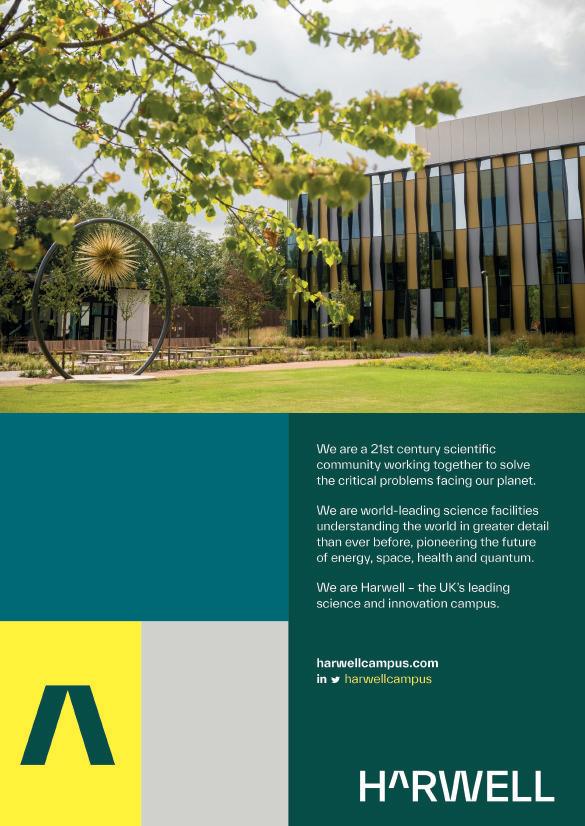
Six months on from Brexit, research from financial adviser Grant Thornton UK revealed that Thames Valley businesses are finding their British origins to be a significant advantage when trading internationally.
In a survey of mid-sized businesses, Grant Thornton found that more than two thirds of those based in Oxfordshire, Berkshire and Northamptonshire believe Brexit has strengthened ‘Brand Britain’. Nearly three-quarters of those surveyed further believe that it is helpful when trading internationally, with only eight per cent disagreeing.
While Brexit posed a level of uncertainty to many businesses at the start of the year, more than three-quarters of those surveyed in the Thames Valley believed that they were well prepared for the impacts felt from Brexit so far. This is notably higher than the UK average of 62 per cent.
But the transition has not come without its challenges. The research identified five key impacts felt from Brexit in the region’s mid-market over the past six months. These are: setting up new overseas operations, VAT compliance issues, uncertainty over product labelling, trade compliance issues and immigration and people mobility.
A firm which supplies medical and vaccine bags is expanding overseas with the opening of a new warehouse in Europe.
Following significant business growth over the last 12-18 months, CorrMed, based in Huntley, Gloucestershire has signed an agreement with Kinesis Medical, a specialist warehousing and fulfilment organisation in the Netherlands.
The company, spearheaded by Managing Director Katie Houghton who has more than 20 years’
experience in the medical sector, has seen sales soar during the pandemic, as demand drastically increased for its infection control products. Since the start of lockdown, CorrMed has supported the healthcare workforce across the country as unprecedented levels of infection resistant supplies were urgently sought. This included providing a huge stock of its Universal Medical Infection Control bags to the NHS Nightingale Hospitals, as well as donating Mass Incident bags to medical teams in Oxfordshire, where field medics were brought in to help with frontline paramedic teams.

Nearly two thousand new jobs have been created in Coventry and Warwickshire, thanks to investment from foreign companies in the last year.
The figures show that despite a difficult 18 months for many parts of the local and national economy, Coventry and Warwickshire continues to be a leading location for foreign investment.
According to figures from the Department of International Trade, 1,909 new jobs have
been created and 42 jobs safeguarded, with 45 successful foreign direct investments in the area, and a further five shared across multiple areas.
This 10 per cent jump in projects compares well when set against the overall UK figures, which saw a decline of 12 per cent in UK projects over the same period.
Local key sectors were strongly represented, with eight projects from software/ games development and 11 from
Investors included the German-owned Hello Fresh, which has created a new fulfilment centre in Nuneaton, and Lotus Engineering, now wholly owned by Chinese car manufacturer Geely, which has expanded with a new base at Wellesbourne Innovation Campus. BSA/ Classic Legends has established a design and development centre in Coventry, and games developer Electric Square has set up a studio in Leamington Spa.


Gloucester-based Mears Group plc, which provides services to the UK’s housing sector, has reported a return to profit in its latest interim results.
Revenues for the first half of the year were £444 million, up from £397 million in the same period last year and the company returned to profit, reporting a £5.7 million profit.
David Miles, Chief Executive Officer of the Group, said: “The Group has performed well and traded resiliently through another lockdown impacted reporting period.
“The business is in good shape and with the long-term challenges of affordable housing, public health and climate change high on the political agenda at local and central government, we look forward to future growth with confidence.”
With sales of paint and wallpaper rising sharply (up almost a quarter in some areas), thanks to many of us taking the opportunity to redecorate during lockdown, Stroud paint retailer Bailey Paints has been snapped up by South Wales-based Rabart Group.
The Rabart Group is a family-run business with ten other trade and commercial sales centres across South Wales and the South West.
The acquisition of Bailey Paints is their latest and largest addition, following the opening of a Warminster branch in November 2020.
Bailey Paints currently employs 23 members of staff and operates a shop and paint factory from its site at Thrupp, near Stroud.
The company has manufactured and sold paint in Stroud for more than 130 years and has been owned and managed by Richard Townsend since 1989.
Richard will continue to work alongside the new owners as the group’s Senior Production Manager. The shop and factory will continue to operate under the Bailey Paints name and remain at its Griffin Mill site.
Reading-based Isotropic Systems has secured more than $37 million in additional funding to help launch its unique multi-link antenna in 2022.
Isotropic Systems’ patented radio frequency optics technology enables the high-performance multi-link antenna to simultaneously connect to multiple satellites in multiple orbits without any compromise in the performance of each link.
John Finney, Isotropic Systems Founder and CEO, said: “The strong interest we have received from across the industry has given us the confidence to bring forward the commercialisation of our new terminals, harnessing the potential of the thousands of new satellites being launched across multiple orbits.”

Oxfordshire psychedelic medicine innovator Beckley Psytech has secured £58 million in funding for its research programmes.
The Series B financing was initially set at $50 million before increasing to $80 million due to overwhelming interest from investors to support the company in broadening and accelerating clinical development of its innovative research pipeline.
Beckley Psytech wants to help patients suffering from neurological and psychiatric disorders by developing a pipeline of psychedelic compounds into licensed pharmaceutical medicines.
Cosmo Feilding Mellen, CEO of Beckley Psytech, said: “My life’s passion has been to unlock the therapeutic potential of psychedelics as I believe these compounds could help millions of people around the world.”
Karshare, the community car-sharing app registered in High Wycombe, and with an office in Bristol has announced a £3 million pre-series A funding round.

Karshare is a personal car sharing provider. It offers a news marketplace enabling car owners to make their vehicle available to people in their community to rent.
Renters can book immediately via the app and access the vehicle straight away, with no need to arrange a time and date to collect keys from the owner. The cars are insured through the service which includes breakdown cover.
In addition to existing investors Fullbrook Thorpe, Adjuvo Syndicate and other angel investors, Karshare revealed a significant investment by Saracens Football Rugby Club owner Nigel Wray.
Nigel said: “Perhaps particularly in today’s age this is logically and environmentally the way things are going. Airbnb started somewhere – and who thought that would be what it is today.”
Karshare, which only launched this year, is available in Bristol and Coventry along with four other UK cities and is looking to expand.
Coventry-based ParentPay, which provides payments systems to the education market in the UK, Netherlands and Germany, has completed its acquisition of Education Software Solutions (ESS) from Montagu Private Equity.
The deal, completed after the merger was approved by the Competition and Markets Authority, makes ParentPay the UK’s largest education technology business.
Private equity company Montagu acquired ESS from Capita at the beginning of
this year, with the intention of merging the business with ParentPay once the CMA had given its approval. Following the merger, Montagu will maintain its investment in the enlarged ParentPay Group
ParentPay started the cashless payment revolution in schools in 2004.
It has since simplified the lives of millions of parents and streamlined the payment operations of thousands of schools by removing cash from the classroom.

Veloci-tech has been created by Danielle Cole, MD of Cole Accounting. Over the last 11 years, Danielle has experienced first-hand the challenges a business owner faces, including often feeling overwhelmed.

Working with external business consultant Paul Holmes , MD of PCH Business Consultants to overcome these challenges, has led to double revenue, generate significant profit, and reduced working days in the business. Now Danielle has teamed up with Paul and Gordon Petrie, MD of Indesosa, to create a true business support process for Veloci-tech’s clients.
The team have extensive experience in Corporate and SME Businesses across a wide range of sectors, as well as support from a full range of specialism experts. Together the team are able to offer advice and guidance, but also help cut through the chaos and actually get things done.

Many scaling business owners realise too late, that they have made themselves so pivotal to the running of the business, that it can’t run without them. As they grow rapidly, they then become overwhelmed, make decisions which cost the business money, and then lack of cashflow often kills it.

Veloci-tech clients have an openness to look at their companies with the right mindset. There isn’t a formal structure applied each time, every business support plan is bespoke in the initial evaluation stage and review. This is where the magic truly happens, where insights, experience and perspective allow a plan to be created. Working backwards from a goal, designing the business to run without the owner(s) operationally is the only way a business can be successful long term.
So often we hear comments like these: “You stopped me in my tracks 4 or 5 times during the conversation, spotted things I hadn’t seen and woke me up to new ways of seeing my business”
Are
“I was drowning in workload and didn’t believe anyone could help me. I have worked with business coaches before and it hasn’t helped, but I was persuaded to have an initial conversation with Veloci-tech and was blown away by how much they helped in just the first conversation and that was before I even agreed to sign up”

Initial evaluation - a first meeting with the team for discussions, insights, and ideas around the business, which may involve a look at the financial position. This helps us decide if and how we can help you. You will come away asking different questions about your business and see there may be more happening than you realise.
Business Review - 3-4 hour session with the team, really getting under the skin of the business. Understanding you, the owner’s dreams and aspirations, planning financially, and discussing business goals moving forward. Identifying what is really happening in the business, what are the challenges, the things to focus on and the things to stop doing or do differently, will form what happens next, leaving you with a clearer understanding of what success looks like for your business and that it is possible!
Bespoke plan, Implementation, and Accountability - The team will create a programme that balances the right input needed for your business, identify any external support needed and map out a prioritised series of action steps towards business success, with agreed goals and outcomes. An accountability process then helps focus you only on the areas of the business that are critical.
Contact the Veloci-Tech team on 01242 371317 or email

Cheltenham-based environmental services company Urbaser Ltd has confirmed the acquisition of J&B Recycling, a waste management company operating in the North East of England.
Urbaser provides waste treatment and municipal services solutions to local authorities, businesses and the general public across the UK.
J&B Recycling also has a significant portfolio of local authority contracts as well as more than 1,600 trade contracts servicing nearly 700 commercial customers within the region.
The acquisition of J&B Recycling provides Urbaser Ltd with a network of four materials recycling and processing facilities, managing more than 180,000 tonnes per annum. Forecasted revenue for the year ended 31 March, 2021 was approximately £20 million.
This latest success follows the acquisition of five waste management contracts from Amey announced earlier this year.
Innovators developing zeroemission tailpipe technology for cars, buses and heavy-duty vehicles have received a major boost from the Advanced Propulsion Centre in Coventry.
The centre awarded a total of up to £1.48 million to medium enterprises to help bring their ideas to life.
Among the winners are D2H Advanced Technologies based in Buckingham, which is developing faster, more flexible simulation to compare battery performance, cut cost and speed up timescales.
Chris Hebert, D2H Advanced Technologies’ Engineering Director, said: “We are absolutely thrilled that the Advanced Propulsion Centre has chosen our pioneering work in battery modelling. Such grant funding, coupled with professional support, will be instrumental in helping us to deliver a market-leading product.”
Two Worcestershire businesses have signed a new three-year IT support contract as part of a 15-year partnership which has helped to expand both firms.
The deal between Kidderminster firms, IT provider Minster Micro Computers, and windows specialist 5 Star Windows and Conservatories will take their partnership to 2024.
Susan Marlow, managing director of Minster Micro Computers said: “5 Star’s IT infrastructure, security and networks have been completely overhauled – which is
especially important as the business moves to more hybrid working as we come out of the Covid-19 pandemic.
“Having two local firms working closely together shows the talent we have in Wyre Forest.”
Richard Manser, managing director of 5 Star Windows and Conservatories, added:

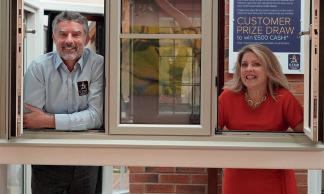
“Susan and the team at Minster Micro have transformed our IT systems and allowed our strong team to be more dynamic in how they work.”
Oxford RF Solutions won funding to further develop its multidirectional radar sensor to enable all-weather situational awareness in autonomous vehicles. And Abingdon-based Sigma Lithium secured funding to develop its 3D metallic Lithium Anode for high performance electric vehicle batteries to deliver a faster charge and greater driving range.
Sigma Chief Executive, Dr Gleb Ivanov, said: “The lithium battery industry is moving away from wet chemistry cells to solid state components. We want Sigma Lithium to be pioneering that transition.”
According to a report in the New Scientist, if you live in a dense city, you’re more likely to be lonely.
The magazine reported that a crack team of researchers at the University of Hong Kong had analysed health data from nearly 406,000 people in 22 UK cities held by the UK Biobank and compared it with detailed data of their environment, such as their proximity to busy roads and green spaces. So it’s good news to hear of two University of Bristol alumni who are
aiming to launch friend-finding app Fethr that links up like-minded strangers.
Fethr was born during the first lockdown when Julian Issa and Miguel Bravo, who met while studying at Bristol, were sharing a London flat. Business analyst Julian had lived in 10 cities in two years, which made it difficult to build friendships.
Researching the topic, he discovered that 45 per cent of adults in England felt lonely at least some of the time.
Stroud Brewery, the independent, organic craft brewer, has launched a hop-tastic beer trilogy with the guru of ethically-produced organic food, Hugh Fearnley-Whittingstall of River Cottage fame.

Keen purveyor of all things organic, Hugh is a huge fan of Stroud Brewery’s unique take on familiar beer styles along with its activist stance towards making the UK beer industry more ethical and sustainable. Hugh saw the Cotswolds brewery as a natural
partner for the #FoodToInspireChange product range he has created to shine a light on independent, organic, ethical sources of food and drink.
The #FoodToInspireChange beer trilogy celebrates the undisputed flavour champion, the humble hop. A key aromatic ingredient for making flavourful beer, hops are difficult to grow organically in the UK with diseases and pests rife in our temperate climate.
Miguel, who studied Mathematics and Philosophy at Bristol, used his background to build a sophisticated algorithm that uses artificial intelligence to match strangers together.
After a successful trial in Sydney, the harmonious app is now in the final stages of development.
It launched in London earlier this year with plans to roll out to other UK cities, including Bristol, by the end of the year.
A jockey who recovered from cancer and went on to win the Grand National has thanked the Swindon-based Wasdell Group for helping his sponsored walk raise £108,000 for cancer research.
Bob Champion was diagnosed with testicular cancer in 1979. He overcame punishing treatment to win the 1981 Grand National on Aldaniti and went on to establish the Bob Champion Cancer Trust which has since raised more than £15 million for the Bob Champion Cancer Research Laboratory.
Forty years on from his famous Grand National win, Bob walked a 191-mile route to raise more funds, representing the 191 days between his initial cancer diagnosis and receiving the all-clear.
The Wasdell Group, which is one of Europe’s largest independent partners to the pharmaceutical industry, was sole sponsor of Bob’s 40th anniversary fundraiser.
Staff at one of the country’s leading recruitment firms are celebrating a £4.3 million shares payout as the company celebrates 60 years in business.
Employees at Warwickshire-based Pertemps, including temporary workers, reaped the rewards after investing in an HMRC-backed share option scheme 10 years ago and a share incentive plan open to employees since 2015.
The fulfilment of the schemes coincided with Pertemps birthday celebrations, which was founded in Birmingham in 1961 by Connie Watts, mother of Lifetime President Tim Watts.
The latest dividend comes after three previous seven-figure payouts in 2018, 2011 and in 1995 from the organisation’s Employee Benefit Trust.
Pertemps Network Group is one of the UK’s largest privately-owned recruitment agencies. Read our interview with Pertemps Chair Carmen Watson on pages 108-110.
A young Redditch couple are turning their dream of a growing business into a reality having opened their first premises.

Lauren Rooney started her sweets and events business after being left housebound for many months by a serious road crash five years ago.
Working with her partner, roofer Sam Bennett, the couple have move their venture, “Live, Laugh and Love With Lauren”, into a unit on the Manorside Industrial Estate in Redditch.
Lauren said: “We are working weekdays at our sweet shop and then putting together 10 or 15 parties every weekend with bouncy castles, football dart games and other entertainments, as well as supplying more sweets as gifts and party favours.
“The events side of the business has exploded since lockdown started easing, but the sweets side of the business kept us going over the last year. We were delivering to more than 100 homes a week around Bromsgrove and Redditch.”



Leisure operator Gateway Attractions has enlisted Oxford construction and renovation company Savvy Group to create a tourism hub in Oxford. It will include new attractions featuring technology and immersive family entertainment in a year-round facility.
The new attractions will be under the Oxford Unwrapped brand and based in
four buildings at Oxford’s Castle Quarter.
The entertainment complex will offer immersive experiences, interactive games and exhibitions for all the family, including use of the latest Virtual Reality (VR) technology to provide an insight into the past, present and future of the city, its hidden gems, and beauty of the wider county.
Recruitment is currently at an all-time high. It’s a candidate’s market out there, and that’s a massive business headache.
With many EU nationals heading home thanks to Brexit and Covid, and more UK workers rethinking their career choices, company bosses are facing serious skills shortages alongside wage inflation, industry poaching and an increased demand from employees wanting to work for companies which demonstrate a strong social conscience.
The World Economic Forum says there will be a global shortage of four million workers by 2024, and the world will need to retrain a billion people, according to Carmen Watson, Chair of Meriden-based recruiters Pertemps.


She said: “The Covid crisis has driven more people to reconsider their job choices as well as where and how they want to work. They are talking to us about changing direction and what they need to qualify for their ideal roles. With technology playing a part in almost every
job, especially as the world has embraced hybrid working, they will often need new skills to cope.”

With recruitment pivotal to the UK’s economic recovery, this situation needs to be addressed urgently and at every level, she said.
“Sectors such as hospitality have long experienced shortages,” she continued. “There are currently around 120,000 such vacancies across the UK. Agriculture is facing problems too. Vegetable pickers are being offered £20 per hour and farmers still can’t fill their vacancies.”
“To find people for these jobs, we have to be innovative and creative. How do we get vegetable pickers to the rural areas where they’re needed and support them when they’re there? What do we need to put in place to make sure they are available for those shifts?”
After our interview, transport hit the headlines after the UK’s petrol pumps ran dry thanks to a shortage of lorry drivers.
successful career
Carmen is no stranger to personal challenges. In 1972 she left college with a clutch of secretarial certificates. The 16-year old Carmen would probably have considered absurd the notion of her rising to lead the Board of a billion-pound business.
But that’s what happened. She became chair of Pertemps in 2012, having joined as a secretary 40 years previously. In 2014 she was voted one of the most powerful females in recruitment, one of many top industry accolades she’s received over the years.
Pertemps currently turns over more than £680 million annually and, together with its fellow network group of companies, is approaching one billion.
Despite her rise to the top, Carmen has kept her finger on the pulse. She has been

recognised by Staffing Industry Analysts for the last four years as one of the most powerful female leaders in recruitment. In 2018 she was voted overall Director of the Year by IOD Midlands and received a life-time achievement award from the Recruitment & Employment Federation in the same year. Carmen is a member of the Executive Leadership Team for Race for Opportunity, part of BITC, and is a strong advocate for diversity and inclusion in the workplace. She is also a Trustee and Chair of the Women in Business Group of the Lord Mayor of Birmingham’s charity, which supports small but vital charities.
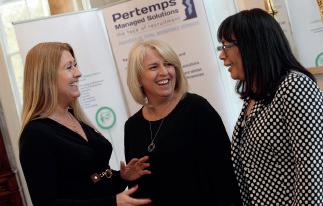

Now 65, Carmen was born in Wolverhampton to a white British mother and West Indian father. When she was three her father left, leaving her mother (who has been her greatest mentor), to bring her up.
Against her head teacher’s advice, Carmen left school early to train as a secretary at a local college, because “that’s what girls did then.”
Armed with her certificates, she visited the local Pertemps recruitment agency.

“They sent me for an interview at a local manufacturing company which made towing ball brackets for cars. The boss who interviewed me said he would love to offer me the job because I was an absolute fireball, but he felt I wouldn’t fit in.”
Not to put too fine a point on it, the Wolverhampton of the 1970s was a lot less racially diverse than now, and the people in her office were male, middle-aged and white.
“I was the other end of their age range, with platform heels, big hair and a big personality. But they did offer me the job and ultimately I formed lifelong friendships with many of them.”
She was astute enough even then to know she needed to pull it out of the bag to establish herself. It wasn’t enough to work hard, she needed to be credible.
“I also had to encourage my colleagues to


talk to me if they had an issue, as I was the first of my type to work there.”
Carmen stayed for three years, only returning to Pertemps when she was ready to further her career. The recruitment company clearly knew a good thing when they saw it and offered her a job as secretary to Pertemps’ technical director.
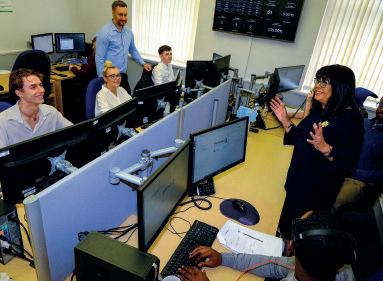
Here she discovered her true talent: people.
“In my job I talked to people across the community; to the men who were the breadwinners in those days and to local businesses. I discovered a knack in putting them together.”
Despite being a secretary, Carmen was soon billing more than some of the consultants. By the late 1970s, Pertemps was backing her in studying for professional qualifications.
At the age of 30 she joined the Board, later becoming managing director and finally Chair in 2012.
Pertemps is a family business. “The company was founded by Connie Watts, whom I was lucky to work with,” said Carmen. “Her son Tim continued to run it as a family business. He’s now our lifetime president.”
The strong family culture remains. “Our staff have a vested interested in the business. Everyone, provided they have done a sixmonth qualifying period, can buy shares which we match. For some staff members, we are talking life-changing sums of money when they cash in their shares. And the rules are the same for everyone.”
But a dogged pursuit of money isn’t what makes the business successful, said Carmen.
“Fundamentally business comes down to doing it for the money or doing right for your people. We do it for our people and guess what, the more we do, the more the money comes,” said Carmen.
However, Carmen is honest about the challenges she’s faced with the young
people she regularly mentors, sharing how hard she worked to achieve success.
“I can’t tell them what to do. They must take control over their own career and future. My job is to help people rise as I did, by taking control themselves.
“Attitude is the number one priority, and that’s not changed,” she added. “We have a thorough recruitment process, but we treat people with equity.
Equity? I thought it was all about equality. Carmen explained: “Equality is about treating people the same. Equity is about being fair and flexible enough to deal with every individual to get the best results.”
And her advice to employers looking for the best candidates?
“Accept that employee engagement starts way before someone puts in an application. Your website is your shop window, as is Glassdoor and LinkedIn.
“Purpose and values are increasingly important. Does your company’s job advertisement mirror your social commitment? What benefits can you offer? So many employers miss that out.
“Are organisations gender decoding? Are candidates seeing people that look like them? The language is important. Where is your business losing people and why?
“Mine the data – it may tell you something you don’t know.”
Everyone has a spark of genius in them, Carmen said. “Our role is to find out what that spark is. Yes, there are some people we can’t help so we put them in touch with those better qualified to do it.
But for those candidates with the right attitude who are prepared to put the work in, we will match them with the right company.” And British business will be the winner.
“Equality is about treating people the same. Equity is about being fair and flexible enough to deal with every individual to get the best results.







The Bessemer Society, forum for ‘serial’ CEOs, founders and entrepreneurs committed to creating successful new companies based on technological innovation in science and technology, hosted its autumn dinner at Worcester College in Oxford, bringing together investors and the battery community for dinner with investor sessions. Investors enjoyed active engagement with the industry with short pitches, and keynote talks from Hannah Boardman, Head of Automotive at Department for Business, Energy and Industrial Strategy, Christian Günther, CEO, Johnson Matthey, and Dr Graham Hoare, President, Global Operations, Britishvolt Ltd



Photography: Rob Lacey

David Williams has been appointed Commercial Director at Harwell Science and Innovation campus in Oxfordshire. Previously at commercial property agents Bidwells, David is now helping to fast track the delivery of Harwell’s five million sq ft masterplan.
West Oxfordshire specialist grid consultant Roadnight Taylor has appointed Pete Aston as Network Engineer. Previously at Western Power Distribution, Pete is deploying his 20-year experience to help clients gain grid connections for low carbon technology projects.

Top regional law firm Harrison Clark Rickerbys, which completed its merger with 176-year old firm Hewitsons, in June, has appointed a new senior partner. After 32 years with the firm, senior partner Richard Knight has passed the baton to Dawn Oliver, who has been with the firm for 24 years.

Gloucestershire
appoints
Gloucestershire’s Local Enterprise Partnership, GFirst LEP, has appointed Ruth Dooley as its new Chair.
Ruth Dooley is a partner and head of the litigation support team at Gloucestershire accountants Hazlewoods LLP.

Prime appoints former St. Modwen man as Director of Construction
Worcester property company Prime has appointed Richard Powell as Director of Construction Strategy. Richard’s experience was gained at Hall and Tawse, Bovis Lendlease and Skanska where he was responsible for the management of the £350 million Royal Derby Hospital.

The UK Innovation and Science Seed Fund has appointed Dr Andrew Mackintosh as Chair of its Advisory Board. Dr Mackintosh was a former CEO of Oxford Instruments before establishing the Royal Society Enterprise Fund, a pioneering initiative bringing together scientific expertise and earlystage investment.

07 Engineer appointed New Chair of the West of England LEP
Richard Bonner has been appointed as the new Chair of the West of England Local Enterprise Partnership. Richard is UK Chief Operating Officer and Bristol City Executive at Arcadis. A chartered civil engineer, he has a background in design and consultancy in the building sector with public and private sector clients


10
Leighton charged up to take over new role at Indra
EV charging company Indra, based in Malvern, has appointed Leighton King at its first Chief Commercial Officer. Having previously held senior positions at Aston Martin, in his most recent role as commercial director at LEVC, Leighton launched its range of electric commercial vehicles.

BGF, the UK’s most active growth capital investor, has appointed Elena Kovalikhina as an investor. Elena joins from Rothschild & Co. She started her career at KPMG where she was elected to be part of the “Focus 100”–a talent programme for the top 100 performing individuals.

08
Kidderminster creative agency secures top director hire
Scott Horsfield, former Head of Film at Media Zoo, has joined Kidderminsterheadquartered creative communications agency DRPG to lead its 40-strong Film Team. Scott is an award-winning director and producer of large-scale productions for brand, communications, marketing and sports.
09 Oxford University Innovation veteran becomes COO

Oxford University Innovation’s longest serving employee has become its Chief Operating Officer. Dr Mairi Gibbs, formerly Head of Operations at Oxford University Innovation, joined OUI in 2002. Mairi trained as a chemist, studying biosynthesis during her PhD at Bristol after graduating from Oxford.

NK Media Ltd, the company behind this successful Business & Innovation Magazine, has appointed Mark Saunders as managing director. Mark was previously Group Marketing Director for more than a decade at Stonehousebased comms business 9 Group.

Applications for the graduate entry medical school have already opened for next September.
Having secured permission from the General Medical Council, the Three Counties Medical School (TCMS) will be part of a new wave of medical schools in the UK aiming to widen access to careers in medicine.
The new medical school at Worcester will make a major contribution to tackling the shortage of doctors in Gloucestershire, Herefordshire, Worcestershire and beyond.

Unlike the majority of university courses, medicine and dentistry have tightly restricted entry numbers, determined by Government.
The total number of applications to study medicine at UK universities for entry in 2021 was 28,690, an increase of 21 per cent compared to applications in 2020.
This follows government recognition of the country’s urgent need for more doctors and dentists and agreement to fund additional places.
Professor David Green CBE DL, the University of Worcester’s Vice-Chancellor and Chief Executive, said: “Creating the
Three Counties Medical School to serve the people of this region and beyond is a major investment. There is a serious shortage of doctors in many rural areas as well as in acute hospitals.
“The latest official workforce forecasts predict that the shortage of health personnel is going to balloon to 170,000 by 2027, which is just when doctors educated at the Three Counties Medical School should start coming on stream.
Professor Green’s team has been working to create the foundations for a medical school to serve the region for more than four years.
“The General Medical Council rightly scrutinise the training of medical doctors with laser precision,” he said.
“We are delighted that we passed their tests and can now select and admit our first student cohort.
“We will do our best to ensure that welleducated doctors graduate in sufficient numbers over the years ahead to turn the shortages of medical staff in the region into history.”
The University of Worcester already educates nurses, midwives and other health professionals. Last year it received
the largest allocation of additional places for health professional students in the UK. The university is now educating an additional 478 nurses, midwives, paramedics, physiotherapists and occupational therapists.
Building work to transform the former Worcester News building and print factory into a new Centre for Health and Medical Education is well under way.
Simon Trickett, Chief Executive of the Integrated Care System and Herefordshire and Worcestershire Clinical Commissioning Group, said: “This is a huge development for our local health and care system.
“The Medical School is a development that we have supported right from the beginning because it was clear what a huge contribution it could make to further improving the recruitment of doctors right across our services.”
The newly appointed Founding Dean of the Three Counties Medical School is Professor Sandra Nicholson.
Professor Nicholson, a GP, is the national chair of the Association for the Study of Medical Education and is Professor of Medical Education at Barts and the London School of Dentistry and Medicine.
The University of Worcester is to be the home of a new medical school serving the three counties of Gloucestershire, Herefordshire and Worcestershire
The construction industry will need 216,800 new workers by 2025 to meet demand, according to the Construction Industry Training Board (CITB).

Most English regions will experience an increase in construction workers by 2025, with The Midlands forecast to lead demand.

Major projects such as HS2 are driving growth in some regions, and infrastructure and private housing should see the healthiest pace of expansion by 2025.
So where will these newly trained construction workers come from?
Many colleges around the region are now investing heavily in construction training.

In Bicester, the first cohort of apprentices have started at a new Construction Skills Centre in the town.
Launched as part of Abingdon & Witney College’s apprenticeship programme, the facility enables apprentices to train for the fast-growing property maintenance sector, alongside professional skills in plumbing, gas engineering, electrical installation, carpentry and joinery trades.
In the Forest of Dean, work is already under way on the development of a new construction training centre.
Called, AccXel, the new Construction Skills Accelerator Centre, is co-funded by family construction firm KW Bell Group and the government, which has invested £2 million. The centre recently announced that it had joined forces with leadership development company QuoLux to create Skill STEPS, a new programme which defines a pathway for individuals entering or progressing through the construction industry.
Located in Cinderford, the £3 million AccXel training centre will welcome its first students in January.

Another new construction training centre has already opened in Bristol. Regeneration specialist Vistry Partnerships has been announced as the headline sponsor of City of Bristol College’s new £9 million Advanced Construction Skills Centre.
The new centre at the College’s South Bristol Skills Academy, near Hengrove Park, opened its doors to students this September and the new sponsorship deal will see a key construction employer
working alongside students and apprentices.
The £9 million project has been partfunded by the West of England Combined Authority’s Local Enterprise Partnership, and is the latest addition to the new development plan for the area – with new houses and facilities planned for Hengrove Park.
The centre will enable students to work with key employers on-site. During the planning and construction of the centre, the college worked with employers to ensure it delivered the skills needed in the fast-paced industry as well as providing hundreds of learners with knowledge in a range of disciplines.
The three-year sponsorship agreement will see Vistry Partnerships work with the college to provide additional opportunities for students at the college.
The college is introducing new courses and topics, such as retro fit-out, to support developments in sustainable construction techniques.
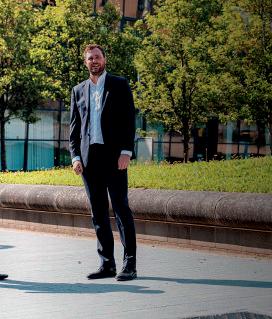
“Many colleges around the region are now investing heavily in construction training”
A consortium consisting of Johnson Matthey, the Faraday Institution, Britishvolt, the University of Oxford, UK Battery Industrialisation Centre (UKBIC), Emerson & Renwick and The University of Warwick is aiming to develop world-leading prototype solid-state batteries (SSBs).
Solid-state batteries could offer significant advantages over conventional lithiumion and could speed up the UK meeting its net zero commitments through the electrification of transport.

However, there are scientific challenges that need to be addressed before high power SSBs can be sold commercially.
It is hoped that the collaboration will be able to achieve the production of cells using scalable manufacturing techniques. The preliminary design for a prototyping facility has been developed and sources of funding are currently being sought.
As well as increasing energy density, lifetime and transforming safety, SSBs would boost the driving range and


longevity of electric vehicles. If SSBs could be realised and used in UK-manufactured EVs they would help secure the long-term growth of the UK’s car industry.
Early deployment of SSBs is likely to be in consumer electronics, niche automotive applications and unmanned aerospace, before being used in broader EV markets.
The Didcot-based Faraday Institution, which undertakes electrochemical energy storage research and development, forecasts that in 2030, SSBs are likely to take a seven per cent share of the global consumer electronics battery market and a four per cent share of the EV battery market.
Professor Peter Bruce leads The Faraday Institution’s SOLBAT project, which has been addressing the challenges of manufacturing SSBs for three years.
He said: “I’m proud that the work of the SOLBAT project, led by Oxford University, will make a significant contribution to the UK’s green energy revolution.”
Ian Whiting, Commercial Director at Coventry-based UKBIC added: “We’re scaling technologies that will be the core products of the UK’s emergent Gigafactories. But we need to think even further ahead and solid-state battery technology is going to be a big part of that.”
David Greenwood, Professor of Advanced Propulsion Systems, and CEO of WMG High Value Manufacturing Catapult, said: “There remains huge opportunity for innovation in this space, and this initiative will provide the route for the UK to fast-track candidate technologies to industrialisation.”
A consortium of seven UK organisations is aiming to develop world-leading prototype solid-state battery technology
“I’m proud that the work of the SOLBAT project, led by the University of Oxford, will make a significant contribution to the UK’s green energy revolution”
Technology developed by Malvern-based ChangeMaker 3D and graphene innovator Versarien in Cheltenham will help the UK’s HS2 high speed rail pioneer 3D concrete printing on site to help cut carbon on the project by up to 50 per cent.

The technology, called ‘Printfrastructure’, will be deployed by HS2 Ltd’s London tunnels contractor in a move that represents a major step forward in construction technology.
Printing concrete with computer operated robots will enable HS2 to make structures on site instead of transporting pre-cast slabs by road before being assembled and
lowered into place by large cranes. 3D concrete printing also enables the technique to be deployed in physicallyrestricted areas – avoiding the need to develop complicated and potentially expensive logistical plans.
ChangeMaker 3D Director Natalie Wadley, said: “ChangeMaker 3D stands for sustainability in the built environment.
“Our Printfrastructure innovation project with SCS JV, HS2 Ltd’s London tunnels contract is a UK first for this technology, and together with brilliant project partners, we are proud to support the rail sector to unlock lower carbon construction.”
Jaguar Land Rover is to supply electric vehicles to transport world leaders and delegates during the five day COP26 conference in November.
Jaguar Land Rover will be providing a fleet of electric vehicles to world leaders and delegates attending the summit, including the multi awardwinning all-electric performance SUV Jaguar I-PACE, as leaders and their teams travel to and from the venue.
As part of its new global strategy
Reimagine, Jaguar Land Rover aims to achieve zero tailpipe emissions by 2036, and net zero carbon emissions across its supply chain, products and operations by 2039.
The Jaguar I-PACE has won countless awards since it was launched in 2018, and is still widely considered to be the best premium electric SUV currently on sale, with a starting price of around £65,000.
The automotive company has a successful history in similar events including the recent G7 summit in the UK. The vehicles have all been sourced from existing fleets in the UK, helping to ensure the carbon footprint remains low.
Advanced Insulation, the award-winning Gloucester manufacturer of insulation, passive fire protection, buoyancy and cable protection systems, has revealed a new name to better reflect its increasingly diverse product offering.
The company will now be known as Advanced Innergy Solutions (AIS) to highlight the innovative nature of
its products for the energy sector.
The company is also incorporating the new company name into its recent acquisitions, adding AIS to Covertherm, Manuplas and Bardot.
Over the last few years, AIS has broadened its products and services beyond insulation. Bringing together
all products and solutions under one corporate name Advanced Innergy Solutions, will make it easier to showcase all solutions and products under one umbrella brand.
In the last three years, AIS has significantly increased its market share in new energy markets – offshore wind and more recently automotive

Bristol and Warwick universities are among the recipients of £53 million in government funding for five new digital manufacturing research centres to drive the development of the latest digital manufacturing technologies.
The funding has been awarded though the national Made Smarter programme, a collaboration between government and industry designed to support the
development and increase the use of these emerging technologies.
Adoption of the latest data-driven innovations, such as use of AI and blockchain in supply chains, or advanced robotics and smart machines in manufacturing, will help manufacturers increase productivity, become more sustainable and recover from the pandemic.
More than one million of the iconic Mini cars have been sold in the UK, just over 20 years since the start of modern Mini production began in Cowley, Oxford in 2001.
Mini has sold more than 5.1 million cars globally in the past two decades, and the UK is the brand’s largest market.


Dowty Propellers, the Gloucester-based composite propeller system manufacturer, has completed its largest propeller research and development programme.
Dowty led the four-year Digital Propulsion research and development programme in collaboration with three of the UK’s High Value Manufacturing Catapult centres.
The £20 million project, part-funded by the UK government, sought to innovate every aspect of the design, manufacture and testing of its propeller systems.
Dowty has been researching how to evolve its blade composite manufacturing processes to deliver higher strength and lighter weight.
Dowty Propellers collaborated with three UK innovation centres on the DigiProp project.
These included the National Composites Centre in Bristol, The Manufacturing Technology Centre in Coventry and The University of Sheffield’s Advanced Manufacturing Research Centre.
With the lack of delivery drivers reaching pandemic levels, high street retailer Wilko is making a major investment in the leading autonomous delivery company, StreetDrone.
The £3 million investment, which is part of a wider multi-million-pound pre-series A round, will enable Oxford-based StreetDrone to accelerate the development of its autonomous delivery vehicle and systems.
StreetDrone is aiming to deploy driverless delivery vehicles on the UK’s roads by the end of 2023 and is working with vehicle safety agencies on defining the standards by which these technologies will be allowed to operate on public roads.
David George, Director of Mini UK, said: “To have sold over one million Minis in just 20 years is a remarkable milestone. We are all extremely proud. This achievement is testament to the fantastic cars we’ve built and launched during that time, our customers’ continued love for Mini, and the strength and unwavering dedication of our retail network.
“As we see the increasing demand for our Mini Electric and Mini Countryman Plug-In Hybrid models, which account for nearly a fifth of global electrified sales, we’re excited to see what the next 20 years hold, as we transition into our fully electric future.”
Mini will launch its last model with an internal combustion engine in 2025 and, by 2027, the share of all-electric vehicles in global Mini sales will be at least 50 per cent. In the early 2030s, Mini will be the first BMW Group brand to go fully electric.
In August BMW UK in Oxford, which makes the iconic Mini, announced it had been awarded £26.2 million to develop an electric battery that will rival the driving range of internal combustion engines.
A booming, UK-wide hydrogen economy could be worth £900 million and create more than 9,000 high-quality jobs by 2030, potentially rising to 100,000 jobs and £13 billion by 2050 says the government.

By 2030, hydrogen could help polluting, energy-intensive industries like chemicals, oil refineries, power and heavy transport like shipping, HGV lorries and trains move away from fossil fuels.
These are big numbers. But the government thinks that around 20-35 per cent of the UK’s energy consumption by 2050 could be hydrogen-based, cutting emissions by 78 per cent by 2035.
In August, Business and Energy Secretary Kwasi Kwarteng launched the government’s first Hydrogen Strategy.
He said: “Our strategy positions the UK as first in the global race to ramp up hydrogen technology and seize the thousands of jobs and private investment that come with it.”
The government’s approach is based on the UK’s previous success with offshore wind, where early government action coupled with strong private sector backing saw turnover from wind energy reach nearly £6 billion in 2019.
The UK now has the largest offshore wind farm in the world, off the coast of Yorkshire, and employment in offshore wind in the UK has increased to 7,200 full-time equivalent employees in 2019.
According to the National Grid, 2020 was the "greenest year on record" for Britain, with record high levels of wind energy generation, but the lack of wind in September revealed that the UK urgently needs to further diversify its energy supply.
One of the main tools used by government to support the establishment of offshore wind in the UK was its Contracts for Difference (CfD) scheme.
This incentivises investment in renewable energy by providing developers with protection from volatile wholesale prices, and protects consumers from paying increased support costs when electricity prices are high.
The government is looking at doing the same for hydrogen, to overcome the cost gap between low carbon hydrogen and fossil fuels.
The strategy has been welcomed by companies already investing in hydrogen development.


Baxi Heating, based in Warwick, is developing a hydrogen boiler. It won the innovation category at the Gas Industry Awards this summer.
Jeff House, Baxi’s Head of External Affairs, said: “The way in which we heat and provide hot water to our homes and businesses will change, and we are developing technologies that will support this transition. A bold and pragmatic policy framework will encourage investment and drive change and we welcome the government’s Hydrogen Strategy.”
He added: “We believe there is no “one size fits all” solution, and a whole range of heating technologies will need to be deployed for a range of properties. Baxi Heating, as part of BDR Thermea Group, is developing a ground-breaking hydrogen boiler.

“Our work with the Hy4Heat project and associated demonstration sites in the UK show technical feasibility of this solution. We believe the government should act upon advice from the Climate Change Committee and other sources advocating that all boiler sales from 2025 should be hydrogen-ready to help pre-populate a swathe of the housing stock ready for a future conversion.”

Tens of thousands of jobs and billions of pounds in investment and export opportunities could be unlocked by developing a low carbon hydrogen sector in the UK, according to the government
Green entrepreneur Jo Bamford and heir to the Midlands construction equipment company JCB, has joined forces with multi-family office Vedra Partners to launch HYCAP, a hydrogen investment fund which has set its sights on raising £1 billion.
In 2019, Mr Bamford took over the reins of Wrightbus in Northern Ireland after rescuing the company from administration. It has been transformed into one of the world’s most prominent bus manufacturers.
Earlier this year it launched the world’s first double deck hydrogen bus – The Hydroliner was officially launched into operation in Aberdeen with First Group, Scotland’s largest bus operator.
The investment fund’s capital, which already stands at more than £200 million after the first round of investment, will be injected largely into UK businesses, with the focus on speeding-up green hydrogen production and supply, creating jobs and contributing to the government’s net zero targets.
Mr Bamford said: “The UK has missed the boat on batteries, a sector dominated by China and the Far East, but we can be global leaders in the production and supply of hydrogen – an economy said to be worth $2.5 trillion in revenues by 2050.”

Mr Bamford said his team had already identified more than 40 firms in the hydrogen space which will be evaluated for investment.
Last year, the first hydrogen-powered train ran on the UK’s mainline.
The train, known as HydroFLEX, follows almost two years’ development work and more than £1 million of investment by the University of Birmingham and Porterbrook, and a £750,000 grant from the Department for Transport.


Unlike diesel trains, hydrogen-powered trains do not emit harmful gases, instead using hydrogen and oxygen to produce electricity, water and heat. The new technology behind the trains will also be available by 2023 to retrofit current in-service trains to hydrogen helping decarbonise the rail network and make rail journeys greener and more efficient.
In partnership with Network Rail, Porterbrook is taking a new version of the HydroFLEX to Glasgow in November for COP26. This represents a £7 million investment by Midlands-based Porterbrook and is designed to showcase the best of British engineering and innovation to COP delegates from around the world.
Johnson Matthey is a global leader in sustainable technologies and manufactures membrane electrode assemblies for hydrogen fuel cells in Swindon.

Its fuel cells business, as part of leading European consortium GAIA, recently helped deliver a 20 per cent increase in fuel cell power density versus state-of-the-art technology. This result marks a significant step forward for fuel cell technology and Johnson Matthey’s net zero aspirations.
The company also recently established a Green Hydrogen business colocated in Swindon, taking advantage of the manufacturing expertise already based there. This business develops
and manufactures similar components for water electrolyser systems and expects commercial sales in 2022.


To meet this target, in July the company bought the assets and intellectual property of Abingdonbased Oxis Energy, which entered administration in May 2021.
Oxis Energy was a lithium-sulfur battery developer with assets which can be adapted for the manufacture of components for green hydrogen production. Johnson Matthey says this acquisition will enable it to further expand its UK manufacturing capability and provide components enabling hundreds of megawatts of additional electrolysis capacity from early 2022.

The Active Building Centre’s aim is to revolutionise the way in which building are powered and heated, to accelerate the UK’s drive towards Net Zero Carbon.
We are a centre of excellence whose mission is to promote improved understanding and increased commercialisation of low carbon construction and renewable electricity generation, storage and distribution.
We investigate and deploy solutions to efficiently move energy within and between buildings and develop cutting-edge technologies to intelligently integrate these into networks and the wider grid.
The Active Building Centre (ABC) is a government funded organisation, with bases in Gloucestershire and Wales, aimed at transforming construction in the UK.
From working with academia, government departments, local authorities and developers, ABC is helping to map the route to making low carbon buildings a reality in the UK. Based on the Gloucestershire Science and Technology Park, at Berkeley, Active Building Centre has its roots deep in research at Swansea University, in sustainable construction for the future. Active Building Centre are already working on a carbon neutral homes project with Nationwide in Swindon and the centre’s vision is to transform the UK construction and energy sectors-contributing to more efficient energy use and decarbonisation.

Gloucestershire is getting its very own version of the international climate summit COP26. The event titled, Climate Gloucestershire will be held at Gloucestershire Science and Technology Park at Berkeley on Thursday 21st October
The COP26 climate change summit in Scotland, will be a landmark moment this autumn, but the conversation cannot start and end there. Hosted by the Active Building Centre, this event is an opportunity for businesses keen to develop their net zero journey.
Hosted by broadcaster Robert Llewellyn – creator of the clean energy and electric vehicle channel Fully Charged – COP Gloucestershire will consider how to transform construction to create greener buildings and some of the biggest issues facing policymakers grappling with these challenges.
The conference will discuss issues ranging from leadership on the green agenda, the role of the public sector in reaching net zero, to the need for green skills, and how the UK’s construction industry needs to adapt or wither.
The Active Building Centre’s vision is to transform the UK construction and energy sectors through the deployment of Active Buildings contributing to more efficient energy use and decarbonisation.
The Warwick and London-based all-inclusive electric vehicle (EV) subscription service Onto has raised around £175 million to transform the traditional car ownership model.
The investment comes as the sustainable mobility business, which enables customers to access an electric car on a subscription basis without huge deposits or a long-term
A North Wiltshire entrepreneur has received start-up loan funding via SWIG (South West Investment Group) Finance to launch his new sustainable food brand, BiJimini Spices.
Luke Craven will use the £21,000 loan to set up supply chains and cover initial manufacturing costs.
Designed to help tackle the harmful environmental impact of industrial meat production, BiJimini Spices uses cricket powder as a supplement to provide nutritional as well as environmental benefits.

In comparison to beef production, crickets produce almost negligible carbon emissions compared to those produced by a cow. In terms of nutritional benefits, high-protein crickets also contain all nine essential amino acids and are abundant in minerals.
Apparently, more than two billion people around the world already eat crickets, mostly in Africa, Asia and South America. And they are becoming more popular in Europe.
commitment, embarks on the next phase of its rapid growth.
Last year Onto launched Onto for Business, providing companies with a car subscription for employees.
With zero emission cars exempt from Benefit-In-Kind tax, employer and employee can capitalise on tax savings.
Avonmouth company OCO Technology has reprocessed half a million tonnes of air pollution control residue from the energy from waste sector.
Across all three of its UK operations, OCO has now captured nearly 50,000 tonnes of carbon dioxide, transforming it into a carbon negative aggregate which is playing a key part in the sustainable buildings of the future.
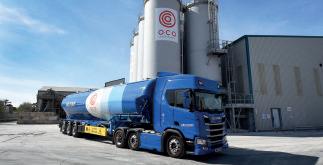
The figure marks another feather in the cap for the carbon capture specialist, which increased its turnover by £4 million
during the last year, up to more than £20 million, and has seen further expansion and investment in both the UK and overseas projects.
Stephen Roscoe, OCO’s Technical Director, said: “We are delighted to have passed such an important landmark.
“It might have taken us 10 years to reach 500,000 tonnes, but the carbon capture market is accelerating so fast and with such huge potential, that we expect to break through the 1,000,000 tonnes barrier in less than half that time.”
A Gloucestershire woman has launched her own range of eco cleaning products, Wendy Goes Green, under the Just Primal brand. Wendy Thompson, 58, a former RAF squadron leader, said: “Just Primal means with as little added as possible. My washing powder has three main ingredients. The main brand selling more than 23 million products a year has up to 48 ingredients of which only ten are labelled as a cleaning agent”.
With many of us spending more time in front of a screen during the pandemic than we might want to admit to, the film and TV industry has become an important source of revenue for UK landlords, with TV production spend at an almost record high.
That’s according to property consultancy Knight Frank, which says that the popularity of the TV boxset is good news for UK landlords.
2020 British Film Institute figures reveal a £2.84 billion spend in the UK for film and high-end TV production, despite months of suspended filming due to Covid-19. Most spend came from inward investment and co-production, which reached £2.36 billion, 83 per cent of the entire production spend.
Film industry tax breaks and the weaker pound have boosted activity in recent years, and the growing number of high-end television productions means lengthier shoots and longer tenancies.


Plans announced in August for a £700 million film and TV studio in Broxbourne, Hertfordshire, mean activity will escalate further, and Amazon’s news that it plans to move the production of its multimillion-pound series based on the Lord of the Rings books to the UK from New Zealand is also good news.
“Demand is already through the roof” said Harriet Gore, head of the film and media team at Knight Frank. “The ratio of prospective tenants to available properties is 10 to one and higher in some areas.
“My message to landlords is that if you can furnish your property to a good standard, you can charge a premium of between 20 and 30 per cent compared to the longlet market.”
The number of enquiries and deals agreed from the film and TV industry are on track to be more than a third higher this year than in 2019, Harriet said.

Last December, The University of Reading entered into an agreement with affiliates of Commonwealth Real Estate LP, a film studios investor based in Los Angeles, for a long lease of land at the University’s Thames Valley Science Park campus which will see the development of a major film studios and creative media campus.
The campus will be known as Shinfield Studios and four stages, workshops and offices, granted under a temporary planning application, are due to open this autumn. This will provide approximately 7,500 sq metres of film studio space alongside 7,000 sq metres of workshops.
In May Shinfield Studios applied for planning with Wokingham Borough Council to build a permanent film and TV Studios on the site. This new hub will offer film and television producers 18 new purpose-built sound stages together with workshops, a postproduction cinema, plus a contemporary office environment on a scale to service the
If you’ve binged on Netflix and Amazon Prime in the last 18 months, you’re doing the UK economy a big favour
largest blockbuster productions. The company says that 95,000 sq ft of studios will secure more than £500 million GVA a year to the UK economy.
In Oxfordshire, Rebellion Film Studios is expanding its Didcot site. National property consultancy Carter Jonas secured planning consent on behalf of the studios to expand its film-making capacity into a new 4,673 sq metres facility.
Rebellion is one of Europe’s largest independent cross media studios, producing content across video games, film and TV production as well as comic book and fiction publishing.
Its Didcot film studio will now expand into the former Harmsworth Printing Building at Didcot.


The planning consent allows for the demolition of two existing print buildings and the building of two new ones.
Rebellion Film Studios is one of the first studios to incorporate games, TV and film production to offer opportunities for storytelling across genres and mediums. This considerable expansion of its facilities will enable Rebellion to extend its capabilities further.

Brian Mitchell, Head of Rebellion Film Studios said: “After working on film productions at all the major studios across the UK and Europe, we’ve drawn on that knowledge and incorporated it into the design and development of the Didcot site.”

Nicky Brock, Partner at Carter Jonas in Oxford, added: “After initially acting as land



agent for Rebellion Film Studios’ purchase of the Didcot site several years ago, Carter Jonas is pleased to have achieved planning consent for this important extension. In particular, we are delighted that working closely with the Vale of White Horse District Council in the pre-app and planning application stages, we have been able to avoid pre-commencement conditions, meaning that work can start on site without the delay which usually follows the granting of planning permission.”
Although the film and TV industry suffered widespread disruption due to the pandemic, it has bounced back strongly. The year started with record production spend for the first quarter – but by the end of March production was suspended. Some post-production and VFX were able to continue, but physical production only started to renew from mid-July.
Knight Frank’s Harriet Gore, added: “The pandemic means productions have been delayed or stretched over longer periods of time, which has reduced budgets.


“On top of that, more TV shows are shooting, which means a growing number of tenancies are being agreed on a long-let basis.”

“Demand is through the roof. e ratio of prospective tenants to available properties is 10 to one and higher in some areas. My message to landlords is that if you furnish your property to a good standard, you can charge a premium”CGI of the proposed Shinfield Studios at the Thames Valley Business Park
Property consultancy Bidwells says that demand for office and laboratory space in Oxford has seen intense investor interest over the last two years.
The last six months have seen several significant opportunities brought forward, attracting both overseas capital and domestic funds. This demand brought rents to a new high of £47.50 per square foot in the first half of the year.
The availability rate for laboratories remains tight. In August, just 18,700 sq ft was on the market, driving down the availability rate to 2.2 per cent.
However, the office sector has seen a limited return of space to the market as some companies revisit occupational strategies, while others move to accommodate growth. The regional office availability rose to 9.7 per cent as some
more significant grade A space became available to the market.
Aside from London, Oxford attracted the highest venture capital funding in the UK in the first six months of this year, raising a total of £1.37 billion across 31 fundraising rounds. The most prominent venture capital raising was by Exscientia. The group uses artificial intelligence to speed up the delivery of new drugs.

Family-run construction firm Beard has completed one of the biggest contracts in its history with a major redevelopment at St Hilda’s College, the University of Oxford.
The £20 million Front of College project also represents the largest redevelopment of the college in its history, having been completed to mark its 125th anniversary.
Described as ‘architecturally stunning’ by the College, key aspects of the estate have been altered as part of the project, including the entrance, the street-view and the riverside frontage.
The brief was to provide student accommodation (54 bedrooms), and bring together key college administration functions into one place.
People across the Oxford-Cambridge Arc, and all those with an interest in the area, will be able to contribute to the long-term development of the area, as part of a new government consultation.
A new plan aims to develop the infrastructure and environment across Oxfordshire, Buckinghamshire, Northamptonshire, Bedfordshire and Cambridgeshire. It will be developed by government following engagement with local communities and stakeholders.
This public consultation is the first of three over the next two years.
With the right interventions and investment, local economic forecasts suggest that by 2050 the region could see economic output doubling to more than £200 billion.
Dutch real estate company Kadans has added two further buildings at Abingdon Science Park to its pan-European science park portfolio.
The assets, Monarch House and Penlon House were acquired from two separate private clients.
The buildings sit next to The Science Quadrant, also owned by Kadans.
Monarch House and Penlon House total around 50,000 sq ft. As part of the acquisition, Kadans will be renovating Monarch House and providing new laboratory and office accommodation.
Penlon House is let to world-renowned medical device company Penlon. The company, established in Oxford in 1943, manufactures and exports anaesthesia and other medical products worldwide. It played a critical role in the Covid-19 pandemic response in the manufacturing of emergency ventilators for the NHS.
Take-up in the South West industrial and logistics property market is up 40 per cent on two years ago, defying pandemic challenges say property consultants Alder King.
Its review of the first half of the year reveals total take-up in nine key South West locations increased from 2.09 million sq ft at the half-year point in 2019 to 2.94 million sq ft in this same period this year.
Take-up was strongest in Bristol, Exeter, Gloucester, Plymouth and Truro.
Bristol recorded 1.45 million sq ft of takeup. Gloucester also performed strongly, recording 440,000 sq ft of take-up.
Three Gloucester companies are working on the development of Hartpury University and Hartpury College’s new catering hub.
Vitruvius Management Services is leading the project, with Barnwood Construction as the main contractor and Roberts Limbrick as architects.

Mark Price, MD Vitruvius Management Services, Project Lead, said: “A first-class modern facility, with new technology and sustainable features,
the catering hub will meet the objectives of Hartpury to provide an improved food service and enhanced dining experience for students and staff on campus.
“The 2,347 sq metre two-storey building has been designed as a multi-use space to accommodate a variety of functions, with adaptable teaching spaces to support higher and further education, including providing commercial opportunities for Hartpury to host external seminars and conferences with a bar and café.”
part
regeneration
plans
Adapt wants to build around 218 homes, a mix of market and affordable homes and apartments opposite Cheltenham Spa railway station.
While new businesses such as a brewery, coffee roastery and an electric car workshop and showroom have moved into the southern part of Lansdown Industrial Estate, many of the buildings in the northern part are derelict.
Lansdown Industrial Estate is one of four sites identified by Cheltenham Borough Council in the recently-adopted Cheltenham Plan as suitable for commercial and residential development. The total estate is an estimated 13.3 acres, and the northern section proposed for regeneration is approximately 6.9 acres.
The University of Gloucestershire has revealed the team that will transform Gloucester’s former Debenhams building into a thriving city centre campus.
The tender to drive forward the design of the new city centre campus project has been won by ADP Architecture, a leading architect with extensive experience of the UK Higher Education sector.
ADP Architecture will lead a multidisciplined design team comprising Arup, appointed for structural engineering, mechanical and electrical engineering and sustainability consultancy services, and Hoare Lea, which will provide fire and engineering expertise.
Ridge and Partners have been appointed as project managers and Coreus Group
will be the cost consultants for the project.
The University of Gloucestershire bought the Debenhams building in March.
A major focal point in Gloucester’s King’s Square for 80 years, the new city campus is part of the wider regeneration plans for the King’s Square area, which is currently being transformed by the city council.
An ageing
of Cheltenham will undergo
if
drawn up by developers Adapt Real Estate get the go-ahead.
UK publishing company Hachette UK is relocating 60 of its London-based staff to five new national offices in Bristol, Manchester, Edinburgh and Sheffield.
Those relocating will be from a variety of roles and divisions across the
Supply chain management company Bleckmann Logistics has signed a long-term lease to let the entire space available at Trinity Park, a new industrial development in Swindon completed by Trebor Developments and Hillwood.
The deal adds 80,000 square ft of UK storage capacity for Bleckmann, whose clients include Cheltenhambased Superdry and Solihull-based Gymshark.
Trinity Park was completed earlier this year by Trebor Developments and funding partner Hillwood and offers high quality warehouse and industrial space. The 79,814 sq ft space taken by Bleckmann Logistics combines two units of 42,452 and 37,362 square ft.
publishing group, with the aim of having at least 100 staff relocating by 2022.
Hachette UK has also started recruiting locally. The Bristol office is being headed up by Nick Davies, Managing Director at John Murray Press and the first member
of the Hachette UK Board to be based away from its national office.
Thirteen members of staff are moving into a co-share on Bristol harbour with holiday company and travel publisher, Sawdays.
Mollie’s Diner, a motel, diner and drive-thru concept has opened its second location at Cribbs Causeway in Bristol.
This follows the opening of its first diner at Buckland, on the main road between Swindon and Oxford, in January 2019.
The Bristol Mollie’s opened following a £15 million investment in the property, which has created 60 new jobs.
Mollie’s Motel & Diner was initially launched under the Soho House brand umbrella, but was spun-off as an independent entity last year.

The concept was designed by the Soho House & Co team and is inspired by the classic American diner.
The company is planning more openings across the country.
An assistive devices developer has signed a pre-let agreement for a purpose-built 30,000 sq ft distribution facility at Hartlebury Trading Estate, owned by the Schroder UK Real Estate Fund.
ETAC, which develops ergonomic assistive devices and patient handling
equipment, has agreed a 15-year lease on Hartlebury 30, the biggest new-build project on Worcestershire’s largest commercial estate for two decades.
The company, which is currently based in Halesowen, invited 12-year-old longstanding client Warwick Dumighan to break ground on the project.
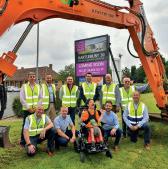 Mollie’s Diner at Cribbs Causeway
Mollie’s Diner at Cribbs Causeway
The region’s most influential B2B magazine, in-print and online for news, features, interviews and business sector analysis.
Published by NK Media Ltd.
2022 Print issues will be published in January, March, May, July, September, November

Regional Coverage: Gloucestershire, Oxfordshire, South Gloucestershire, Bristol, Thames Valley, Swindon, Worcestershire & Hereford, Coventry & Warwickshire

General Enquiries: enquiries@nkmedia.co.uk
Accounts: accounts@nkmedia.co.uk
Magazine Design: Origin Creative | www.origin-creative.com
Magazine Printers: The Manson Group | www.mansongroup.co.uk
Chief Photographer: Rob Lacey | www.roblaceyphotographer.co.uk
Contributing Editor: Ian Mean
Sub Editor: Joyce Matthews


Publisher: NK Media Ltd - Company number 10569394.




Registered Office: McGills, Oakley House, Tetbury Road, Cirencester, Gloucestershire GL7 1US



